




































The Centre for the Promotion of Private Enterprise (CPPE) has commended the Central Bank of Nigeria (CBN) for approving the use of the exchange rate reflected on the import documentation ‘Form M’ at the onset of import transactions for the computation of customs duties exchange rate.
The CPPE, however, asked the central bank to take a step further to peg the customs duty exchange rate at N1,000/$ for the rest of the year.
The Chief Executive Officer
of CPPE, Dr. Muda Yusuf, said yesterday in a public statement that pegging the rate at N1,000 would enable the CBN to fully address the troubling issue of the current prohibitive cost of cargo clearance at the ports, which has gone up by over 40 per cent in the last two months.
Yusuf said: “The CPPE welcomes the decision of the CBN to approve the use of the exchange rate reflected on the import documentation (Form M) at the onset of import transaction. “ This is a laudable response to the grievances of investors in the economy and would reduce
the current uncertainty around imports and related transactions in the economy.
“The high exchange rate for import duty assessment is fuelling the already high inflation, increasing production and operating costs for manufacturers and other businesses, worsening the cost-of-living crisis and putting thousands of maritime sector jobs at risk.
“There is also the added risk of cargo diversion to neighbouring countries and heightened smuggling which could jeopardise the realisation of customs revenue target.”
In the light of this, the CPPE appealed to the CBN to peg the customs duty exchange rate at N1000/$ for the rest of the year in line with the federal government’s commitment to ease the current hardships on the citizens and the burden on businesses.
The current customs duty exchange rate of N1488.9/$, it said, is still too high in the context of the current galloping inflation and difficulties facing businesses and the citizens.
It noted that instances of abandoned cargo are on the increase as a consequence of escalating trade
cost, emphasising that these are not good outcomes for an economy seeking to ensure recovery, drive growth, promote inclusion and guarantee social stability.
He added that businesses are currently grappling with multiple macroeconomic and structural headwinds, which are negatively impacting profitability, competitiveness, job creation, retention of existing jobs and business sustainability.
According to him, pegging the customs duty exchange rate resonates with the present intervention measures to mitigate
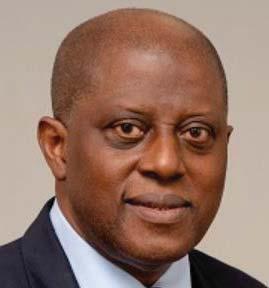
the current hardships in the country.
“Besides, this proposition does not any way detract from the economic reform agenda of the present administration. If anything, it would complement the economic transformation measures because of the expected positive impact on competitiveness, productivity, cost reduction, deceleration of inflation and employment generation,” Yusuf said.
meeting of the organisation’s 164 member governments, directed to make decisions on the multilateral rules underpinning the international trading system. It is the highest-level decision-making body of the WTO, obliged to meet every two years under the Marrakesh Agreement.
The agenda of the conference includes discussions focused on both the environment and inclusivity in trade policy.
Uzoka-Anite said the fact that these issues were on the agenda was a positive step in how the multilateral trading system defined its role in the world.
“Nigeria is dedicated to contributing constructively to discussions that will impact the future of global trade,” she said.
The minister stated that this year’s conference presented a crucial opportunity for Nigeria to participate in negotiations for, among other issues, Special and Differential Treatment (SDT) that developing country members could receive in trade agreements.
She stressed that while Nigeria continued to grapple with the economic fallout of the COVID-19 pandemic and sought
collective solutions for sustainable development, digital trade and food security remained top priorities.
Uzoka-Anite stated, “Our participation at the MC13 paves the way for us to achieve concrete positive outcomes in the WTO agriculture trade reforms negotiations, which we believe should be approached from a food security and livelihood perspective.
“We call for the continued review of the trading rules for agriculture to achieve equitable rules that enhance food security, by providing the necessary policy space for augmenting production and productivity and protecting livelihoods in developing countries, along with diversifying and stabilising the global supply of food products by achieving reductions in inequitable trade-distorting subsidies.
“In this regard, the MC 13 work programme must pave the way for the adoption of decisions on critical food security instruments of public stockholding for Food Security Purposes (PSH), and Special Safeguard Mechanism (SSM) for Developing Countries.
“In addition, it must foster negotiations on modalities to address trade-distorting domestic support, especially with regard to levelling of the playing field.”
The minister said Nigeria prevailed on member countries of WTO to prioritise reforms that would address simultaneously the longstanding development issues on the negotiating agenda of the organisation, together with issues of commercial significance that fostered inclusive growth, created jobs, and widened the circle of prosperity.
She stated that in preparation for MC13, Nigeria had conducted extensive consultations with various stakeholders, including other WTO state members, government agencies, private sector representatives, and civil society organisations.
According to her, these collaborative efforts aim to ensure that Nigeria's positions are reflective of diverse perspectives and contribute to the collective goals of WTO.
Uzoka-Anite also said Nigeria would sustain its advocacy for e-commerce work programme and moratorium to be approached from
a development perspective. This, she said, would enable the country to explore the appropriate policy instruments within the WTO toolbox that could be deployed to foster the development of e-commerce ecosystems in developing countries.
The trade minister said, “We believe that issues regarding the scope and the definition of the moratorium should be taken up post MC13 and clarified so members can understand the scope of their commitment.
“Furthermore, with respect to the moratorium on Imposing Customs Duties on Electronic Transmissions, Nigeria is of the view that it should be extended temporarily.
“Nigeria holds this view for two important reasons. First, the nonrenewal of the moratorium would undermine the predictability of the global e-commerce environment, and this would negatively affect businesses and consumers.
“Next, it will undermine the competitiveness and growth of our MSMEs, who would be unable to access intermediate content at cheaper prices.”
The minister added, “Moreover, another priority for Nigeria at
of workers in Nigeria, NLC, had scheduled a nationwide protest for February 27 and 28.
NLC yesterday accused the federal government of perfecting plans to attack its members that would participate in the scheduled peaceful rallies across the country, barely 24 hours from now.
But the Yoruba social-political organisation, Afenifere, called on the Yoruba, in particular, and Nigerians, in general, not to participate in the nationwide rallies being planned by the union.
Responding at the weekend, the federal government, through the AGF, warned against the planned demonstration, arguing that it is in violation of a court order and would amount to contempt of court. The AGF gave the warning in a letter dated February 23, which was addressed to Falana.
However, Falana in his reply to Fagbemi, dated February 24, argued that there was no order restraining labour from embarking on the February 27 and 28 protest over worsening economic conditions.
The rights activist argued that the threat of the AGF was baseless, since he had withdrawn the contempt proceedings filed against NLC and TUC for embarking on public protest on August 2, 2023.
Falana stated, "We submit, without any fear of contradiction, that the proposed public protest of the NLC is not contemptuous of the two exparte orders of the National Industrial Court (NIC). In particular, the issue of contempt does not arise, as the NLC has challenged the jurisdiction of the NIC to entertain the substantive case.
"It is further submitted that the NIC has not restrained the members
of the NLC from exercising their fundamental rights to freedom of assembly and freedom of expression to protest against the excruciating economic pains being experienced by the masses."
The senior lawyer recalled that following the removal of fuel subsidy by President Bola Tinubu on May 29, 2023, the federal government had commenced negotiations with the two workers’ unions, as the subsidy removal policy had brought untold hardship to Nigerians.
Falana recalled that while the negotiations were in progress, the Federal Ministry of Justice rushed to the NIC to file suit No NICN/ ABJ/158/2023 between Federal Government of Nigeria & Anor. v Nigeria Labour Congress & Anor in respect of the same issues.
He stated, "On June 5, 2023, Justice Yemi Anuwe granted the application of the federal government for an exparte order to restrain the NLC and TUC from embarking on strike against the removal of fuel subsidy. Although both the NLC and TUC complied with the exparte order, they promptly filed an application to set aside same for want of jurisdiction.
"They equally asked for a stay of execution of the order exparte pending the determination of the motion. The application to set aside the exparte order filed by the defendants and the motion for interlocutory injunction filed by the claimants have not been considered, as parties resolved to settle the case out of court.
“Even though the parties signed a 16-point memorandum of understanding, the federal government did not implement all the terms of the agreement. Hence, on August 2, 2023, both NLC and TUC held a peaceful protest throughout
the country."
Falana also pointed out that instead of implementing the agreement the government initiated contempt proceedings against NLC and TUC at the industrial court, whose competence the unions challenged.
He explained, "However, the federal government turned round to withdraw the application for contempt. On November 10, 2023, the federal government filed another suit, No NICN/ABJ/322/20 23 between Federal Government of Nigeria & Anor. at the National Industrial Court against the NLC and TUC, notwithstanding the pendency of suit no NICN/ABJ/158/2 023.
"On that same day, the president court, Justice Benedict Kanyip, granted an ex parte order to restrain the NLC and TUC from embarking on the planned strike. However, His Lordship directed that the case file be transferred to Justice Yemi Anuwe, who is handling a similar labour dispute between the same parties.
"Both NLC and TUC challenged the competence of the fresh suit on the ground that it constitutes a gross abuse of court process, inter alia. The application has not been heard and determined by the NIC."
Falana maintained that having withdrawn the contempt proceedings filed against the NLC and TUC for embarking on public protest on August 2, 2023, Fagbemi ought not to have threatened the NLC with contempt of court over its plan to hold rallies against the astronomical cost of living in the country.
Citing the case of Inspector General of Police v All Nigeria Peoples Party (200 8) 12 WRN 65, Falana observed that the Court of Appeal upheld the fundamental right of Nigerians to protest on matters of public interest
without police permit.
In the lead judgement of the court, Olufunmilayo Adekeye JCA (as she then was) held inter alia, “The right to demonstrate and the right to protest on matters of public concern are rights which are in the public interest and that which individuals must possess, and which they should exercise without impediment as long as no wrongful act is done...
"If as speculated by law enforcement agents that breach of the peace would occur, our criminal code has made adequate provisions for sanctions against breakdown of law and order so that the requirement of permit as a conditionality to holding meetings and rallies can no longer be justified in a democratic society.”
According to Falana, since the freedom of speech and freedom of assembly are part of the democratic rights of every citizen of Nigeria, the Court of Appeal further held that the legislature must guard these rights jealously as they are part of the foundation upon which the government itself rests.
He stated that consequently, the National Assembly had ensured that the right of aggrieved citizens to protest peacefully for or against the government was protected.
Falana said section 83 (4) of the Police Establishment Act 2020, which provided that where a person or organisation notified the police of his or its intention to hold a public meeting, rally or procession on a public highway or such meetings in a place where the public had access to, the police officer responsible for the area shall mobilise personnel to provide security.
He added in the letter, "While we
MC13 is finding an amicable solution to matters relating to Fisheries Subsidies. We welcome the increasing number of ratifications of the MC12 Fisheries Subsidies Agreement (FSA) and encourage members who are yet to conclude this process to expedite action.
“We also welcome the WTO Fisheries Funding Mechanism and call for it to be made easily accessible for developing countries to invest in their fisheries management systems.”
She said the country remained optimistic that MC13 would deliver an SDG14.6 consistent agreement on the outstanding issues, including overcapacity and overfishing (OCOF) that focuses on the most harmful subsidies with effective
special and differential treatment for developing countries that are not responsible for OCOF, and exemption for small players whose share of global marine capture is below 0.8 per cent.
In addition, she said artisanal and small-scale fishing should be excluded from the scope of application of the discipline.
According to her, Nigeria seeks a result-oriented MC13 where ongoing reforms within the multilateral trading system would be adapted to avail developing countries the policy space to support sustainable industrialisation, economic diversification, and structural transformations, including through enhancing domestic production and value addition.
Deji Elumoye in Abuja
Challenged by the stark reality of the current state of the nation, President Bola Tinubu, yesterday, began broad consultations on the troubled economy, with a view to urgently fix things.
The president, who met with private sectors leaders and some governors as a result, immediately set up a Tripartite Economic Advisory Committee with a declaration that his government might though not have the answers to the nation's problems, it couldn't be blamed for not trying.
At the meeting held at the State House, Abuja, the president disclosed that Nigeria's economy was on the verge of recovery for the benefit of downtrodden citizenry, and pledged his government's commitment towards fashioning out the best economic policy for the nation.
A list of critical stakeholders invited to the meeting with the President obtained by THISDAY, included Aliko Dangote, Femi Otedola, Amina Maina (VP NESG), Boye Olusanya (Flour Mills), Segun Ajayi-Kadir (DG MAN), Tony Elumelu, Bismarck Rewane, and Samala Zubairu (AFC).
Others were Innocent Chukwuma (Innoson), Jubril Adewale Tinubu, Governor Soludo of Anambra State, Governor Dapo Abiodun of Ogun State, CBN Governor, Olayemi Cardoso, Kola Adeshina, Abdulkabir Aliu and Abdul Samad Rabiu (BUA)
In his opening remarks, Tinubu said, "We are not saying that we have all the answers. But we will not be blamed for not trying. We assure Nigerians that we will do our best to get our Marshall plan in place and fashion out the best economic future for this country
"We're looking for additional efforts that might help the downtrodden Nigerians and we will provide that hope and reassurance that economic recovery is on its way.
"Let's look at what we're doing right and what we're doing wrong
to bring life back to the economy. Like I said, many times, the people of this country are only the people who we have to please.
“And we are very much concerned from students to mothers and fathers, farmers, the traders and realising that everyone of us will have to fetch water from the same well."
However, speaking with newsmen after the closed-door meeting with the President, President of Dangote Group of Companies, Aliko Dangote, said, "I think we had a very, very good meeting and what we discussed is generally about the economy, food security and security of the nation.
“We discussed everything in detail. And there is the economic presidential Advisory Committee, which has been set up and I think this will look at all the issues and address them, coming from job creation, food security, coming from also reflected the economy.
"So, all these things that have been discussed in detail. I can't give you all the details right now, but we are hopeful and we're a great nation. We have what it takes to turn around the economy and we're going to do that."
On his part, Chairman of BUA Cement, Abdulsamad Rabiu, said, "some of the issues we discussed, for example, like the foreign exchange rate, which we know has always been the problem for the past two or three months.
“We discussed on how to bring the foreign exchange rate down because we all know that what is happening as regards the foreign exchange is artificial, it is manipulative and thank God the CBN is doing quite a lot.
“Now, the exchange rate has come down from N1800 to maybe 1600 and N1500 now, and as you all know, everything in Nigeria is indexed to the foreign exchange, especially when it comes to stuff that we import into the country."
Also speaking, Chairman of Heirs Group, Tony Elumelu,
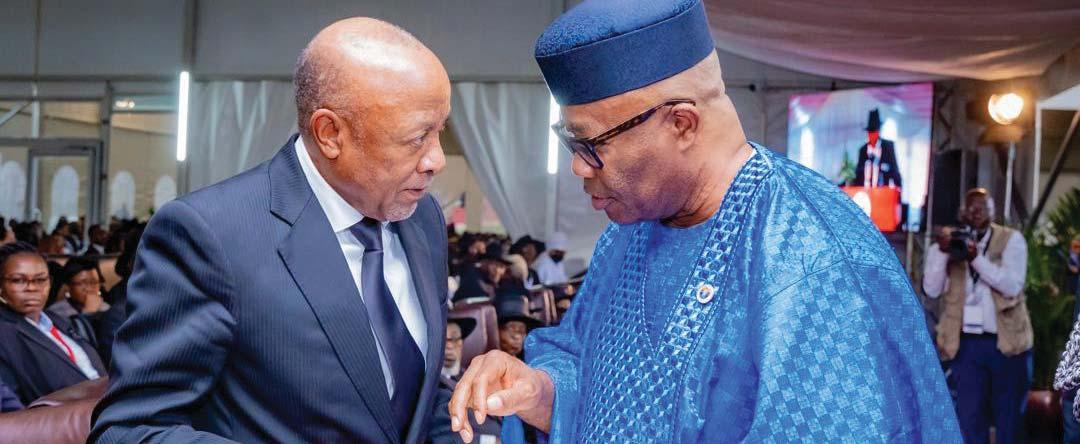
L-R: President of the
Says president has refused to roll up his sleeves, do the job he signed up for Criticises him for not leading by example
Emmanuel Addeh and Chuks Okocha in Abuja
Former Vice President Abubakar
Atiku yesterday urged President Bola Tinubu to learn from his Argentinian counterpart, President Javier Milei, if indeed he is serious about turning around the economic fortunes of Nigeria.
Atiku, a presidential candidate of the Peoples Democratic Party (PDP) in the 2023 presidential poll, said he took a keen interest in reading a recent report by Reuters titled: “Argentina’s Market Double Down on Milei as Investors ‘Start
to Believe’,” because both countries closed the last quarter of 2023 on a similar path of economic downturn.
While in the case of Nigeria, a new government was installed about the middle of 2023, for Argentina, Atiku said the new government came on board in December, with both leaders inheriting a disoriented economy, but applying different measures to recovery.
According to him Milei who inherited a worse condition than Nigeria's is gradually returning his country to a place where investors are ‘starting to believe’, noting that this should serve as a lesson to
Members of the Council of European Union Africa Working Party (COAFR) have arrived in Abuja to begin a four-day working visit to the country, where they are expected to engage with Nigerian authorities, government agencies, civil society groups, regional and international organisations and private sector actors in Abuja and in Lagos.
Specifically, during the visit, taking place from February 26 to 29, 2024, the COAFR members, according to a statement yesterday, will also have sessions with the Ministry of Foreign Affairs, the Office of the National Security Adviser, the Ministry of Budget and Economic Planning, among others.
COAFR is mandated with the supervision and management of EU’s external policy towards the 46 countries of the sub-Saharan Africa, the African Union (AU) and other sub-regional organisations.
It is composed of representatives of all 27 EU member states, chaired by a permanent member of the European External Action Service (EEAS), and assisted by representatives of the commission and the general secretariat of the council.
In Lagos, the COAFR is expected to meet with Governor Babajide Sanwo-Olu, the Consuls General of EU Member States, and the leadership
of the European Business Chamber (EuroCham) Nigeria.
They will also visit several EU-funded projects in the state featuring digital and innovation, critical infrastructure and connectivity and migration. Deliberations during the meetings will centre on further boosting EU-Nigeria partnership.
COAFR’s visits to African countries aim at promoting direct contact, mutual information exchange and feedback between the political and foreign policy organs of the EU and their African counterparts.
They play an important role on taking stock of state and non-state actors’ views, perspectives, aspirations and expectations regarding their partnership with the EU, its closest neighbour and its sister continent.
The team will commence a similar visit to the neighbouring Republic of Benin at the end of its current mission in Nigeria.
According to the statement, this is the group’s first ever working visit to Nigeria, noting that in addition to the representatives of 17 EU member states, officials from EU institutions, are expected to be in the team.
The statement further revealed that this year's working visit will be the eleventh visit of the COAFR to the African continent, and the third visit to West Africa - following earlier visits to Senegal and Burkina Faso (2015) and Ivory Coast and Ghana (2019).
Tinubu.
He argued that Nigeria is where it is today simply because of what Tinubu has done or did not do.
Atiku stated that Tinubu’s shifting the blame on the opposition and, even ridiculously, his predecessor is needless and myopic, explaining that market forces don’t play politics, but respond to actions and inactions.
“President Milei’s major campaign promise was to reposition the Argentine economy after years of slow growth, high debt levels, triple-digit inflation (160 per cent when he took over the presidency in December 2023) and 40 per cent poverty rate.
“His first task was to begin implementing measures to achieve greater macroeconomic stability and promote higher global competitiveness. He came into the office with a comprehensive stabilisation plan, which seeks to implement far-reaching measures within the context of a marketoriented economy.
“He started off cutting government expenditure by cutting the size of government
and wastages; blocked stealing of government funds, and attracted Foreign Direct Investment (FDI) through concessions, tax holidays, and improved ease of doing business.
“President Milei flies regular business class for all his travels and does not offer the presidential fleet of Argentina for his son’s birthday. Likewise, there is no settlement for his hangers-on and political allies through unwieldy and burdensome appointments to public offices.
“Argentina’s Milei did not build the largest government like Tinubu did at a time when our economy was and still on its knees. The examples set by President Milei are the requirement of leadership in a time when the economy has begun to fail the expectations of the people,” he stated.
However, on the other hand, he said that the reforms so far implemented by the Tinubu administration are ad hoc and hurriedly put together without proper review, unlike Argentina’s Milei, who is sequencing his reforms.
According to the businessman
cum politician, Milei anticipates the after-reform shocks and admits that things will be tough for the people, but is fully prepared for the aftershocks and has in place mitigating pills.
“He walks the talk. He makes sacrifices himself by giving up perks of office. It is not business-as-usual for the presidency while the people are called upon to make sacrifices.
“Argentina runs a lean government by reducing the number of ministries, privatising nearly 40 state-owned enterprises, and reducing wasteful spending,” he added.
Conversely, Atiku said that Tinubu in Nigeria increased the number of ministers and ministries and is spending enormous resources renovating houses for himself, his deputy, and the first lady. “That is nothing short of Nero playing fiddle while Rome is on fire!” he said.
Worse still, he pointed out that Tinubu has refused to roll up his sleeves and do the work that he signed up for, but has along with his team preoccupied himself
with behaving like “Napoleon and Squealer”, characters in the satire book Animal Farm, who made it a state policy scapegoating Snowball (the opposition) for their own failures arising from their ill-advised policies.
“I am attracted to the reforms in Argentina because Javier Milei's stabilisation plan bears a similar emblem with my ‘Recover Nigeria Plan’. It is a plan that I am more than willing to disclose details of its workings with the current government in order to take Nigeria out of the depth of hunger and anger that we find ourselves.
“The plan includes strategic steps we must take to recover the economy and make it stronger, dynamic, resilient, and competitive. We had outlined plans to relax the fiscal constraints facing us to include: Improving spending efficiency and blocking leakages,” he noted.
He emphasised that he intended saving money through a review of fiscal support for non-performing government enterprises and the privatisation of those that cannot sustain themselves.
Emmanuel Addeh in Abuja
The federal government has finalised discussions with investors from The Netherlands to attract a grant of €25 million for the construction of priority bridges in Nigeria.
Speaking after a meeting which also had in attendance the Nigerian ambassador to The Netherlands, Oluremi Oliyide, the minister of Works, David Umahi, said it was part of the government’s disposition to thinking outside the box.
He assured the team that the federal government was interested in accessing international interventions from donor agencies and other development partners to address the infrastructural deficits inhibiting economic development in Nigeria.
Umahi, a statement in Abuja from his spokesman, Uchenna Orji, said, noted that an increase in
partnerships and collaborations were necessary to support the funding of the critical sector of the economy for the promotion of a robust and equitable economic growth.
He assured the investors that once due diligence was carried out, he would present the proposal to President Bola Tinubu for approval.
"We have a number of projects that we can do together. But I think the best thing to do is to conclude this one, which is a grant, then get the process started.
“And at the point of agreement and project selection, we shall refer to Mr. President for his approval," the minister stated.
In his earlier remarks, the Nigerian ambassador to The Netherlands, Oliyide, said the team was in his office to discuss the offer of a grant of €25 million by Janson Bridging International for investment in road infrastructure
in Nigeria.
"Janson Bridging is the largest modular bridge manufacturing and bridging company in continental Europe and the largest bridge rental company in the world," Oliyide said.
He promised to assist in fast-tracking the implementation of the process on the side of the company as soon as all formalities were concluded.
On his own part, a member of the team and international Business Consultant, Eric Okunde, said the investors were ready with the proposal and that they were technically prepared to work with the federal ministry of works in the mapping and design of the projects as well as the formulation of the template for the execution of the project.
Meanwhile, Umahi as well as the Senate Committee on Finance have re-affirmed their commitment to
continuing with the implementation of the tax credit scheme as contained in Executive Order 07 issued by the administration of President Muhammadu Buhari in 2019.
He was speaking at the end of the interactive session between the committee chaired by Senator Mohammed Musa, the federal ministry of works and the Nigeria Sovereign Investment Authority (NSIA) on the funding of critical roads.
“We have not initiated new projects, because the president has not granted permission to do that,” he added.
Umahi, according to a statement from the Director of Information at the ministry, Olusola Abiola, noted that there was the challenge of inadequate funding, especially the non-release of funds by the NSIA as expected, for the implementation of the scheme.


Emmanuel Addeh in Abuja
Despite the public outcry over the rising cost of gas, especially gas-topower as well as gas-to-industry prices, upstream operators have urged the federal government to raise the rates to between $2.60/ mcf and $5/mcf.
This recommendation contained in a document obtained by THISDAY, was agreed upon by upstream operators during a meeting with the Minister of State, Petroleum Resources (Gas), Ekperikpe Ekpo in Abuja.
Some of the groups that met with the minister included: The
Independent Petroleum Producers Group (IPPG), Oil Producers Trade Section (OPTS), Association of Local Distributors of Gas (ALDG), Nigerian Gas Association (NGA) and the Nigerian Liquefied Petroleum Gas Association (NLPGA).
Others included: Major Energies Marketers Association of Nigeria (MEMAN), the Nigerian Association of Liquefied Petroleum Gas Marketers (NALPGM), Liquefied Petroleum Gas (LPG) retailers and the Independent Petroleum Marketers Association of Nigeria (IPMAN).
On gas pricing specifically, the IPPG, according to the document, insisted that the current domestic gas
Emmanuel Addeh in Abuja
Suspected terrorists have again attacked two electricity transmission towers along the Gombe-Damaturu segment of power infrastructure operated by the Transmission Company of Nigeria (TCN).
The destruction of ‘Tower T377 and T378’ by the insurgents is coming about two months after the TCN announced that one of its towers, T372, around Katsaita village in Yobe state had been similarly vandalised.
The incident led to the collapse of the 330kV transmission tower which subsequently pulled down tower T373 along the same transmission line route, it said.
Now largely weakened, the terrorists have since focused on destroying power supply infrastructure in the North-eastern part of Nigeria.
Just before Christmas last year, there was another attack which threw Borno and Yobe into darkness. At a point there was no light in parts of Borno, due to previous attacks, before the federal government managed to restore power.
A week after the Christmas incident last year, an officer of the Nigeria Security and Civil Defence Corps ((NSCDC) was killed, arising from the bombing of three other power transmission towers by terrorists along Maiduguri-Damaturu.
In 2021, after the government attempted to restore power in Borno following the destruction of power assets, terrorists planted explosive devices along the path, killing some staff of the TCN who were working to restore electricity and injured others,
including some soldiers who were on guard duty.
But in the latest incident, the TCN in a statement signed by the General Manager, Public Affairs of the company, Ndidi Mbah, stated that up to 5mw was lost on the line due to the attack.
“The Transmission Company of Nigeria (TCN) regrets to announce the vandalism and destruction of two of its transmission towers, T377 and T378, along the Gombe-Damaturu 330kV transmission line on February 23, 2024. This act, perpetrated by insurgents, resulted in a load loss of approximately 5mw.
“At approximately 9:35 pm yesterday (Friday), the GombeDamaturu 330kV transmission line experienced a trip.
“Following initial checks, TCN engineers from the Bauchi regional office attempted the restoration of the line but it tripped again, prompting the dispatch of TCN’s linesmen and security operatives to trace the fault. The team, then discovered the two collapsed towers, T377 and T378,” Mbah explained.
She pointed out that in the meantime, while efforts are being made to put the towers back to work, the company had temporarily connected to the Potiskum transmission substation.
“In the interim, TCN has arranged to temporarily supply electricity to Damaturu from the Potiskum transmission substation. Meanwhile, arrangements are underway to mobilise contractors that will re-erect the vandalised transmission towers and restring the 330kV line affected by the incident,” she added.
pricing of gas-to-power at $2.18/mcf and for gas-based industries (GBI) at below $2/mcf is not attractive for new investment.
Up to 80 per cent of electricity generated in Nigeria is powered by gas while many heavy industries in the country like cement manufacturers depend on the commodity to produce.
The IPPG argued that the current price does not reflect the cost borne by the industry and poses a threat to investors’ confidence and ultimately supply.
The group therefore recommended: “Undertaking an upward review of gas price to attract urgent investment into the sector to ‘Domestic Base Price’ setting to consider upstream breakeven costs of $2.60/mcf -$5/ mcf”
It also called on the authorities to: “Minimise the Domestic Gas Delivery Obligation (DGDO) to allow more volume under willing buyer; willing seller” and “transition to a fully liberalised and market-led gas sector or a willing buyer; willing seller model.”
However, the DGDO recommendation contradicts current efforts by the federal government to stop export of gas altogether because of rising prices and inadequacy
in-country.
On gas flare, it stated that the implementation of the gas flare penalty at $3.5/mscf is a threat to the survival of smaller players across the industry, stressing that the industry regulator commenced implementation of the administrative fine in Q2, 2023 without setting flare threshold and applicable fee for flare within set threshold.
The group therefore called for the suspension of the implementation of increased gas flare penalty, insisting that laid down processes in regulation need to be adhered to prior to implementation.
Speaking on gas supply receivables, the IPPG highlighted an estimated gas supply debt in excess of $1 billion owed to gas producers for supply to the domestic market.
It added that about 50 per cent of domestic gas is for the power sector and about 30 per cent of invoices from 2014 – 2023 remain outstanding.
Lamenting that there is no clear path for recovery, it called for urgent defrayment mechanism for receivables and prevention of future build-up of debt.
On its part, the OPTS said the current base price of gas does not allow for development and
monetisation of the non-associated and deepwater gas.
The organisation identified inadequate infrastructure as part of the problem hindering gas supply to numerous off takers and end users nationwide and recommended the fast-tracking of the completion of key gas projects such as the OB3 gas pipeline. According to the OPTS, the continuous changes in fiscal conditions always results to uncertainty, fiscal instability, and negative impact on portfolio value.
It lamented increased producers cost as a result of duplicate regulatory requirements, stressing that this was affecting the industry negatively and called for a reduction in regulatory fees as well as streamlining the regulatory requirements.
Also, the ALDG lamented the ‘dollarisation, of fees and called for the payment in Naira equivalent for ease of payment, ensuring fairness and alignment with market realities.
On the current License to Operate Fees (LTO) of $10,000, it sought for a review of the fee structure, saying it was imperative to ensure fairness and affordability for all stakeholders.
The group also called for full compliance for fiscal incentives
such as duties exemption and Value Added Tax (VAT) on Compressed Natural Gas (CNG) and associated equipment.
On its part, the NGA asked for improved security around pipeline assets to ensure availability of gas as well as explore the possibility of creation of a special unit to coordinate security efforts in the sector to address insecurity and vandalism of assets.
NGA called for the review of PIA to capture the fiscals for gas as a stand-alone commodity and also prayed the minister to prevail on the regulators to review the payment of licenses and taxes in dollars.
Besides, the NLPGA argued that exporting locally produced Liquefied Petroleum Gas (LPG), falling value of Naira necessitating high exchange rates, poor infrastructural financing and opaqueness in existing intervention funds, were some of the issues militating against the LPG business.
The group also said there was the need to simplify regulatory matters, implementation of positive federal government initiatives, for example duty and import duty waiver as well as payment for various permits , about 45 in number for LPG trucks.
ABCON reads riot act to members, says no longer business as usualJames Emejo in Abuja
In a major development aimed at financial stability and strengthening the naira, the Central Bank of Nigeria (CBN) plans to resume its weekly intervention in the country’s foreign exchange (FX) market through the Bureau de Change (BDC) operators, THISDAY has gathered.
In 2021, the central bank, in a bid to achieve its mandate of safeguarding the value of the local currency, ensuring financial system stability, and shoring up external reserves, announced the immediate discontinuance of foreign currency sales to Bureau de Change (BDC) operators in the country.
However, the resumed intervention, which would reportedly commence today for funding as well as Tuesday for collection, will see the apex bank inject FX into the subsector in a bid to rescue the naira from further
depreciation against major currencies, particularly the US Dollar.
The collection will be at designated CBN branches in Lagos, Abuja, Kano, and Awka, while details of the naira accounts to be credited for funding bidding will also be made available today.
CBN is also expected to publish the list of eligible BDCs to benefit from its funding using certain compliance criteria.
National Executive Council of Association of Bureau De Change Operators of Nigeria (ABCON) hinted on the latest developments through a memo to its members over the weekend.
The association also warned members that it will no longer be business as usual under the new supervisory regime of the central bank, as any infringement or infraction would result in outright revocation of license and prosecution.
ABCON said through the association’s various engagements with the central bank, in conjunction with ABCON’s strategic partners, CBN had agreed to its request, under the bank’s supervision, to inject liquidity into the market through a weekly intervention beginning today.
CBN assured ABCON that the new circular on the Revised Regulatory and Supervisory Guidelines to BDCs, which was introduced over the weekend, was only a draft exposure that required the association’s inputs before the release of the final guidelines by the apex bank.
To that effect, the letters of the guidelines were not cast in stone, the association’s leadership told its members, who had been worried over the sweeping reforms in the document, which, among other things, prescribed N2 billion and N500 million minimum capital for national and state BDCs, respectively.
The framework significantly enhances the regulatory framework for the operations of BDCs as part of ongoing reforms of the Nigerian Foreign Exchange market.
The document revises the permissible activities, licensing requirements, corporate governance, and Anti-Money Laundering/ Combating the Financing of Terrorism (AML/CFT) provisions for the operators, and sets out new recordkeeping and reporting requirements, among others.
Analysts, however, expressed cautious optimism over the resumption of CBN intervention through BDCs.
A source told THISDAY, “From history, every time CBN has reverted to weekly sales to BDCs after a long period of excluding them from the official window, the FX rate had retreated significantly, almost immediately. Let’s see what happens this time around.”

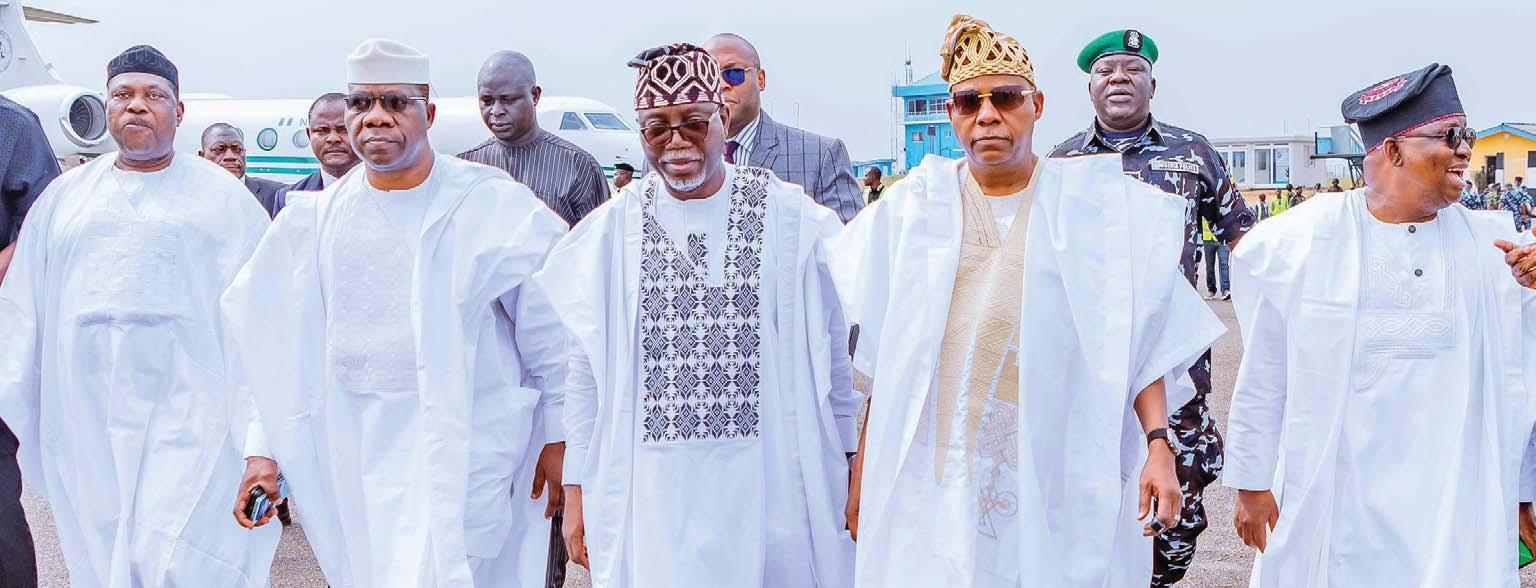
James Emejo in Abuja
The President/Chairman, African Export-Import Bank (Afreximbank), Dr. Benedict Oramah, yesterday said the bank’s $3.3 billion loan support to the Nigerian National Petroleum Corporation Limited (NNPCL) remained one of the bestpriced funding interventions
with six per cent margin amid a high inflation and interest environment.
He also dispelled as ridiculous, claims that the NNPCL would repay the loan at 12 per cent or $12 billion.
Speaking in an exclusive interview with Arise News, the broadcast arm of THISDAY Newspapers, Oramah said the credit facility
would also be repaid within seven years.
According to him, the facility had been helpful in addressing current FX shortage as well as stabilising the financial system.
He also hinted that the loan repayment could be impacted by the inflation trajectory, stating that if lower global inflation could reduce lending
rates, this would also reflect in lower interest payments on its current exposure to the NNPCL.
He said, “We are just hoping that inflation would go down globally so that rates can start going down, and, if those rates start going down, the interest rate on this loan would also start going down.”
Commenting on the nature
Chuks Okocha in Abuja
Presidential candidate of the Labour Party in the 2023 general election, Peter Obi, yesterday, advised the federal government that the clampdown on Bureau De change operators would worsen the foreign exchange crisis in Nigeria.
He added that the clampdown was ill-advised and wrongly directed.
Last week, the Economic and Financial Crimes Commission (EFCC) and some security agencies raided some spots where the Bureau De change operators in Abuja and other parts of the country operated.
Obi, who took to his verified X account warned that the action would worsen the country’s exchange rate situation and not alleviate the issue.
He said the Bureau De change operators were not the primary suppliers of declining value of the Naira.
According to the former governor of Anambra State, “The recent reported attacks and disruption of the business activities of Bureaux de Change (BDCs) operators in different urban centers across the country by government agencies are ill-advised and wrongly directed.
“Rather than solve the problem, the action will
further escalate and worsen the exchange rate situation in the country.
“The BDCs are not the primary suppliers of forex nor do they create demand. They only provide a market to sellers and buyers of foreign currency.”
Obi explained that the Bureau De change operators are visibly present in all economies, including the world’s most developed countries.
According to him, “To think that the BDCs are the cause of the declining value of the Naira is a smack on rational economic thinking.
“The only way to shore up the value of our currency
is to move the country from consumption to production, especially export-led production, and fight corruption, which allows unproductive money to pursue the available supply of foreign currency.
“As long as Nigeria remains an unproductive economy and corruption continues unfettered with people in possession of unproductive excess cash, the value of our currency will continue to depreciate.”
The Labour party presidential candidate, therefore, said it is critical that government officials appropriately comprehend how a modern economy functions and direct their efforts accordingly.
Sunday Aborisade in Abuja
President Bola Tinubu has eulogised the late President of Namibia, Dr. Hage Gottfried Geingob, for his contributions to the development of the Southern African country.
Tinubu, who is also the Chairman of the Economic Community of West African States (ECOWAS), stated this on Saturday, at the memorial service in honour of the late Dr. Geingob in Windhoek, the nation's capital.
The Nigerian leader was represented by the Senate President, Senator Godswill Akpabio, as the Head of the Nigerian delegation.
A statement from the office of the Senate President on Sunday,
explained that Tinubu reflected on the long-standing bilateral ties between Nigeria and Namibia dating to the 1970s. He reiterated the commitment of the present administration in Nigeria to strengthen the country's relationship with Namibia, even as he promised to work hand-in-hand with incumbent President Nangolo Mbumba.
Tinubu, according to the statement, said, "On behalf of myself and the good people of the Federal Republic of Nigeria, I extend my condolences to the government and the good people of Namibia on the passing of our dear brother, President (Dr.) Hage Gottfried Geingob.
"Our thoughts and prayers
remain with you, the government, and the good people of Namibia in these very difficult times. May the strength of your nation be amplified in your National Anthem, "The Land of the Braves," and the grace of God Almighty to provide comfort and solace in the face of this tragic loss. The people of Nigeria in their numbers stand in solidarity with you Namibians, in this moment and beyond this moment.
"As I commiserate with you once more with you and the people of your great nation, the people of Namibia, please accept the assurances, Your Excellency, of my sincere and esteemed regards in this loss."
In his comments, Akpabio noted the partnership between
the two nations, as well as Nigeria's influence in trade, economy, and the political growth of the black nation.
"As I arrived Namibia, I was surprised to meet some of my classmates whom we were together at the Federal Government College, PortHarcourt, who are also here to commiserate with the country.
"Nigeria happens to be one of the frontline states that assisted greatly in the struggle for the independence of Namibia, and assisted strongly in the liberation of South Africa and the liberation of Angola from very far away in West Africa.
"So, we are sharing together in the demise of this great icon and hero,” the Senate President said.
of the loan of which the NNPCL had received $2.25 billion of the total amount, the Afreximbank boss said, “Well, the interest rate on the loan carries a margin of 6.0 per cent per annum above the three-month Secured Overnight Financing Rate (SOFR) that is the base rate which governs the cost of funds, so to say.
“So, if Afreximbank wants to lend money, any other person wants to lend some money – dolla rs - you start from there and it stays, then you add your margin. And the margin we have I think is six per cent, and this loan is a seven-year loan.”
He said, “Actually, it is one of the best-priced loans in the market today. We’re not talking about three years ago, four years ago. We’re talking of today where interest rates have gone up, and we’re just hoping that inflation will go down globally so that rates can start going down.
“And, if those rates start going down, the interest rate of this loan will start also going down. So, that’s what I thought about it, about the pricing of the loan.
“And it’s transparent, there’s nothing to hide about it, and anybody who wants
to compare it can compare it against the yields on the Nigerian bonds trading today.”
Continuing, Oramah said, “It helps acute FX shortage. And you know there are things people do not know, maybe the government will not be saying it, but I’m at liberty because we have a justification for doing what we did. It helps us stabilize the financial system.
“It’s the job of government to do what they know is right actually. Of course, it’s good for people to criticise, ask questions, and all that. But I just think that sometimes, people who are criticizing also have to be reasonable. You don’t have to go to the municipal and start telling stories because if you genuinely want an explanation and you asked, for example, for us, we never got anybody to write to us saying explain this to us.
“We’re not hiding anything. If anybody came and we thought we should, it’s not a confidential matter because everything we do is confidential. And by the way, we are not the only lender, there are other lenders. So, if it’s something that we believe we should explain, we explain.”
The private residence of the FCT Minister of State, Dr Mariya Mahmoud was razed by an inferno, with virtually nothing salvaged in the property.
The property is located at No.
9, Justice Roseline Ukeji Close, Off Mark Okoye Street, Asokoro, Abuja.
According to the Acting Director, FCT Fire Service, Amiola Adebayo, the fire was caused by suspected electrical fault inside the children’s room.
She said no life was lost while the fire was brought under
control at around 2:51 pm. She added that the fire wrought substantial damage on the seven-bedroom duplex. Also there were noticeable cracks on the walls while the roofs were flattened by the heat from the inferno.
The fire also destroyed all the household items on the upper floor, ranging from air conditioners, beds, clothes, documents, credentials and jewelries among others. A combined team of FEMA, Federal Fire Service and FCT Fire Service were on ground during the incident.





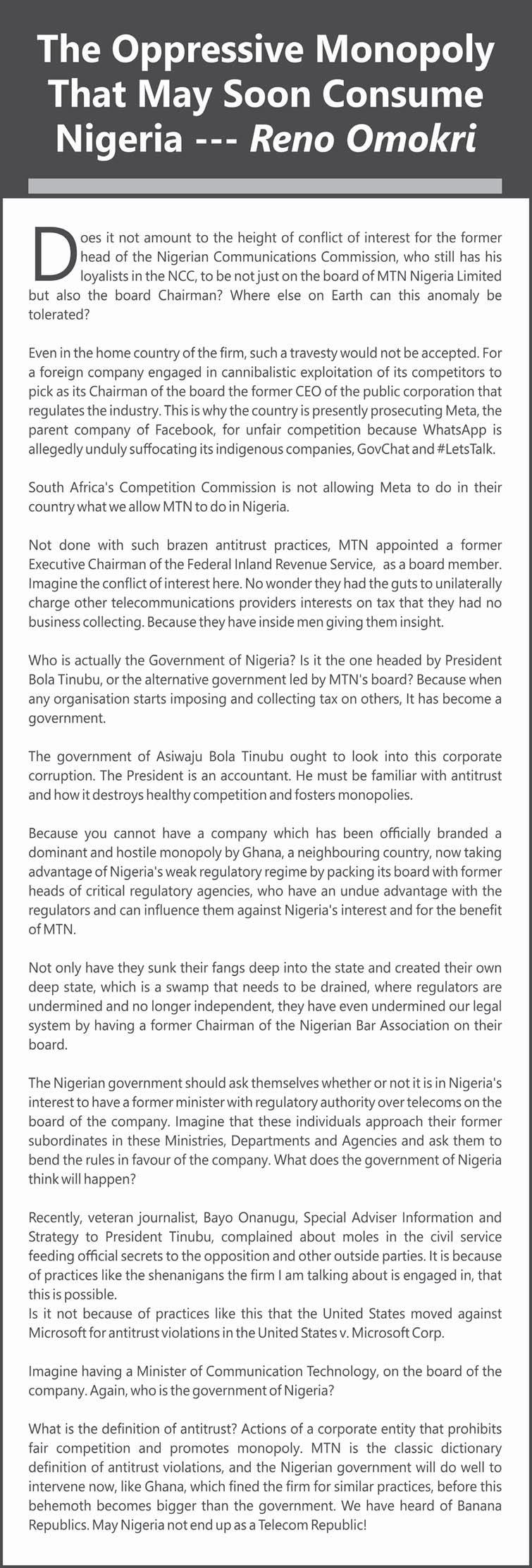

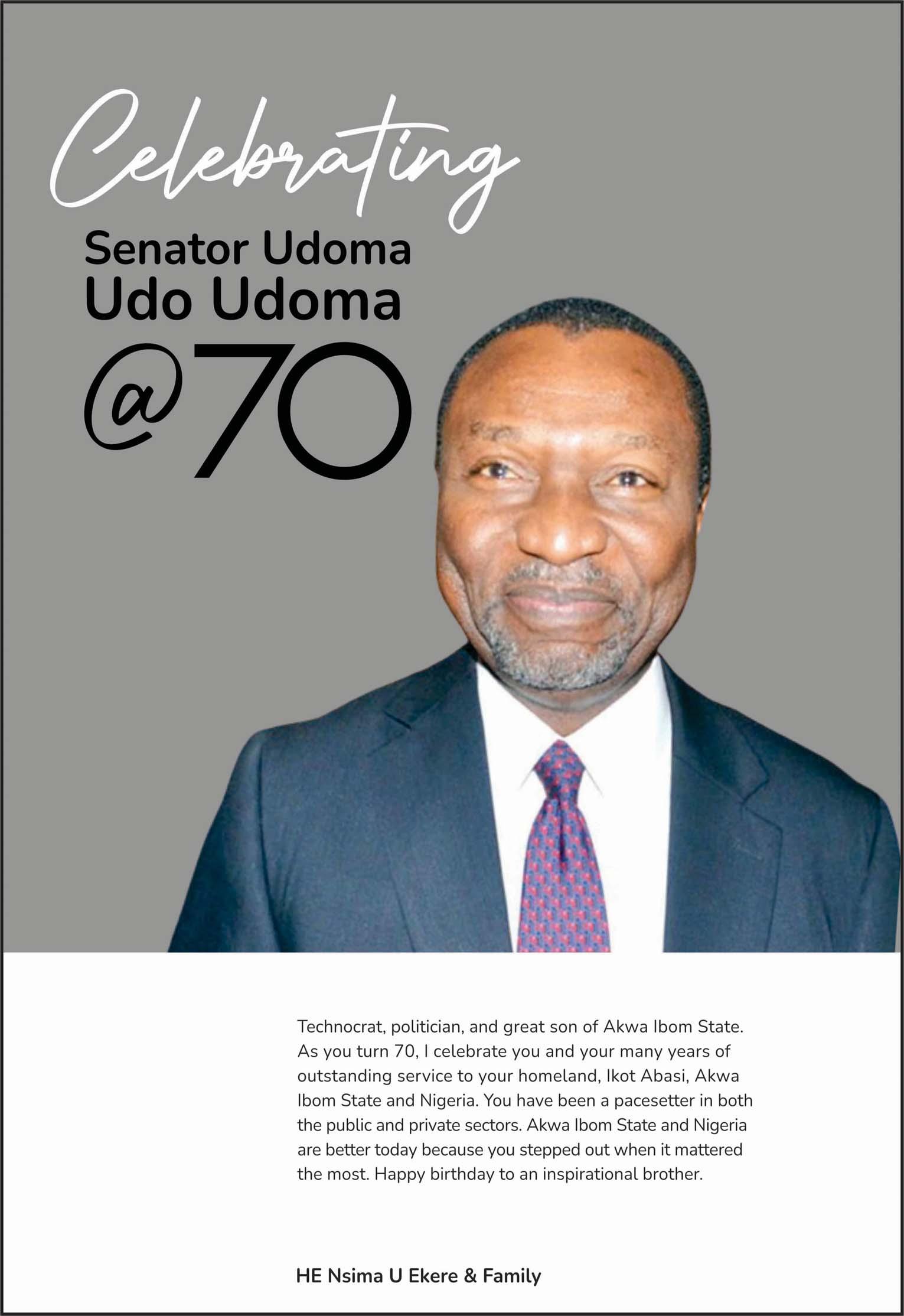
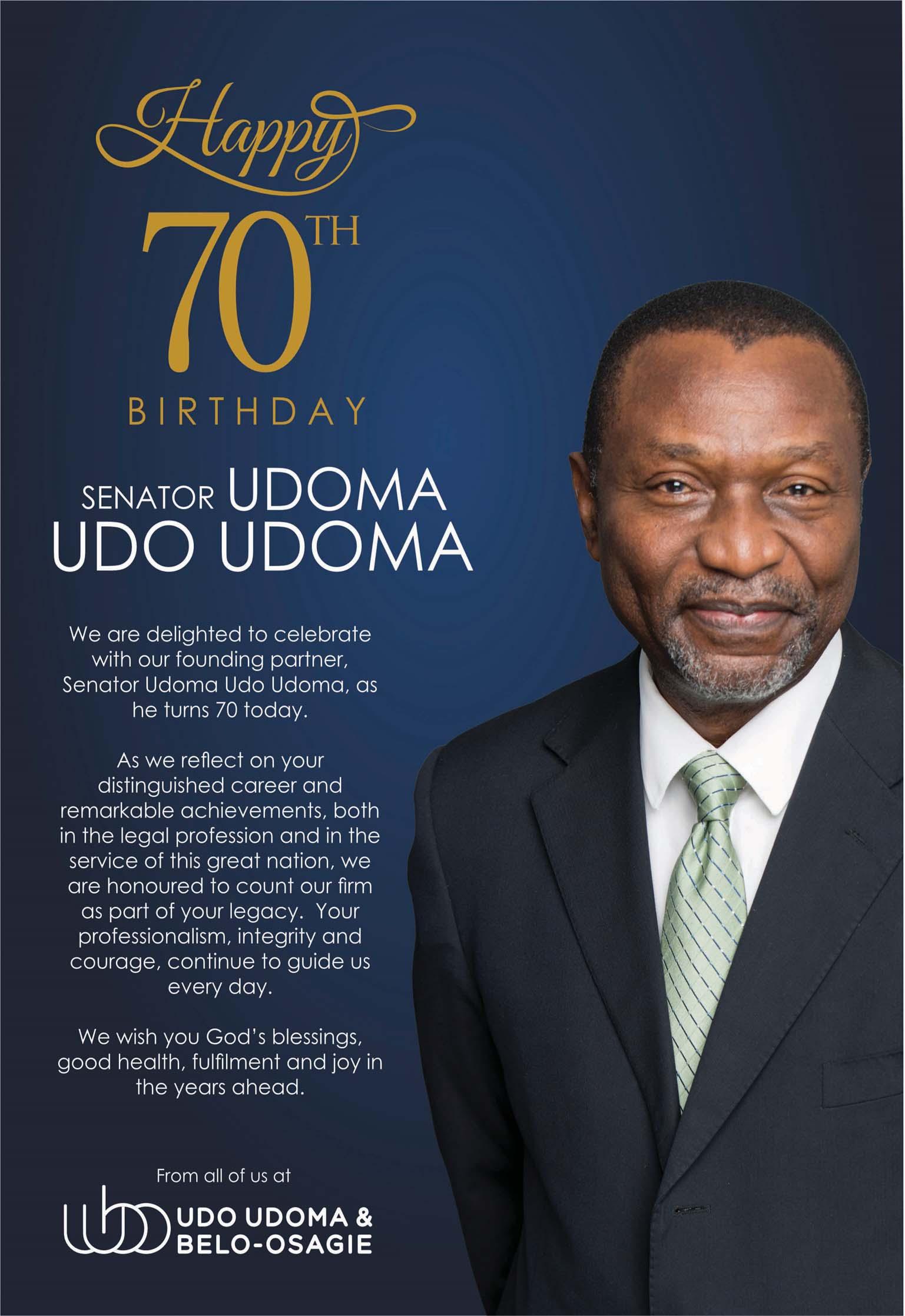
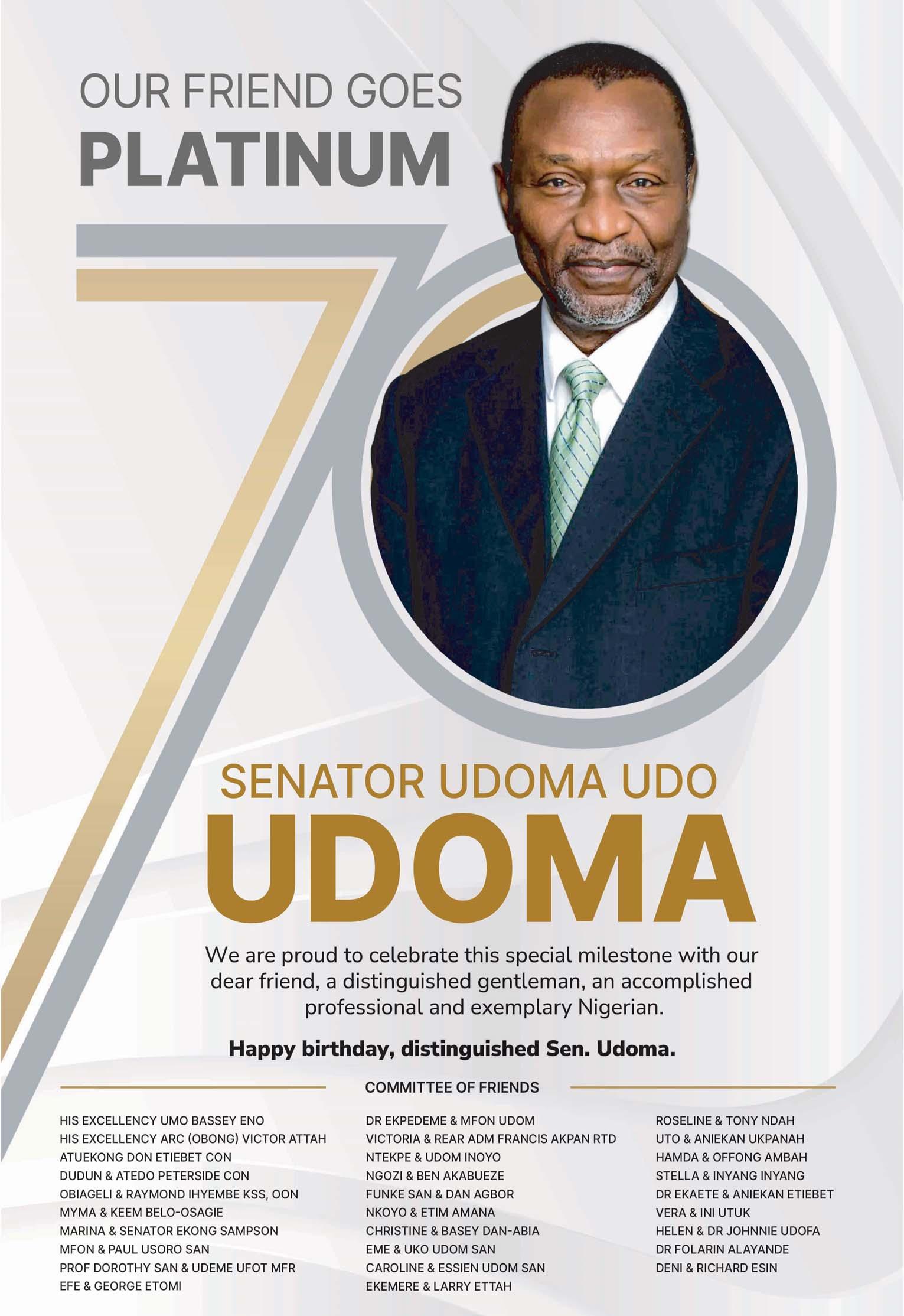


With the swearing in today of 11 Justices recently elevated to the bench
experience speedy dispensation of justice, writes
Alex Enumah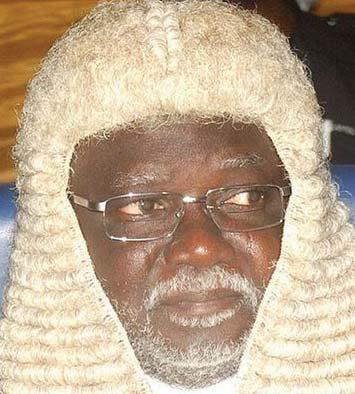
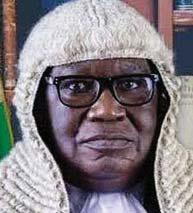

The bench of the Supreme Court of Nigeria has never been at its lowest it was in the last few months, with just 10 justices including the Chief Justice of Nigeria (CJN), Justice Olukayode Ariwoola, to deal with the huge number of cases on the dockets of the court. The situation got so bad that the court cannot constitute two panels to sit in constitutional matters.
Even in the just concluded presidential election cases, the CJN had a very limited number of 10 justices to constitute the seven -member panel that heard appeals against the presidential election.
No doubt, he also experienced similar constraint in constituting the various panels that handled appeals against the governorship election. Recall that governorship appeals from 21 states in the 2023 general elections had reached the apex court and all were decided within two months.
However, all these are about to change now with the swearing-in of 11 new justices. Spokesman of the apex court, Dr Festus Akande, in a short message to journalists last Friday hinted that, “the newly appointed 11 Justices of the Supreme Court will be sworn-in by the Chief Justice of Nigeria, Justice Olukayode Ariwoola on Monday at 10.00am at the Main Courtroom of the Supreme Court”. Their inauguration coming two months after the Senate confirmed their appointment no doubt is a big relief on the current justices on the bench of the apex court.
Besides, the swearing-in will for the very first time enable the Supreme Court attain its full compliment of 21 justices. Section 230 (2) (b) of the 1999 constitution provides that, “The Supreme Court of Nigeria shall consist of such number of Justices not exceeding 21 as may be prescribed by an Act of the National Assembly.”
The last time the apex court got very close to achieving its full compliment was in 2020, when eight justices of the appellate court were elevated to join 12 of their brother justices on the bench of the apex court. Since then the bench witnessed steady depletion from 20 to its current 10 justices, a situation Ariwoola described as the lowest in the history of the country’s judiciary. While the depletion was attributed to mandatory retirement and
death in the last three years, efforts towards filling vacant positions did not yield results until recently.
Recall that Ariwoola, in November last year, at the opening of the 2023/2024 new legal year while acknowledging efforts of his predecessor, Justice Tanko Muhammad to increase the number of justices at the apex court vowed to break what he referred to as a “jinx”. He had disclosed that, immediately he assumed office on June 27, 2022, he “got down to work on this urgent and immediate need in particular.
“Though we have not gotten them on board yet, I can convincingly assure the litigant public that within a very short while, the Supreme Court of Nigeria will, for the very first time in its history, get the constitutionally-prescribed full complement of 21 Justices”, he had said.
However, within few days of this assurance, a list of 22 justices from the appellate court in order of priority and reserve was forwarded from the Federal Judicial Service Commission to the National Judicial Council, for interview, following which 11 emerged successful and were forwarded to the President for appointment.
A statement from the National Judicial Council (NJC) on December 6, 2023 disclosed that those recommended had emerged successful from the NJC’s Interview Committee.
The statement signed by NJC’s Director of Information, Mr Soji Oye, added that, “all recommended candidates to the Supreme Court Bench would be sworn-in after the approval of their recommendation by President Bola Tinubu, and the subsequent confirmation of their appointment by the Senate”.
Recall that on receipt of the list, President Tinubu, without further delay sent it to the National Assembly, for screening and confirmation. The letter of the president was read before the Senators on December 20, 2023 and was referred same day to the Senate Committee on Judiciary, Human Rights and Legal Matters, for screening and further legislative input by the Senate President, Godswill Akpabio.
By the following day, December 21, the Senate confirmed the appointment of the 11 new justices of the Supreme Court. The confirmation followed the consideration and adoption of the report of the Committee on Judiciary. Chairman of the Committee, Senator Tahir Monguno, who presented the report had told his colleagues that the nominees possessed the requisite qualifications and experience to occupy the bench of the apex court,
Besides easing the burden on justices of the apex court, the new appointment has also addressed the issue of balance raised by a former Justice of the apex court, Justice Musa Dattijo Muhammad. The retired jurist, at a valedictory court session held in his honour had observed that only four geopolitical zones - the South-west, South-south, Northwest and North-east - were represented in the Supreme Court with the Southwest and Northwest fully represented. But, from the 11 Supreme Court Justices appointed, both the South-east and North-central zones have the highest of three justices each, while the North-east has two, the North-west, South-west and South-south have one each.
adding that there was no petition against any of them. Monguno, therefore, recommended their confirmation.
The new justices coming on board the apex court include Justice Haruna Tsammani, who presided over the five-member panel of the 2023 Presidential Election Petition Court and Justice Stephen Jonah Adah, a member of the panel.
Others are Justice Jummai Sankey, Justice Chidiebere Nwaoma Uwa, Justice Chioma Egondu Nwosu-Iheme, Justice Moore Aseimo A. Adumein, and Justice Obande Festus Ogbuinya.
The remaining are Justice Habeeb Adewale O. Abiru, Justice Jamilu Yammama Tukur, Justice Abubakar Sadiq Umar and Justice Mohammed Baba Idris.
Besides easing the burden on justices of the apex court, the new appointment has also addressed the issue of balance raised by a former Justice of the apex court, Justice Musa Dattijo Muhammad.
The retired jurist, at a valedictory court session held in his honour had observed that only four geopolitical zones - the South-west, South-south, North-west and North-east - were represented in the Supreme Court with the Southwest and Northwest fully represented. But, from the 11 Supreme Court Justices appointed, both the South-east and North-central zones have the highest of three justices each, while the North-east has two, the North-west, South-west and South-south have one each.
While the three appointed justices from the South-east include Justice Chidiebere Nwaoma Uwa (Abia), Justice Chioma Egondu Nwosu-Iheme (Imo) and Justice Obande Festus Ogbuinya (Ebonyi), those from the North-central include; Justice Jummai Sankey (Plateau), Justice Stephen Adah (Kogi) and Justice Baba Idris (Niger).
These new justices are expected to bring their experience to bear in meeting the justice need of the over 200 million Nigerians. Recall that the issue of appointment had been in the front burner of national discourse for a long while, owing to the litigious nature of most Nigerians.




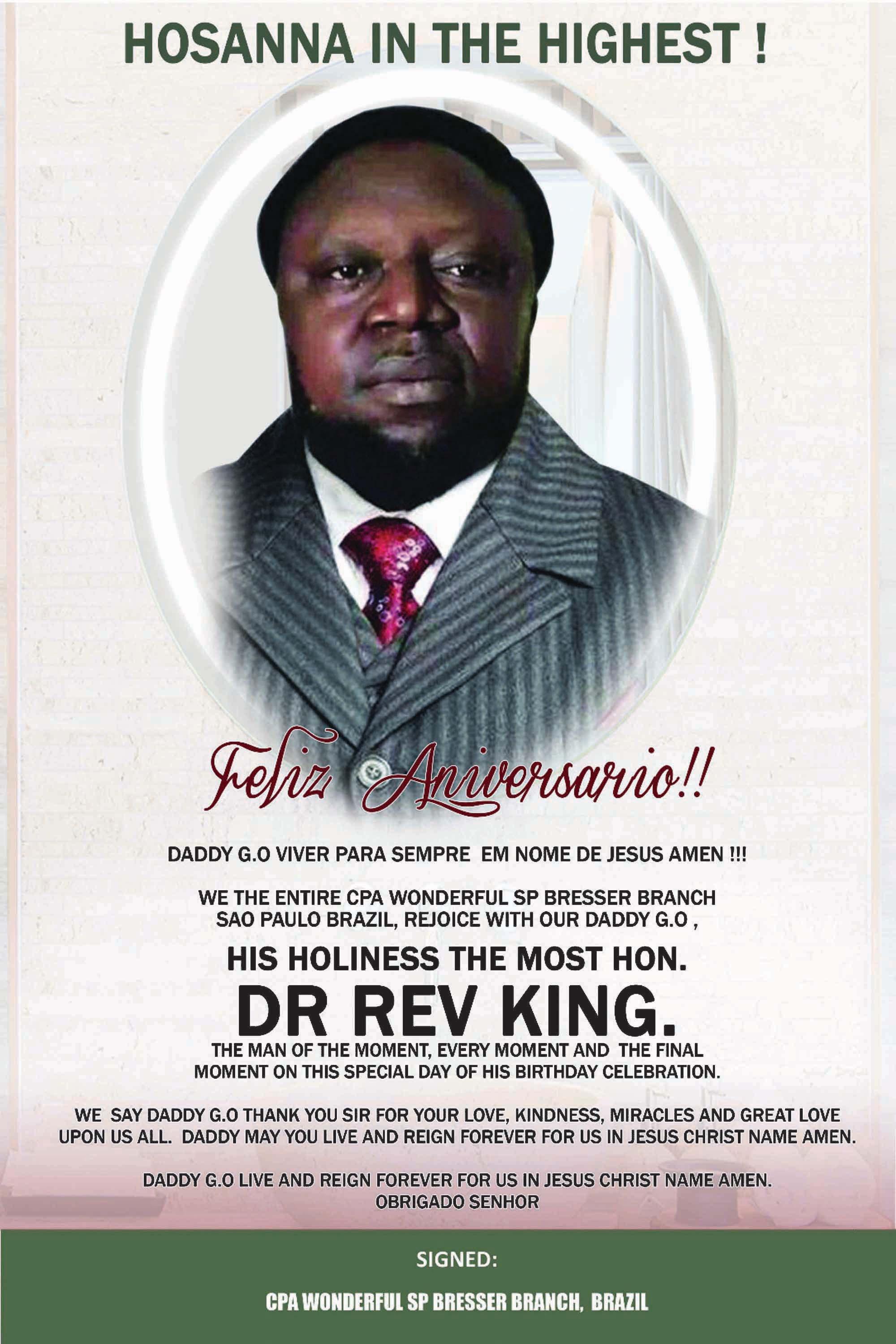





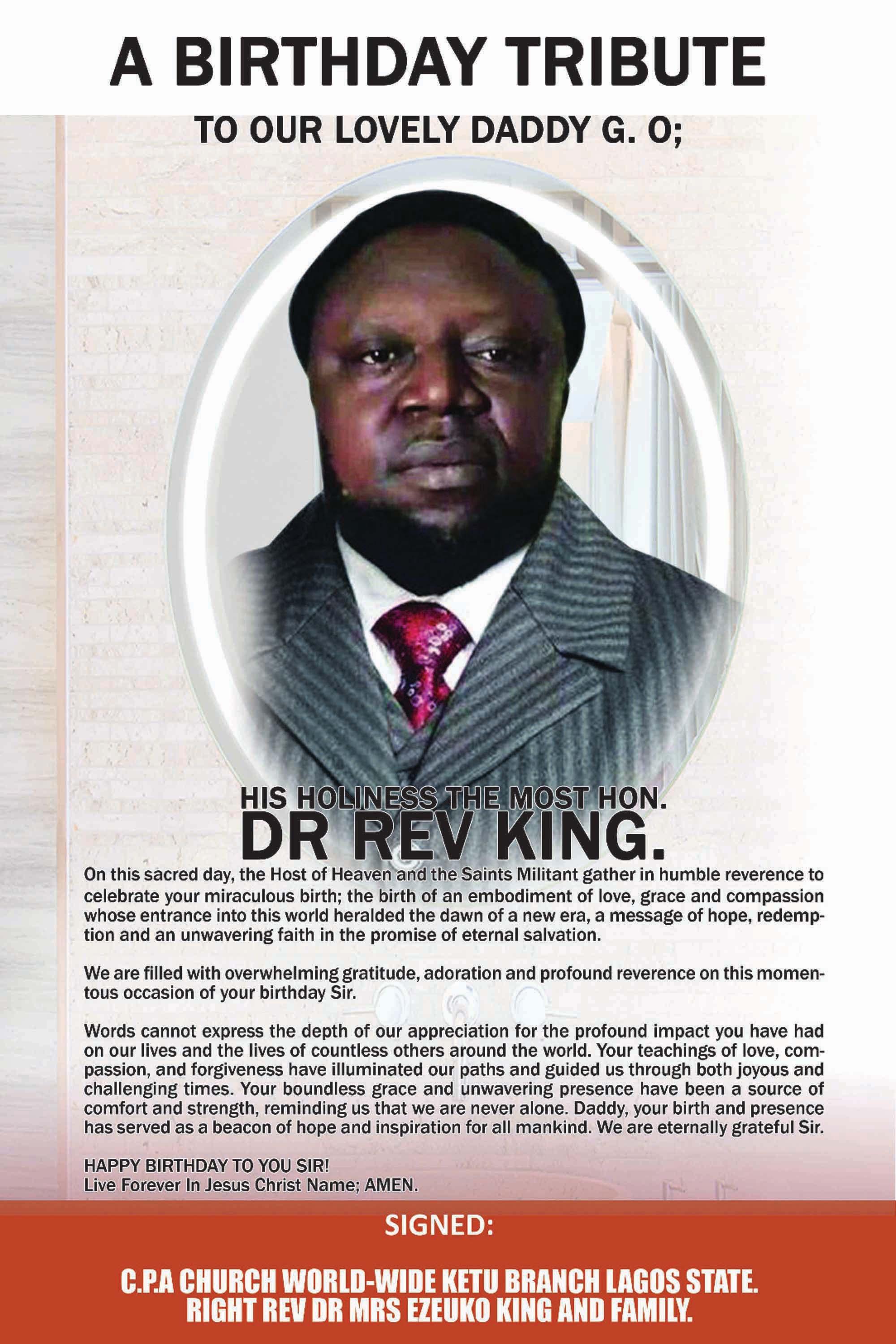




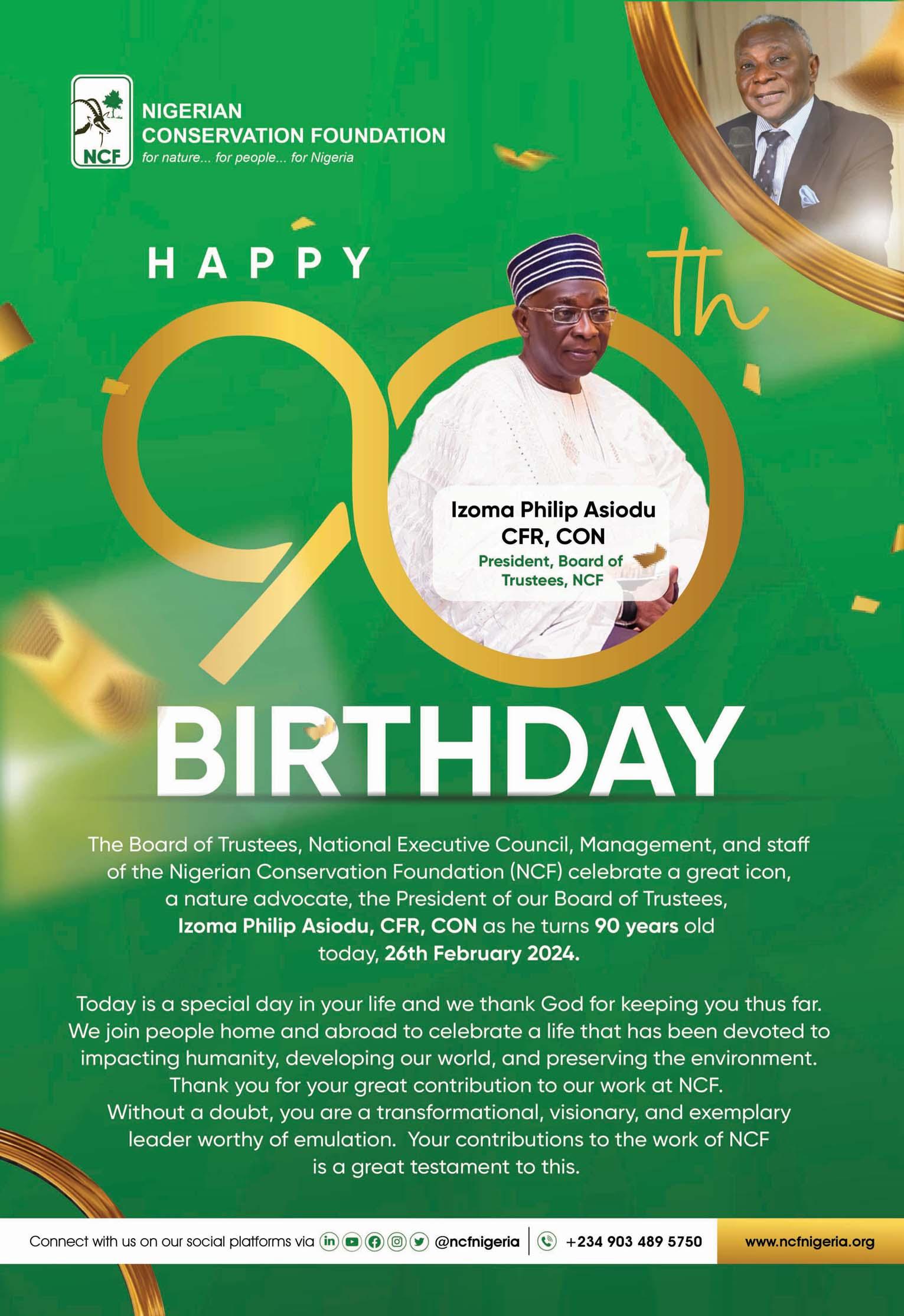
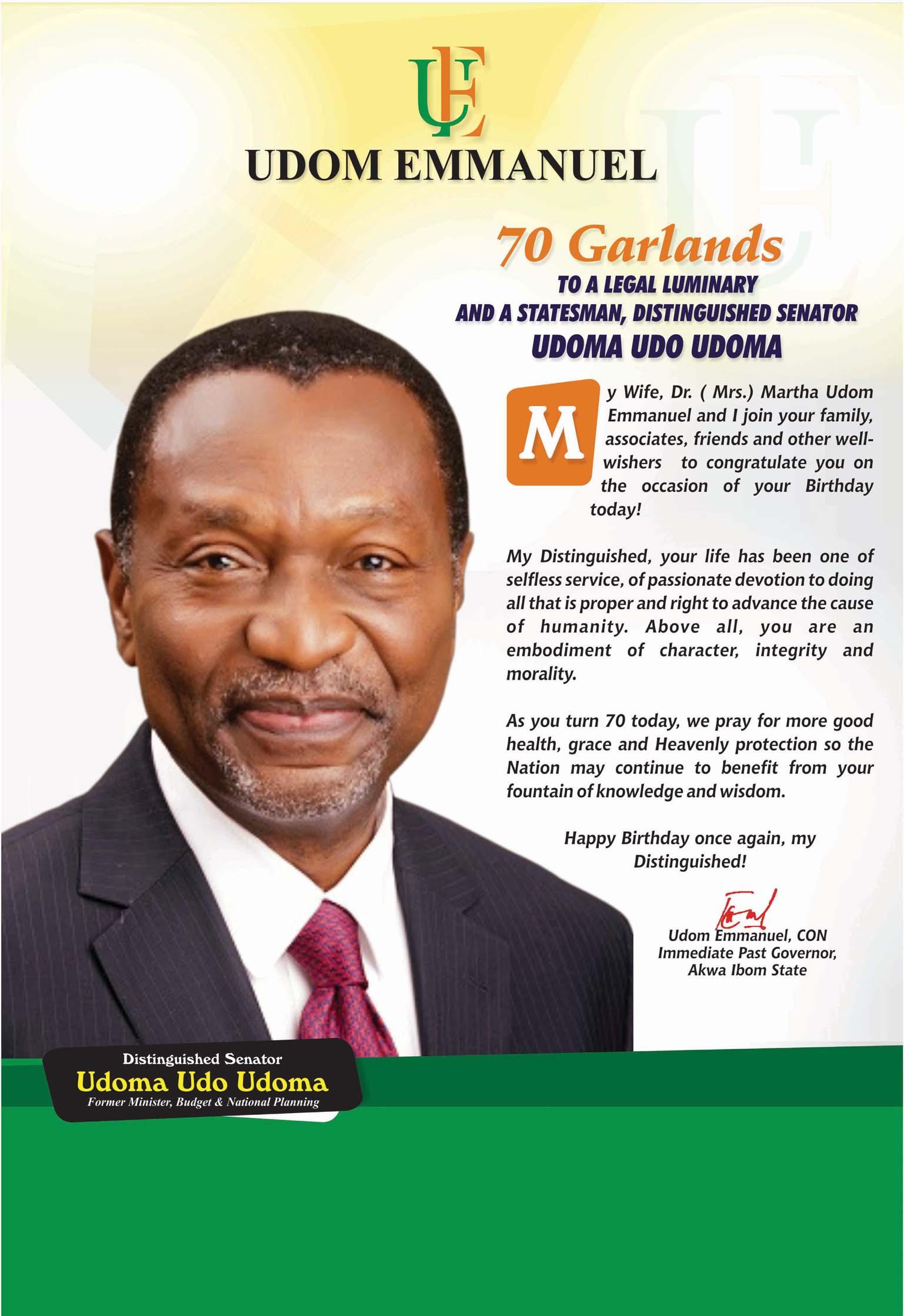

08056356325
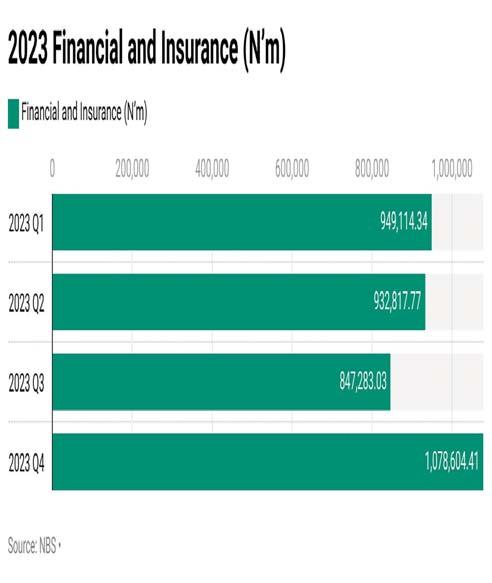
Nigeria’s financial service sector’s contribution to Nigeria’s Gross Domestic Product (GDP) increased to N3.8 trillion in 2023, representing 26.5 per cent Year-on-Year (YoY) from N3.01 trillion reported 2022, THISDAY analysis of the latest data released by the National Bureau of Statistics (NBS) has revealed.
A breakdown of the NBS numbers showed that financial institutions contributed 91.99 per cent of the overall N3.8trillion.
Further analysis revealed that financial Institutions contributed N3.5 trillion in 2023, representing an increase of 28.86 per cent from N2.722 trillion in 2022, while insurance sector N305.02billion in
2023, a growth of 4.82 per cent from N290.98 billion in 2022.
Amid macro economic challenges, the financial service sector recorded an unprecedented contribution to the economy in 2023. The growth in Fintech, foreign exchange unification, and lending to the real sector were major highlights of the banking sector in 2023.
Analysts posits that the banking and insurance sectors are key players in Nigeria’s economy, stressing their support in lending to the real sector, creating jobs and facilitating transactions across the country.
The Vice President, Highcap Securities Limited, Mr. David Adnori noted that the banks in nine months of 2023 declared impressive earnings on the backdrop of the
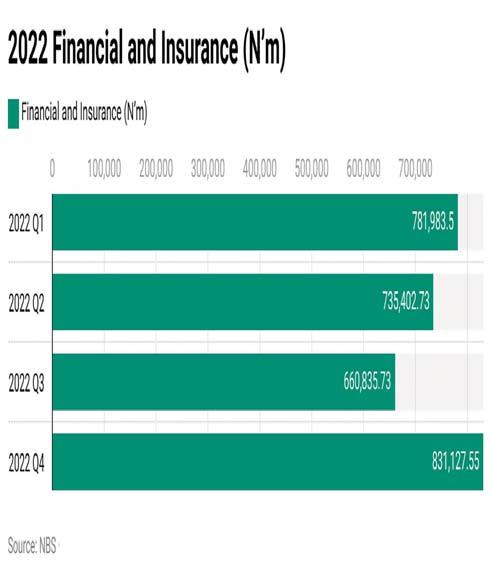
foreign exchange policy of the Federal Government.
“Can the financial institutions and insurance sector contribute more to GDP? Yes of course but the business environment has to be friendly and the Government has to improve ease of doing business,” he said.
Recently, the Central Bank of Nigeria (CBN) revealed that banks’ credit to the economy rose by 49.77 per cent Year-onYear (YoY) to N62.52 trillion in December 2023 from N41.74trillion reported in the corresponding period of 2022.
Data from the CBN’s Money and Credit Statistics showed that credit to the private sector stood at N62.52 trillion for the month of December, second to the highest
recorded last year, with October recording the highest with N63.57 trillion. A breakdown for 2023 showed that January started off with N41.54 trillion, providing a foundation for financial activities. This initial figure set the stage for subsequent months, indicating the baseline for lending operations. February saw a marginal uptick, with credit increasing to N41.75 trillion. This modest rise of approximately 0.51 per cent hinted at a steady pace in financial transactions, setting the tone for the following months. March witnessed a more pronounced surge, reaching N43.01 trillion. Analysts said the substantial increase of about 2.99 per cent hinted
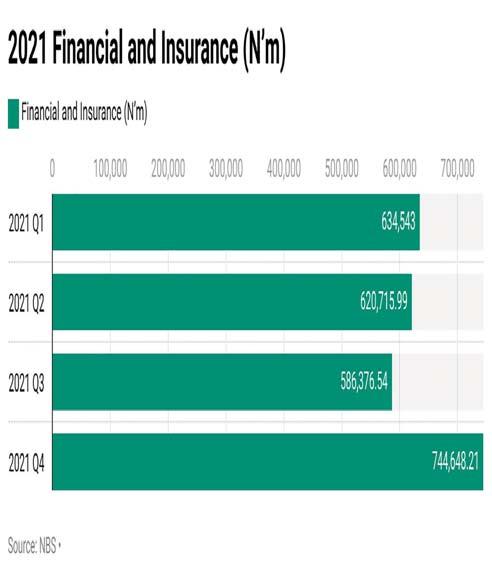
at growing economic activities and a heightened demand for credit in various sectors. Continuing the positive trajectory, April showed a credit figure of N43.66 trillion, marking a further increase of approximately 1.51 per cent.
The upward trend, analysts posited, suggested sustained confidence in the economy. May 2023 brought another boost, with credit reaching N44.79 trillion, signifying an increase of about 2.57 per cent. The consistent climb reflected a robust financial environment and an expanding private sector. June witnessed a significant leap, hitting N52.81 trillion.
“This substantial increase of around 17.92 per cent indicated a surge in credit demand, possibly
linked to heightened economic activities or strategic investments, “said a market watcher.
Meanwhile, the report by NBS had revealed that Nigeria’s GDP growth has remained in positive territory in recent quarters despite the enormous challenges facing the nation amid various policy reforms and implementations.
In specifics, the newly released GDP report by the NBS revealed that the Nigerian economy grew by 3.46 per cent in real terms in the fourth quarter of 2023, below 3.52per cent in the corresponding quarter of 2022 but higher than 2.54per cent in the preceding quarter.
Nume Ekeghe
The Chief Executive Officer, of Guaranty Trust Holding Company Plc, Mr Segun Agbaje, has emphasised the importance of the federal government adopting electronic payment methods across all sectors to drive digital economy.
Agbaje reiterated that for Nigeria to thrive in the digital landscape, a fundamental shift is required from traditional payment methods to technology-driven solutions.
He advocated for a comprehensive embrace of
digital payment platforms, citing their transformative potential in streamlining processes, enhancing efficiency, and fostering economic growth.
Agbaje stated this while giving his keynote address at the Nigeria Banking Connect 2024 organised by Infosys Finacle, over the weekend.
According to him: “We need a government from an incentive perspective when you are a government that is ready to make all payments or incentive payments, whether it’s pension payments on a digital platform so that we can bridge the chicken and the egg.
“In terms of business readiness, there are some key foundations that we need to be part of what we call a digital economy. And what is a digital economy, a digital economy is a part of economic alpha that you get from digital technology, and you need all the things for it to work properly.
“Most of it is not rocket science. You must have enabling macros to do it, you must have data privacy, you must have competition, you must have cyber security, open banking, and Application Programming Interface (APIs), these are all required to have a
digital economy.
“So, Africa 2030 we have to have internet connectivity, we have to make it more affordable, we have to have proper financial inclusion, not cash in, cash out. You have to have a digital economy where people can borrow, they can make payments, they can deposit.”
Highlighting the misconception that mobile payments are the central focus of financial inclusion in Africa, he underscored the broader array of financial services provided through digital platforms and stressed the significance of cultivating a sustainable model that integrates
these platforms for insurance, lending, and payments within a unified ecosystem.
He said: “Financial inclusion contrary to what we think in Nigeria is not cash in, or cash out. Financial inclusions revolve around increasing a sustainable model where you can use digital platforms to do insurance, lending, and payments. And that’s what we’ve done very successfully.”
In envisioning Africa’s digital future by 2030, Agbaje outlined key objectives, including improved internet connectivity, affordability, robust financial inclusion strategies,
and the establishment of a digital economy facilitating borrowing, payments, and deposits.
He urged governments to incentivise the shift towards digital platforms, citing the need for initiatives like pension payments on digital platforms to bridge the transition from traditional to digital payment methods.
He further expressed confidence that Africa has the potential to become a digital continent by 2030, with the phased eradication of traditional payment methods in favour of comprehensive digital solutions.
Ebere Nwoji
Insurance expert and Actuarial Scientist, Dr Prius Apere, has stressed the need for introduction of Risk-based regulatory model, a combination of Risk-based supervision (RBS) and risk-based capital (RBC) in the regulatory system of Nigerian insurance sector saying it was imperative for the growth and development of the insurance market.
Apere, a former Managing Director Linkage Assurance and currently Chairman/CEO Achor Actuarial Services Limited insisted there was need to introduce riskbased approach and to depart from the prevailing static and rules-based approach to define
acceptable behavior.
In a statement, he noted that this has been in the front burner of NAICOM’s insurance market development mandate over the years without real success.
According to him, RBS is a dynamic approach of assessing the probability and severity of material risks facing an insurer.
He added that in RBS, the supervisor is equipped with tools and knowledge to examine the business of insurers through offsite monitoring and onsite inspection processes: evaluation of risk profile and adequacy of risk management systems, quality and effectiveness of corporate governance, market conduct among others.
“RBC is measure of a minimum
amount of capital an insurer must hold (enough to absorb potential losses) arising from the risk it is exposed to.
RBC regulation offers only a point-in-time assessment of capital levels and is essentially a retrospective view of capital, which differs from Solvency II approach, being a prospective view of capital, uses a one-year capitalization time horizon,” he stated.
Apere highlighted reasons riskbased approach would work better as an imperative for insurance market development than the rules-based approach adding that the insurance market development in Nigeria has often been constrained by an absence of innovation.
The National Institute of Credit Administration (NICA), has called on the federal government to implement a credit guarantee system aimed at supporting struggling businesses.
In a statement, NICA’s Chief Executive Officer, Prof. Chris Onalo, highlighted the potential for a new economic landscape in Nigeria, emphasizing the role
of credit availability in boosting productivity.
Onalo envisions a shift toward a credit-driven business model, where the economy thrives on buying and consumption powered by credit.
He anticipates that this approach will stimulate production by providing businesses with the necessary credit to expand their operations.
He said, “In the new economic
dimension, businesses should be driven strictly on credit. The new dispensation should promote buying and consumption that is strictly credit driven. With credit availability, there will be increase in production because the capacity to produce in large quantity will be boosted as the producers will have access credit to expand their operations through a well-funded guarantee arrangement that will play the midwife role.
Nigeria’s major carrier, Air Peace Limited has announced that it would offer Nigerians studying in the UK special fares as it commences LagosLondon flight from March 30, 2024.
Chairman and CEO of Air Peace, Dr Allen Onyema made this known recently in Lagos when he addressed travel agents.
Onyema who unveiled the special package for students urged the agents to ensure the offer was not abused by passengers, noting that the fares will make it easy and affordable for students to return to Nigeria during holidays and travel back at resumption.
He said that he decided to give this offer to young Nigerians studying in the UK to help them connect with home regularly so that they would not stay permanently overseas and get acculturated.
“Several parents have been disconnected from their children.
Many students have not been home for over two years because their parents cannot afford return fares to London. Parents will no longer suffer to raise money for fares for their children because the student fares will be affordable for all parents.
“My children all schooled abroad and we insisted that they return to Nigeria during their school breaks no matter how short the duration of the holidays. This is to enable us remain connected to our children and ensure they stick to our values and culture. I know this is also the desire of several other parents but this desire has been cut short because of high fares travelling to and from Nigeria, But this narrative will change as soon as Air Peace commences flights to London,” Onyema said.
Former President of National Association of Nigeria Travel

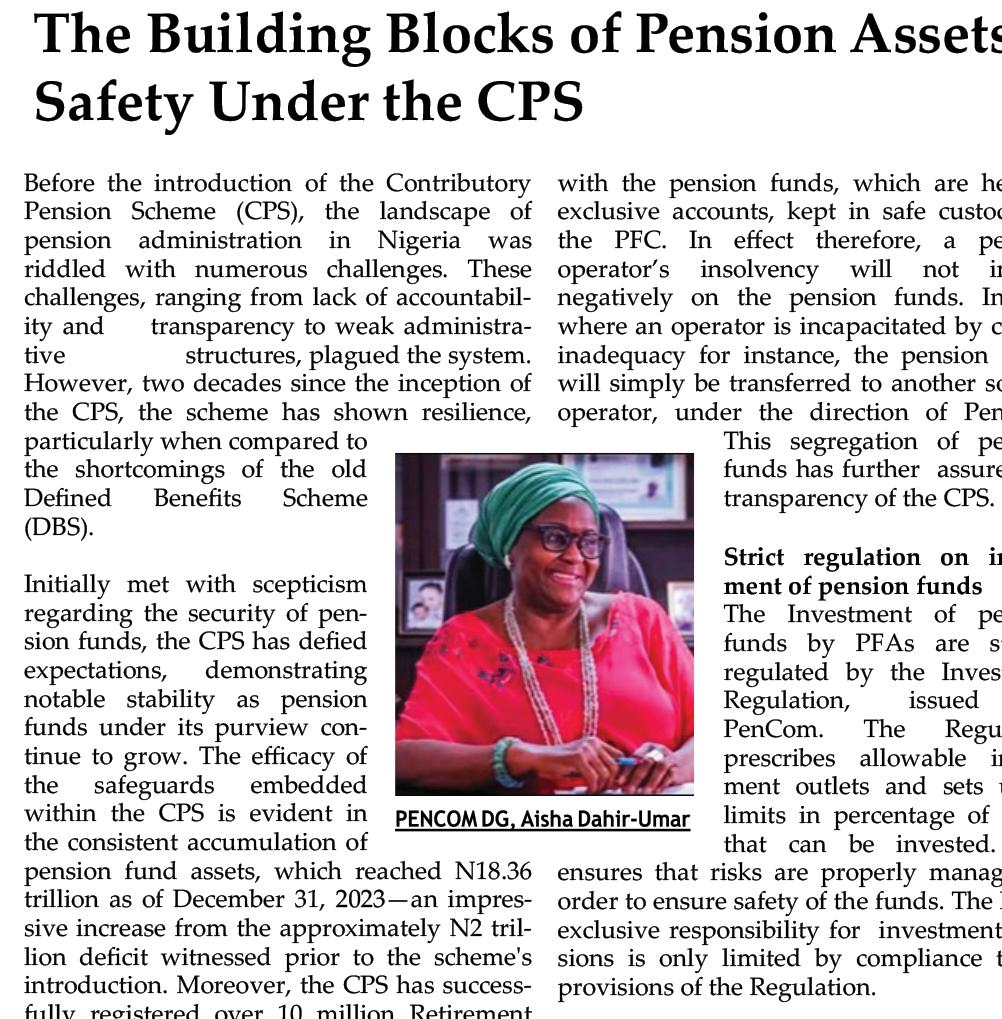
Agencies (NANTA), Bankole Bernard told newsmen at the event that Air Peace’s London flight is a welcome idea, especially as Nigeria would now have its own carrier creating balance of trade which is not tilted to one side.
“There will be a bit of balance. Air Peace has been given a daily slot to Gatwick, which amounts to seven frequencies, compared to 21 frequencies that the legacy airlines have; 14 in Lagos and seven in Abuja. To an extend, we have something that will balance it up,” Bernard said.
The Chief Operating Officer, Air Peace, Oluwatoyin Olajide during her speech at the event said the London route means a lot to Nigeria because its indigenous airline will be operating to London with affordable fares and good service.
Group Business Editor
Eromosele Abiodun
Deputy Business Editor
Chinedu Eze
Comms/e-Business Editor
Emma Okonji
Asst. Editor, Money Market
Nume Ekeghe
Senior Correspondent
Raheem Akingbolu (Advertising)
Correspondents
Emmanuel Addeh (Energy)
KayodeTokede(CapitalMarkets)
James Emejo (Finance)
Ebere Nwoji (Insurance)
Reporters
Peter Uzoho (Energy)
Ugo Aliogo (Development)
The Japanese Ambassador to Nigeria, Mr. Matsunaga Kazuyoshi, has commended the management of Sacral Industries Limited for taking the bold decision to set up a factory in Lagos, Nigeria for assembling consumer electronics and home appliances.
He gave this commendation when he recently led a delegation from the Japanese Embassy, the United Nations Industrial Development Organization (UNIDO), Daikin Nigeria, and DaiTech Nigeria Limited on a factory tour of Sacral Industries Limited.
Speaking during the tour, the Japanese ambassador to Nigeria described the action taken by the company as a noble gesture that would not only contribute significantly to creating job opportunities for the teeming youth in Nigeria but also help boost capacity or workforce in the engineering field.
He explained that such action demonstrates the company’s immense confidence and
commitment to contributing to the growth of the Nigerian economy. He assured the company that his home country would continue to play its role in supporting businesses that would contribute immensely to improving the lives of the people in Nigeria.
“I am quite impressed with the action taken by the management of Sacral Industries to set up an assembly plant in Nigeria. It is the right step in the right direction. With this alone, jobs will be created, and knowledge can be passed on. Beyond this, there are other economic benefits, such as reduced pressure on the naira. I am confident that a great future lies ahead for Nigeria’s economy as a whole with this significant step,” he said.
In his remarks, the Managing Director, Sacral Industries Limited, Mr. Rajeev Girglani, expressed profound appreciation to the Japanese delegation on the visit, stressing that the company would continue to play its part in enhancing Nigeria’s economic prosperity.
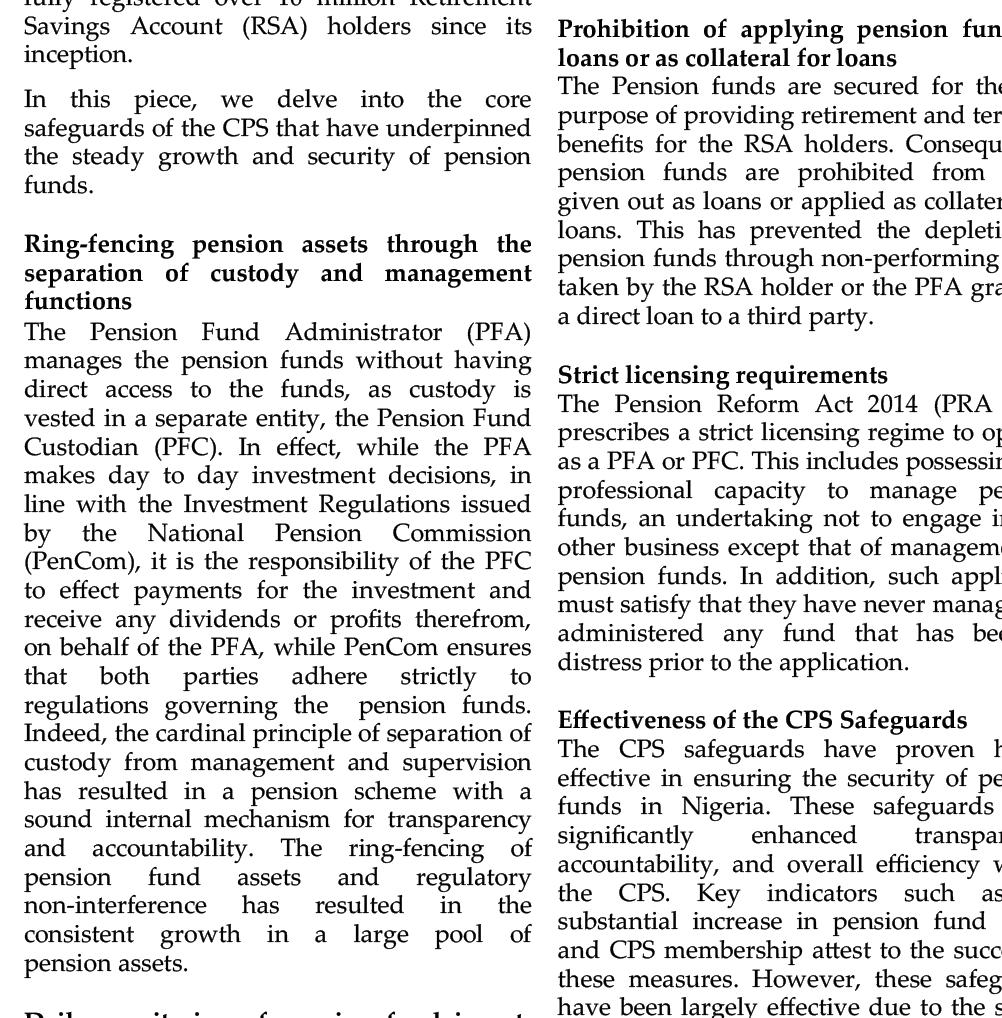
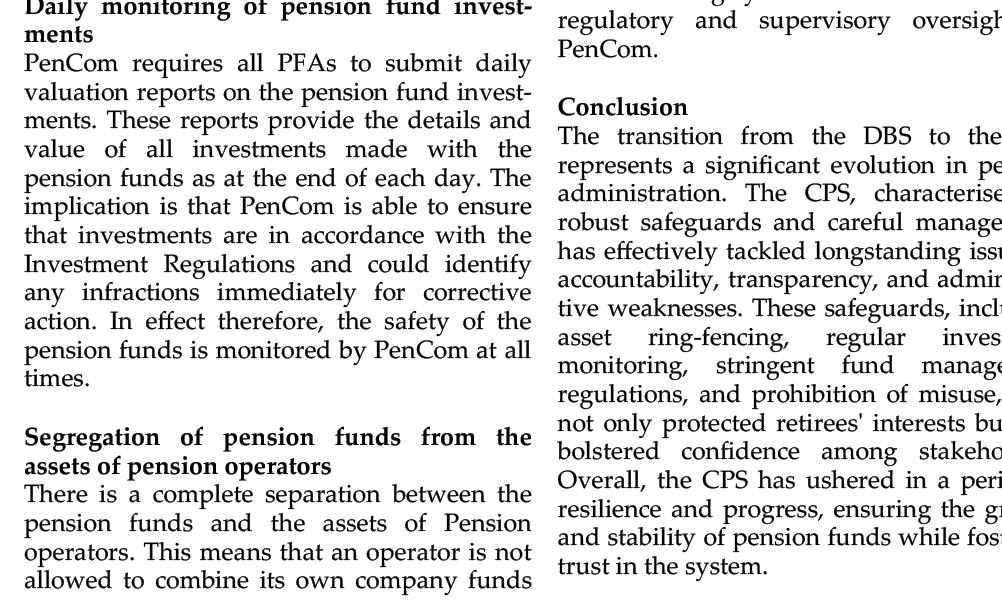
NLNG, LCCI Seek Increased Partnership on Promoting Respiratory Technologies for Newborns
Gilbert EkugbeThe Nigeria LNG Limited (NLNG) and the Lagos Chamber of Commerce and Industry (LCCI) have called for increased collaboration between the business community and the science and research sector in Nigeria to close the gaps in meeting sustainable development goals, especially in reducing neonatal mortality.
The call was made to the business community at the public presentation of the winning work of The Nigeria Prize for Science (2023).
The work, by Professor Hippolite Amadi, which won the 2023 prize for science, focused on three technological innovations aimed at saving the lives of neonates by making the delivery of oxygen cheap and easy.
In his remarks, the General Manager of External Relations and Sustainable Development, Andy Odeh, said a report by the World Health Organisation (WHO) in 2023 ranked Nigeria as the country with the second highest number of maternal, neonatal and child deaths worldwide, adding that Nigeria stands the risk of normalising neonatal mortality if nothing is done to stop it.
“The groundbreaking innovations of Professor Amadi, as recognised by The Nigeria Prize for Science, are not merely a step forward for our nation but a beacon of hope for the countless newborn lives that hang in the balance. We cannot afford to let the cries of our newborns fade into the background of our daily lives. The urgency to combat
neonatal mortality is a solemn duty to safeguard the future of our nation’s children, and we must answer that call with unwavering determination and immediate, decisive measures.
“NLNG is very proud of Professor Amadi’s discoveries through The Nigeria Prize for Science. Our vision of helping to build a better Nigeria is the core of the prize, and we believe strongly that the 2023 winning entry speaks in unambiguous terms as one of the ways we can achieve this vision.
NLNG remains committed to the prize and will not relent in finding solutions to the nation’s development issues,” he stated.
The LCCI president, Mr. Gabriel Idahosa, stated in his address that the business interactive forum provided a unique opportunity for the Nigerian business community to learn from Professor Amadi’s work.
He said that if Nigeria, given its natural endowments, is to successfully transform its economy and achieve significant growth, science and technology and its integration into the socio-economic development process must be accorded the highest priority.
“It is important to note the recognition of Professor Amadi’s work in the field of newborn and child healthcare, which was selected from over a hundred entries. The work is not only based on how it can significantly advance neonatal care in Nigeria but also on how it can improve access and reduce neonatal care costs.
Grant Thornton Nigeria is optimistic about the prospects for economic growth, entrepreneurial development, and innovation in the mid-market assuring that it is prepared to provide high-quality transactional advisory services with the addition of Mr. Tayo Adedokun as a new partner in the Advisory service line.
The implementation of new economic policies brings with it the significant responsibility of attracting and retaining both domestic and foreign investments, which are crucial for enhancing the country’s economic stability and reputation.
Managing Partner and CEO, Dr. Ngozi Ogwo, highlights the firm’s commitment to providing transactional advisory services essential for nurturing a resilient business environment in Nigeria and the African continent.
“Transactional Advisory Services (TAS) play key roles in maintaining the integrity of business transactions in
the country through the provision of comprehensive financial evaluations, risk assessments, and compliance reviews, which lead to increased trust and confidence in the market,” she said.
“Tayo Adedokun joined the firm in 2009 as a chartered accountant and developed expertise in audit and advisory services. In 2016, he transitioned to the Advisory service line and has consistently delivered exceptional results in specialties such as valuation, due diligence, reporting accountant, and corporate governance review engagements among other services for both listed and other corporate organizations, “she added.
Speaking on the admission of the new partner, Head of Advisory Services, Mr. Orji Okpechi, reiterated the significance of Transactional advisory services to the economy, noting that it cannot be overstated.
Glocapro, a leading Canadian consulting platform, is set to host the Nigeria-Canada trade summit, aimed at fostering bilateral relationship between both nations.
The summit, with the theme, ‘Fostering the Bilateral Relationship between Nigeria and Canada’, is scheduled to hold in Lagos.
Co-host of the summit, Mr. Babajide Shiwoku, who is the Director of Business Development and Partnerships at Glocapro, stated that the event will be a gathering of influential figures from various sectors, including business, technology, manufacturing, and professional services.
Shikowu also highlighted the numerous benefits and features awaiting participants, as he encouraged interested individuals
The National Identity Management Commission (NIMC) has assured all Nigerians of decongestion at all NIMC’s enrolment centres, following the revalidation and licence renewal of 96 Front End Partners (FEPs), who are private companies, licenced by NIMC to assist in enrolling Nigerians for their National Identification Number (NIN).
NIMC has over 5,500 enrolment centres across the country, but the centres are congested with large crowd of Nigerians who visit the centres for NIN enrolment on daily basis. In order to decongest the crowd, NIMC licensed over 200
FEPs to assist in NIN enrolment, a development that decongested the crowd at all NIMC centres nationwide, but the crowd resurfaced last year, after NIMC suspended all FEPs and asked them to reapply for revalidation re-issuance of operational licence.
Speaking at the just concluded management retreat organised by NIMC, which held in Eko Hotel, Lagos, the Director General of NIMC, Abisoye Coker-Odusote, assured Nigerians that with the revalidation of 96 FEPs, congestion at NIMC’s enrolment centres would be highly reduced. She said with the revalidation of 96 FEPs, NIMC would be able to enroll between 20 and 25 million additional NINs
by the end of 2024, to bring the total number of NIN registration to over 124 million by the end of 2024.
According to her, “We have heard and listened to the public outcry on some cases of extortion, through the offices of the FEPs and that is one of the reasons why, last year, we had to suspend them, to ensure that we close all loopholes for extortion. We have now gone through all that process successfully, to ensure that extortion is no longer possible in the system, by introducing the License Assurance Framework (LAF).”
Giving further insight about LAF, the Director, Business Development and Commercial
Services at NIMC, Carolyn Folami, said LAF, represents a mechanism that would allow NIMC to be able to pay FEPs, exactly what they earn.
“We have engaged a couple of them and we have revalidated about 96 of them lately, and reintroduced them into the new system that we have built, which is trying to ensure the integrity of the data that we are bringing. We have had series of issues concerning data integrity, in terms of some FEPs doing some unwholesome activities. So we are bringing in LAF to ensure that all ends are tightened-up and we can have a one view of FEPs on-boarding from the beginning to when they are paid,” Folami said.
Chinedu Eze
The Nigerian Airspace Management Agency (NAMA) and the Nigeria Air Force have reinforced their cooperation in order to strengthen safety in the nation’s airspace.
NAMA said continuous improvement of safety is critically important in order to maintain the
good record Nigeria has attained with zero tragic accident involving commercial airlines in the last 10 years.
The agency reiterated its commitment to fortify its collaboration with the Nigerian Air Force to bolster airspace management safety and air security across Nigeria.
The Managing Director of NAMA, Ahmed Farouk made this known recently in Abuja during a courtesy visit to the Nigerian Air Force Headquarters, where he engaged in discussions with the Chief of Air Staff, Air Marshal Hassan Abubakar. Farouk affirmed the ongoing partnership between NAMA and
the Nigerian Airforce, recognizing the critical role the Airf Force plays in safeguarding Nigeria’s airspace.
On his path, Air Marshal Hassan underscored the importance of maintaining a steadfast commitment to the partnership, emphasizing its significant impact on the safety and efficiency of Nigeria’s aviation sector.
to secure their spots early. “As the global landscape continues to evolve, events like this serve as catalysts for international cooperation and economic growth. This summit is expected to draw a diverse audience eager to explore opportunities for collaboration between Africa and North America.
“Attendees will have the invaluable opportunity to network with high-profile business leaders from across continents. We have also ensured that the summit will provide insights into the processes of obtaining work visas, permanent residence, and business migration to Canada and the USA. The benefits and features of this exclusive summit are actually enormous, hence we have pegged the access fee at $200 or N250,000, with limited seats available,” he said.

James Emejo writes on current efforts by the monetary authority to reset the economy even as the apex bank assures Nigerians that the prevailing hardship is temporary
There is no gainsaying the fact that Nigerians are currently facing tough times – following a cocktail of policy reforms particularly in the financial system. At the inception of the administration of President Bola Tinubu, there was the bold decision to end petrol subsidy which immediately impacted the cost of transportation and impact on prices of good and commodities.
Among other things, the administration further set out to introduce reforms in the country’s Foreign Exchange (FX) market by floating the Naira which had currently become weaker against the United States’ Dollar.
Also, key macroeconomic indices remained poor – inflation, currently at 29.90 per cent continues to wreak havoc on the economy coupled with the benchmark interest rate which is at 18.5 per cent – implying a negative interest rate regime.
If anything, the current FX crisis which has impacted cost of living remained one of the biggest headaches for economic managers. Prices of food and essential items have more than tripled in recent times.
The National Bureau of Statistics (NBS) disclosed that Consumer Price Index (CPI) which measures the rate of change in prices of goods and commodities rose to 29.90 per cent in January compared to 28.92 per cent in the preceding month. Year-on-year, headline inflation was 8.08 per cent higher compared to 21.82 per cent in January 2023.
Food inflation rate increased by 11.10 per cent year on year to 35.41 per cent compared to 24.32 per cent in January 2023, while core inflation which excludes the prices of volatile agricultural produces and energy also rose by 4.71 per cent to 23.59 per cent year on year compared to 18.88 per cent in January 2023.
For instance, the prices of cement which Nigerians were hitherto assured to crash this year have more than doubled from about N5,000 to between N12,000 and N15,000 per bag alongside other building materials. The development has been partly blamed on rising gas rates and import duties which had been raised in recent times.
However, the current economic quagmire has been blamed on faulty fundamentals which the current administration is making frantic efforts to address. One of the major concerns had been that the country remains a major import-depended economy that constantly requires FX to import food and commodities and well as fund education, vacation abroad among others – its inability to industrialise and become a net exporter of goods remains one of the factors contributing to the present hardship. Nigeria has not been able to earn enough dollars to cater for its growing import needs, thereby putting enormous pressure on the local currency.
Only recently, the Governor of the Central Bank of Nigeria (CBN), Mr. Olayemi Cardoso, insisted these costs of reforms are temporary, adding that the decisions and policy interventions of the apex bank would in no time address a lot of fundamental issues bothering Nigeria’s macroeconomic credentials and “ultimately put us on a surer path to prosperity.”
Addressing lawmakers on the state of the economy, the CBN governor blamed Naira’s weakness on increased FX demand pressures fueled by speculative forex demand, inadequate forex supply, increased capital outflows, and excess liquidity.
According to him, the shift to a marketdriven exchange rate (floating) was intended to create a stable macroeconomic environment and discourage currency hoarding, adding however, that the short-term volatilities are due to arbitrage and speculation.
He said: “We must understand that the genuine issue impacting the exchange rate is
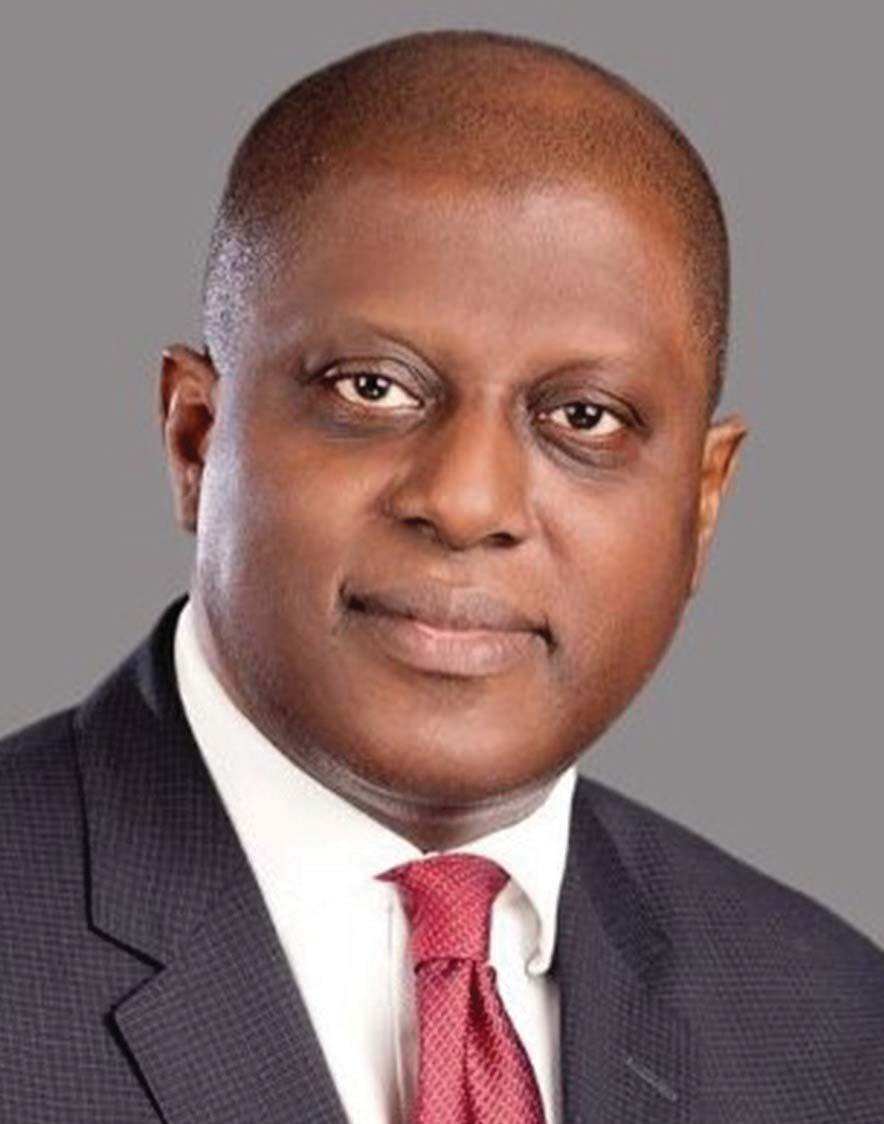
the simultaneous decrease in the supply of, and increase in the demand for, US Dollars. It is also clear that the task of stabilising the exchange rate, while an official mandate of the CBN, would necessitate efforts beyond the bank itself. It will also include actions by corporates and individuals to reduce our frequent demand for the dollar for business and personal needs.”
He said: “To address exchange rate volatility, a comprehensive strategy has been initiated to enhance liquidity in the FX markets. This includes unifying FX market segments, clearing outstanding FX obligations, introducing new operational mechanisms for BDCs and IMTOS, enforcing the Net Open Position limit, Open Market Operations and adjusting the remunerable Standing Deposit Facility cap among others.
Also lately, the CBN declared that going forward, International Oil Companies (IOCs) would only be allowed to repatriate a maximum of 50 per cent of export proceeds in the first instance, adding that the balance of 50 per cent of export proceeds may be repatriated after 90 days from the date of inflow of the proceeds.
Moreover, the central bank prohibited the payment of Personal Travel Allowance (PTA) and Business Travel Allowance (BTA) by cash going forward, stressing that PTAs and BTAs must henceforth be disbursed through electronic channels only, including debit or credit cards to curb abuses and boost transparency in FX transactions.
Furthermore, the central bank announced the review of the allowable limit of price
deviation for exports and imports to -15 per cent and +15 per cent of the global average prices, respectively under the Price Verification System (PVS). All the measures were aimed at addressing the persisting liquidity challenges in the economy which had worsened living conditions.
He said: “These measures, aimed at ensuring a more market-oriented mechanism for exchange rate determination, will boost foreign exchange inflows, stabilize the exchange rate, and minimize its pass-through to domestic inflation.”
Cardoso told the lawmakers that indeed, in spite of the temporary economic hardship, the reforms so far implemented by the central bank have already started yielding early results with significant interest from foreign portfolio investors (FPIs) that have already begun to supply the much-needed foreign exchange to the economy.
According to him over $1 billion had been invested in the Nigeria Treasury Bill auction of N1 trillion which saw an oversubscription recently.
He pointed out that “Our measures aimed at improving USD supply into the Nigerian economy, has significant potential in taming the volatility of the exchange rates. However, for these measures to be sustainable, we must as a country, moderate our demand for FX.
“We must understand that the genuine issue impacting the exchange rate is the simultaneous decrease in the supply of, and increase in the demand for, US Dollars. It is also clear that the task of stabilising
the exchange rate, while an official mandate of the CBN, would necessitate efforts beyond the Bank itself. It will also include actions by corporates and individuals to reduce our frequent demand for the dollar for business and personal needs.”
According to Cardoso, the upward trend in food inflation was primarily due to supply shocks caused by insecurity, climate-induced factors including flood and rainfall shortage in some cases, inefficient, subsistent and seasonal farming practices as well as importation bottlenecks that had impacted the prices of imported food items.
He stated that the recent exchange rate volatility had fueled more foreign demands for agricultural products, especially, from neighbouring countries.
He said while this presents an opportunity to expand and boost agricultural output, hence creating jobs in the sector, supply constraint exacerbated demand, instigating more inflationary pressures.
On the money supply side, the CBN governor insisted that money supply remained one of the factors fueling the current inflationary pressure.
He said: “For instance, an analysis of the trend of the money supply spanning over 9 months shows that M3 increased from N52.01 trillion in January 2023 to N68.25 trillion in November 2023 representing N16.24 trillion or 31.22 percent increase over the period. Increase in Net Foreign Asset (NFA) following the harmonisation of exchange rates and the N3.22 trillion ways and means advances were the major factors driving the increase in money supply.
“We have also halted quasi-fiscal measures totaling over 10 trillion naira by the Central Bank of Nigeria previously disguised as development finance interventions. These measures had contributed to increase in money supply thereby raising prices to the levels of Inflation we are grappling with today.”
Nonetheless, he said the CBN’s adoption of inflation-targeting framework involved clear communication and collaboration with fiscal authorities to achieve price stability, potentially leading to lowered policy rates, stimulating investment, and creating job opportunities.”
Speaking to THISDAY on the current hardship and policy reforms, Managing Director/ Chief Executive, SD&D Capital Management Limited, Mr. Idakolo Gbolade, said the measures introduced by the central bank had caused more revenue inflows into the country. But he expressed worry over the rising cost of living, adding that the government needed to do more ameliorate the sufferings of the people
He said: “The federal government have witnessed tremendous increase in revenue due to floating of the Naira and is projected to enable the FIRS achieve its revenue target for the year. However, dollar continues to surge against the Naira due to speculation, excessive purchase of the greenback by some people to edge inflation which has led to increasing scarcity of the US dollars.”
He said: “These reforms by the CBN just like the fuel subsidy removal is coming at a time when the ordinary Nigerian is already on the edge due to low purchasing power and astronomical increase in cost of goods and services with no rise in income.
“So, to an average Nigerian these reforms have only added to their already bad situation. It is agreed that good reforms could take time to turnaround a very bad economy but in the Nigerian situation all the bullets are aimed at the people without a way of escape.
“The reforms would have been bearable if there were meaningful palliative or realistic efforts to assuage the hardship in the land.”
As Nigeria grapples with a mounting FX crisis, the imperative is clear: doubling efforts to augment dollar inflows must supersede engaging in a blame game, writes Festus
AkanbiFor the current managers of the Nigerian economy, this is certainly not the best of time.
This is because the atmosphere of confusion, panic, and seeming hopelessness unleashed on the nation’s economy by the prevailing foreign exchange crisis appears to have defied a flurry of circulars to banks and other FX market operators, issued simultaneously with a crackdown on parallel market operators in major cities.
Unfortunately, instead of a reprieve, the harvest of panic measures by the Central Bank of Nigeria (CBN), which include the orgy apportioning blames to perceived political enemies and banks, appears to have failed to halt the foreign exchange fiasco which saw the naira hitting N1,750 against the dollar in the black market as of Saturday, February 24, 2024, while it exchanged for N1,456 at the official market.
Most of the financial analysts who spoke with our correspondents at the weekend believed that the fact that previous attempts of the apex bank to stabilise the forex market failed is a pointer to the fact that the Nigerian government will continue to chase the shadow until everyone has the ball to admit that the solution lies in focusing on foreign exchange accretion and in the patronage of locally made good and services instead of dissipating energies on a pointless blame game.
The consensus is that instead of blaming everybody but the government, the regulators should look at the supply side of foreign exchange in Nigeria, without which nothing will work.
For instance, it is argued that for some years now, foreign exchange inflow has been hampered by the fall in oil revenue largely blamed on high wire theft which has also made it difficult for Nigeria to meet the OPEC quota.
“Oil used to be the highest FX earner. Unfortunately, Nigeria today earns close to nothing from oil considering the level of theft and other problems in the oil sector.
“Again, some people alleged that former CBN Governor, Mr. Godwin Emefiele was the cause of the present free fall of the naira at the forex market. Unfortunately, these people have failed to explain how the same Emefiele was able to hold the dollar to about N700 per dollar at the black market up till June last year. The same banks being indicted for roundtripping today were the same banks operating under Emefiele. What magic wand did the former CBN Governor use to force the banks to comply during his time and how was he able to stabilise the dollar rate?,” a Lagos-based financial analyst asked.
Another respondent to THISDAY inquiries, a retired bank chief said blaming politicians and opposition parties for the forex crisis is diversionary, explaining that supply end is the solution.
He said, “If the CBN has enough dollars to meet the market demand, there won’t be any scarcity. If there is dollar everywhere, no speculators will waste their time knowing the rate would be stable for a very long time. All the CBN needs to do is to wet the market with dollars and the naira value will appreciate.
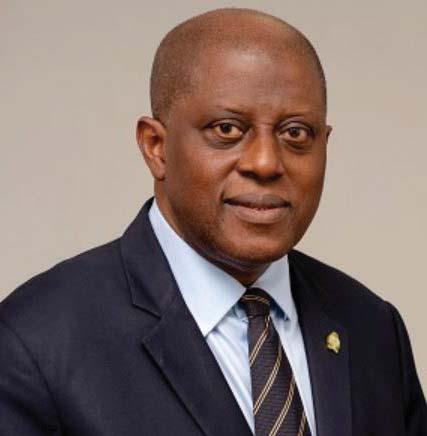
Apart from this, they stressed the need for all Nigerians to change their habits which favour the importation of goods and services, to the detriment of local initiatives.
This position also re-echoed the call by the National Coordinator and SecretaryGeneral of the Nigeria Farmers Group and Cooperative Society, Retson Tedheke in 2016, when he suggested a radical shift in Nigerians’ ways of life as a panacea to a similar problem of dollar shortage in the country.
According to him, “Our continuing national bad habits of dependence on importations, seeking miracles rather than hard work, ignoring all viable revenue alternatives for only crude oil, promoting religion rather than education, building mega-churches and mosques rather than mega-factories. mega-schools and empowering looters, criminals, bigots, tribalists, and illiterates who go on to become our political leaders is coming home to hurt us all.”
His suggestions include the urgent need to feed the people and become a net exporter of food; refine enough petroleum products for the Nigerian market and become a net exporter of finished products; begin the processes of educating the people on the importance of the Nigerianisation of the economy in all aspects; be prepared to subsidise local production, local manufacturing, local consumption, and local industrialisation and be ready to damn the consequences and impose currency as well as capital
control.
Calls by financial industry analysts for the authorities to put more effort into increasing foreign exchange accretion as a sure way of halting the current pressure on the naira was underscored by the Central Bank Governor, Yemi Cardoso’s recent explanation while briefing the national assembly on the situation.
Insisting that the genuine issue impacting the exchange rate is the simultaneous decrease in the supply of, and increase in the demand for, US Dollars, Cardoso painted a rather pathetic picture of the insatiable appetite of Nigerians for imported goods and services and the corresponding pressure of the nation’s external reserves.
Cardoso lamented that based on the CBN’s publicly available Balance of Payments Statistics, between 2010 and 2020, foreign education expenses amounted to a substantial $28.65 billion, while medical treatment abroad incurred around $11.01 billion in costs during the same period.
“Consequently, over the past decade, foreign exchange demand for education and healthcare has totalled nearly $40 billion. Notably, this amount surpasses the CBN’s total current foreign exchange reserves,” the apex bank governor said.
According to him, Personal Travel Allowances accounted for a total of $58.7 billion between 2010 and 2020, adding that between January and September 2019, the CBN disbursed $9.01 billion to Nigerians for personal foreign travel.
He maintained that Nigeria’s annual imports, which require dollars for payment, amounted to $16.65 billion in 1980 and that by 2014, the annual import expenditure had significantly surged to $67.05 billion although it gradually decreased to $54.71 billion as of 2023.
To complicate the matter, food imports, according to his figures, escalated from $2.63 billion in 1980 to $14.84 billion in 2019.
“In 1980, more than 75 per cent of the vehicles used in Nigeria were domestically produced by companies like Volkswagen in Lagos, Peugeot in Kaduna, and others.
Presently, over 99 per cent of the cars driven are imported, necessitating dollar payments.
“Similarly, in 1980, the majority of the clothing worn was sourced from Nigerian textile mills in Funtua, Asaba, Kano, Lagos, and various other towns and cities. Today, nearly all the clothing worn is made from imported fabrics,” the governor stated.
According to him, given the substantial demand for education, healthcare, professional services, personal travel, and similar needs, the exchange rate is bound to face ongoing pressure.
He maintained that to bolster the inflow of US Dollars into a country, the economy must “earn” these dollars through exports, whether oil or non-oil or by attracting foreign investments.
To fully understand the current dollar scarcity, Cardoso said that in 1980, Nigeria’s import expenditure stood at $16.65 billion, while its exports amounted to $25.97 billion, resulting in a surplus of $9.32 billion.
According to him, during that year, Nigeria managed to fulfill its demand for US Dollars from its existing supply and still had over $9 billion in surplus.
He said, “In such a situation, the exchange rate (the value of the US Dollar) would not increase because, similar to any commodity, its supply surpassed the demand.
“Moreover, from 2003 to 2013, Nigeria experienced a surplus of $331.73 billion in the economy, with oil exports alone contributing over $798 billion.
“This surplus of dollars would typically stabilise the exchange rate, leading to a “strong” Naira.”
He regretted that over the past 12 years, oil exports, constituting over 90 per cent of the foreign exchange earnings, have declined from $93.89 billion in 2011 to $31.4 billion in 2020.
Analysts including former President Olusegun Obasanjo believed with the opaqueness of the management of the nation’s oil resources coupled with the high level of theft that has made it difficult for Nigeria to meet the OPEC quota, the nation was programmed to experience foreign exchange crisis.
In a message read on his behalf at a book launch in Abuja at the weekend, Obasanjo stated that one of the reasons why Nigeria’s economy is in ruins is that while other oilproducing countries have records of their oil production, Nigeria cannot account for hers due to theft.
CardosoAnalysts at FBNQuest, the asset management subsidiary of FBN Holdings Plc, have stated predicted robust market yields throughout the year on the back of sustained tight monetary policy by the Central Bank of Nigeria’s (CBN).
In its Economic Outlook Report, FBNQuest said despite prevalent economic challenges, it is optimistic rabout the financial landscape, emphasising the potential for sustained high yields amidst prevailing market conditions.
“Market yields are expected to remain high this year, despite the current economic
challenges. This is due to factors such as the tight monetary policy that the CBN is expected to sustain, as well as a sizable supply of Federal Government of Nigeria paper, which will be driven by domestic borrowings of around N6.1trillion, “they said.
Head of Equity Research at FBNQuest, Tunde Abidoye, stated: “Despite the myriad headwinds confronting the economy, such as low-singledigit GDP growth, high inflation rates, and downward pressure on the naira exchange rates, the Government’s steadfast commitment to policy reforms holds the potential to yield favorable
economic outcomes.”
He said the proposed tax reforms’ implementation is poised to incrementally elevate non-oil revenue from its current sub-5 per cent of GDP to the high single digits. Ultimately, this trajectory aligns with the Federal Government’s medium-term objective of reaching 8 per cent non-oil revenue as a proportion of GDP.
“We need strong policy interventions and concerted efforts to strengthen tax compliance and encourage investments, especially at the base level, for increased business productivity and sustainability, “he added.
Ugo Aliogo
Associate Director, Infrastructure Advisory, KPMG, Olasunkanmi Odede, has stated that tackling the current insecurity crisis in the country would be an effective measure in resolving food inflation, noting that based on statistics, food prices have increased as much as almost 50 per cent in the last eight months since the present administration came into power.
Odede, who disclosed this at the KPMG Audit Committee Seminar in Lagos, said when the issue of insecurity is addressed, farmers can go back to the farm, to produce enough food, and then government can begin to solve the logistical issues of getting food from the farm.
He remarked that another issue the federal government needs to address is the rising cost of inputs, adding that some of them are indexed to the US dollars, which links back to the exchange rates, “So, it is a component of fixing insecurity and tackling the exchange rates.”
He hinted that if government is able to address the problems of forex and insecurity and other minor issues, the economy would be fine from an inflation perspective.
Odede remarked that inflation would still be high, stating that there are no hopes that the inflation rates might drop anytime soon, he however disclosed thatby Q3, or Q4, the economy is going to see some
The Chairman, Seaport Terminal Operators Association of Nigeria (STOAN), Mrs Vicky Haastrup has been appointed as the Patroness of the Customs Officers’ Wives Association (COWA).
Haastrup’s investiture, along with the investiture of three others appointed as Patrons of the association, was held on Thursday 15th February 2024 in Abuja during the relaunch of COWA.
COWA President, Kikelomo Adeniyi, said Princess Haastrup was honoured with the position of Patroness of the association in view of her outstanding contributions to the Nigerian economy especially through the maritime sector and her support for the cause of women.
Speaking during her investiture, Princess Haastrup, who is also the Executive Vice Chairman/CEO of ENL
Consortium, thanked COWA for the honour of appointing her as the Patroness of the non-governmental organisation.
She commended the COWA President for relaunching and breathing new life into the association.
She also commended the Comptroller-General of Customs, Adewale Adeniyi for supporting the resuscitation of COWA after an eight-year hiatus.
She said, “The theme of this event — COWA 2.0: Shared Values, Integrated Community is apt. The theme denotes a rebirth and the institutionalisation of a more advanced version of the original concept of COWA. It means you plan to do something different and impactful. This is good and must be encouraged.
“I thank the ComptrollerGeneral of Customs, my dearest
sort of a decline.
According to him, “The truth is that it will take time for the efforts of government to come to fruition. One of the things that the Central Bank of Nigeria (CBN) is doing, which we saw last week was the increase in Treasury Bills and that was done just to be able to reduce the money supply in the economy.
“The CBN MPC meeting which is coming up soon will give another clarity on the direction of the economy and the interest rates which obviously might have some impacts. Because the inflation in Nigeria is not technical. It is not an interest rate driven inflation. It is more of a cost increase inflation and largely food driven.”
brother Wale Adeniyi, for supporting the cause of women. Thank you for giving your wife the platform to contribute to national development. Your predecessor, as you know, decided to keep COWA in the cooler, but I am happy that you are towing a different path.
“I am a strong advocate of women education and empowerment, so the objectives of COWA resonate strongly with me. You have heard it said again and again that when you train a woman, you train a nation. This is a time-tested truth because when a woman is educated, she becomes empowered to change not only her own life, but also the lives of those around her: her children, her family, her friends and her community. Give a woman quality education and watch how she’ll quickly influence the broader society,” she said.
Emma Okonji
Following the establishment of the Nigerian Data Protection Act (NDPA) into law in June 2023, which seeks to protect personal data in the Nigerian business sphere, with strict adherence to robust regulations, Cybervergent, a technology firm specialised in automated cybersecurity solutions, is revolutionising the NDPA compliance landscape.
The company facilitates a seamless on-boarding process,
empowering businesses and organisations to embark on their NDPA compliance journey. This involves automatically uploading essential documents, real-time monitoring through an intuitive AI-automated interface, and consolidating regulatory documents in a secure location.
The streamlined process ensures the safeguarding of customer data and adherence to stringent compliance and security standards.
Addressing the significance of the services, Co-founder
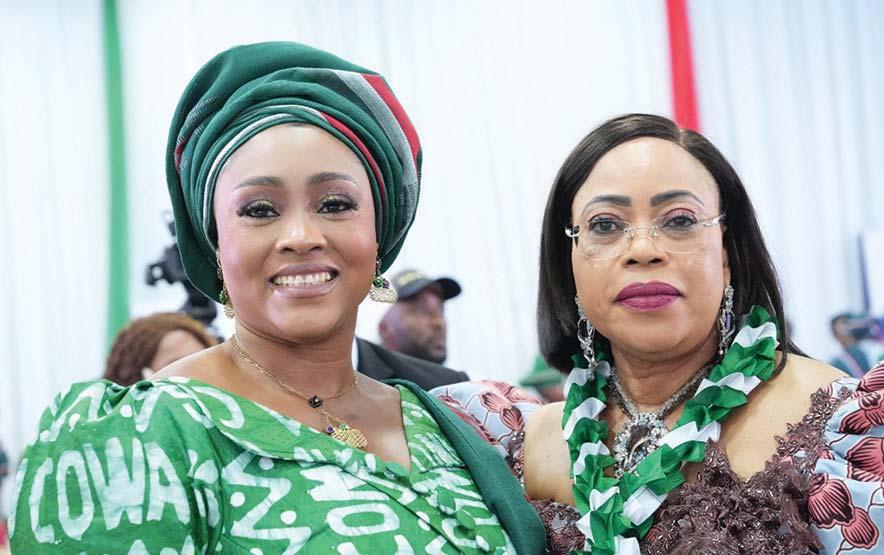
and Chief Executive Officer of Cybervergent, Adetokunbo Omotosho, said: “NDPA compliance is not a choice; it’s an imperative for businesses.
As organisations grapple with aligning with these stringent regulations and the imminent March 15th, 2024, deadline, Cybervergent has proactively introduced an AI-automated compliance platform tailored for corporations of all sizes. This platform serves as a guide, simplifying the intricate journey towards NDPA compliance.”
The price of OPEC basket of twelve crudes stood at $81.30 a barrel on Tuesday, compared with $79.70 the previous day, according to OPEC Secretariat calculations. The OPEC Reference Basket of Crudes (ORB) is made up of the following: Saharan Blend (Algeria), Djeno (Congo), Zafiro (Equatorial Guinea), Rabi Light (Gabon), Iran Heavy (Islamic Republic of Iran), Basrah Medium (Iraq), Kuwait Export (Kuwait), Es Sider (Libya), Bonny Light (Nigeria), Arab Light (Saudi Arabia), Murban (UAE) and Merey (Venezuela).
Capital market analysts have predicted that investors’ profittaking will continue to rock the stock market of the Nigerian Exchange Limited (NGX) this week as stock investors seek policy direction from the Central Bank of Nigeria (CBN) to trigger the positive sentiment.
It was another profit-taking outing last week for the stock market on the back of weak
sentiment which was spurred by higher yields outlook in the fixed-income market as portfolio rebalancing continues ahead of expected 2023 corporate earnings and outcome of the Monetary Policy Committee (MPC) of CBN.
Specifically, the NGX All-Share Index declined by 3.44 per cent week-on-week (W-o-W) to close at 102,088.30 basis points, while the overall market capitalisation lost N1.99 trillion to close the week at N55.861 trillion.
The MPC is scheduled to convene on February 26th and 27th, marking its inaugural meeting for the year and the first for the current CBN governor, following two postponements in the latter half of 2023. This will also be the first session of the newly constituted committee since the change of guard at the CBN.
A group of analysts at Cowry Asset Management Limited said, “we anticipate the bearish sentiment to continue as the market
seek catalyst and policy direction from economic managers to trigger the positive sentiment.
“However, as we anticipate more corporate releases for the final quarter of 2023, investors will begin to rebalance their portfolio in their search for alpha amidst the rising fixed income yields and outcome of the monetary policy meeting. Meanwhile, we continue to advise investors on taking positions in stocks with sound fundamentals.”
Afrinvest Limited said: “in the new week, we expect bargainhunting opportunities to boost market performance.”
Analysts at Cordros Research stated that it expected limited bargain-hunting activity in the near term due to prevailing negative sentiments driven by movements in fixed-income market yields and uninspiring earnings releases. They anticipated a decisively hawkish stance from the MPC
regarding interest rates, aligning with the CBN’s commitment to achieving price stability.
“Our projection is for a significant increase in the monetary policy rate by 150basis points while leaving other parameters constant. The anticipated increase in the policy rate would be in contrast to the prevailing global trend, where many central banks are scaling back on rate hikes and contemplating reductions.
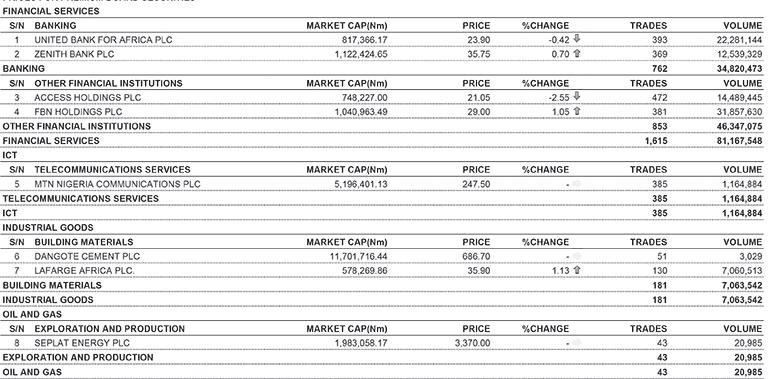
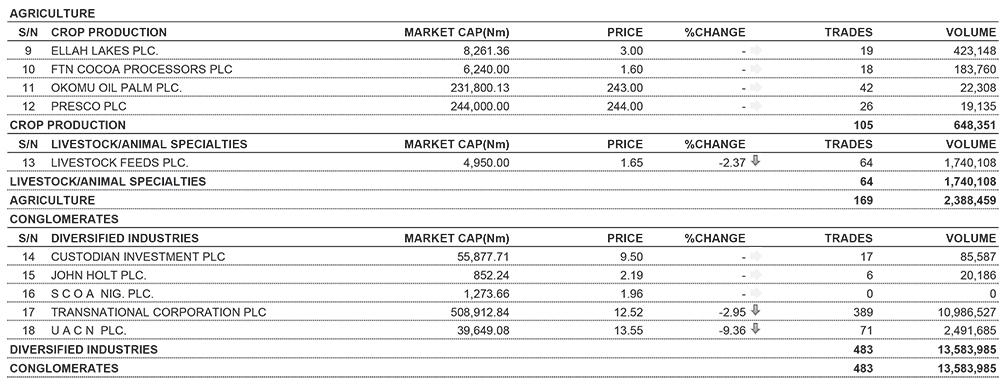
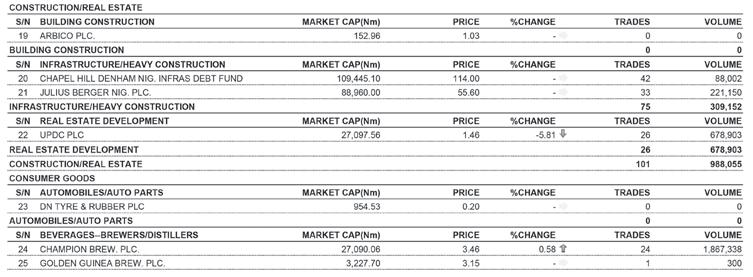
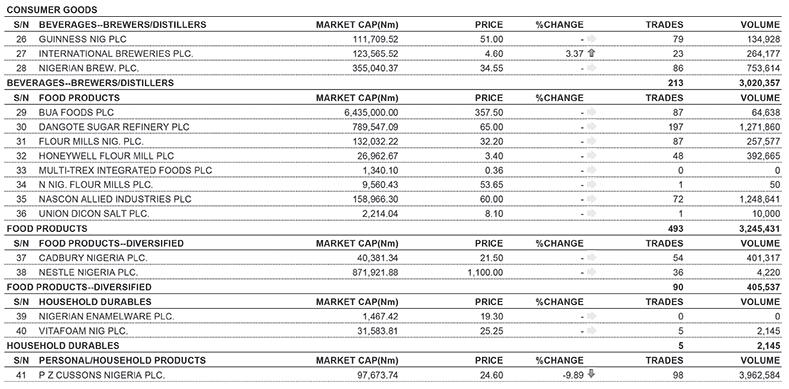



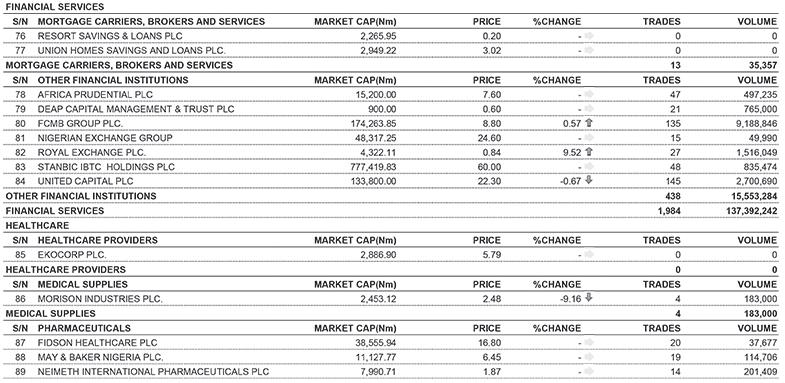
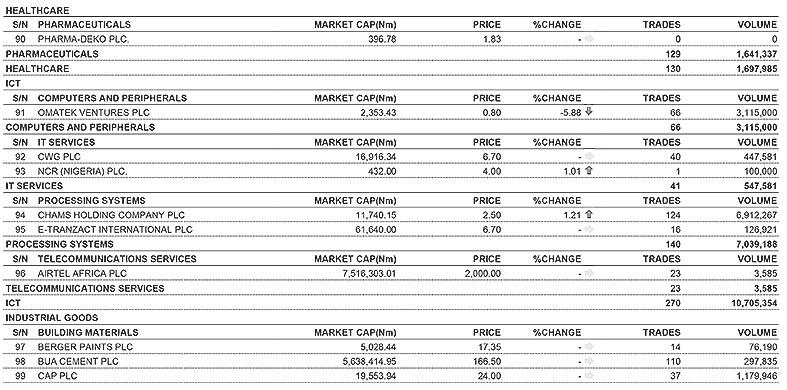
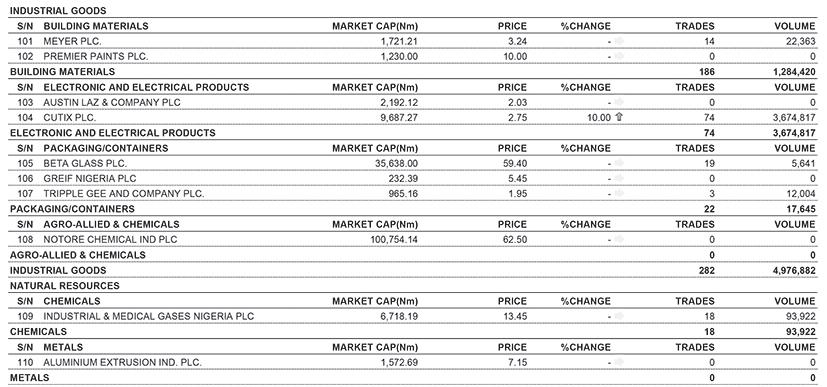
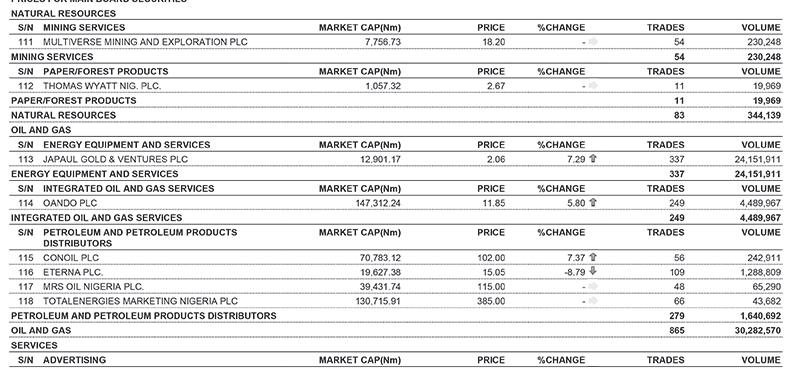
Over the past 20 years, considerable progress has been made in electrifying the world, with the number of people without electricity at home being chopped in half — the most transformative and immediate way of transforming lives. Yet Africa is the exception — when it shouldn’t be.
Today, over 600 million people are without access to reliable electricity on the African continent where electrification efforts haven’t kept pace with population growth.
But blaming demographic pressures for the slow progress is way too easy. It’s time for collective responsibility and collective action. An unplugged continent is our last great obstacle to realizing our promise of a world with electricity for all.
In Nigeria alone, over 85 million people —more than 4 out of 10 Nigerians— are deprived of electricity. My trip to Abuja earlier this month reinforced what I already knew: the paradox of energy poverty in a land of plenty. Nigeria, an economic powerhouse with huge solar potential, has the largest electricity access deficit in the world. A shocking reality for a country beaming with energy.
And even those connected to the grid face frequent power outages, at a huge cost for society and the economy. Without the lifeblood of electricity, entire communities struggle to preserve crops, irrigate their fields, engage in economic activities, run health clinics, or allow children to study or play in decent and safe conditions. All of this creates a ripple effect that threatens the very foundation of healthy, prosperous, and resilient societies.
My time in Abuja also convinced me that Nigeria can show the way to electrifying Africa. Why? Because Nigeria’s transformation has already begun – with every new household connected to electricity a small victory.
At the World Bank, we have bold plans for Nigeria —and the rest of Africa.
Just recently, we have launched a groundbreaking program called DARES (Distributed Access through Renewable Energy Scale-Up), which will provide access to clean and reliable energy to 20% of the unelectrified and over 200,000 Micro, Small and Medium-sized Enterprises (MSMEs) by 2030 through private sector interventions. To create the conditions

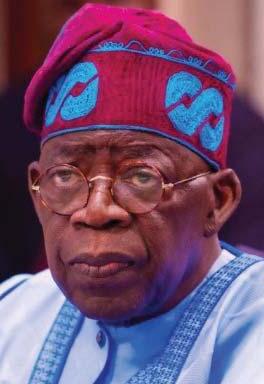
for even greater victories, we are working closely with the Nigerian authorities on grid reforms and sector performance improvements.
Governments, starting with Nigeria, need to take the lead in jump-starting the clean energy revolution through reforms and stable policy and regulatory frameworks, supported by concessional finance that can attract big amounts of private finance. DARES specifically prioritizes affordability, by providing highly targeted subsidies to populations that need it most; sustainability, by linking access solutions to productive uses of electricity; and scalability, by catalyzing upfront private investments and accelerating the deployment of mini grids and standalone solar solutions.
Most importantly, this project holds potential for broader development across Africa. Connecting people in Nigeria is just the tip
of the iceberg. Key components of DARES, such as affordability, sustainability, scalability, and regional cooperation, are the much larger submerged parts of the energy access challenge – elements which, I’m convinced, require far-sighted strategies, adaptive crosssectoral government programs, and replicable regional approaches to fulfill our pledge to connect at least 200 million additional people to electricity in Africa by 2030 (100 million in Eastern and Southern Africa and 100 million across West and Central Africa). Affordability is the key that unlocks the full transformative potential of electricity for development. Electricity cannot be reserved for those who can afford it. Closing the electricity gap cannot deepen existing inequalities. Instead, it should empower people, boost economic growth, and improve health and
educational outcomes. Innovative schemes like “Pay as you Go” plans for solar energy can help close the affordability gap for end-users. And targeted measures and incentives designed to increase the productive use of electricity will lead to increased demand and further investment in improving electricity quality and affordability, thus creating a virtuous cycle.
Sustainability involves a combined focus on deep sector reforms and productive use of electricity that will progressively break the cycle of reliance on public money and government subsidies. A future where energy access will not be a handout, but a self-sustaining driver of progress and prosperity.
Finally, scalability means that every penny of public finance dedicated to energy access can also serve as a launchpad and catalyst for private enterprise and investment, maximizing the leverage of limited public funds.
In a context where energy resources are abundant but heavily concentrated, and the upfront investments needed to develop them exceed the capacity of national power markets, thinking regionally is the way forward.
The integration of countries’ power systems can help grow exponentially affordable and sustainable power supply from the sunbelt in the Sahel, the water towers in Ethiopia, Guinea, and the Democratic Republic of the Congo, and the geothermal and wind farms in Kenya – a few examples I find so promising.
But regional integration is not only about building physical cross-border infrastructure. It requires countries to cooperate in building open and competitive regional power markets. It requires stronger utilities trading power on regional markets. The results can be transformative and are already apparent as power pools expand across the continent.
Closing the energy access gap is not an impossible feat. With the cost of renewable energy falling over the past 10 years, we are closer than ever. But we can’t go into it halfway. It will take bold policy reforms, groundbreaking innovations, and massive investments in clean, affordable, and reliable sources of energy. Only then can we truly envision a green future for all.
•Anna Bjerde is the World Bank Managing Director for OperationsChuks Okocha in Abuja
A former Attorney-General of the Federation (AGF), Dr Kanu Agabi, has said if not for the interventions of the courts at different times, the country would have long disintegrated.
He however noted that the nation’s judiciary was better than the legislature and the executive put together, stating that it was the best best arm of government in the country.
Agabi stated this in Abuja on Saturday, at a book launch entitled: “Court and Politics” authored by Dr Umar Ardo, the former Special Adviser on Research and Strategy to former Vice-President, Atiku Abubakar.
According to Agabi, “I wish to say that speaking for the judiciary, we have a good judiciary, our judges are competent, it doesn’t mean that every one of them is good, there may be one or two here and there who are failing.
“There’s no system that is perfect, but of the three arms of government, the best arm is the judiciary. The judiciary is better than the legislature. It is better than the executive.
“Had it not been for the judiciary, this country will long have disintegrated. It is true. I’ve been a lawyer for 51 years. I work in the courts. I’m not an arbitrator. I don’t work for banks. I don’t sell land.
“I work in the courts, and when I tell you that the courts have saved this nation, please believe it,” he said.
Agabi said Nigerian judges should not be blamed for the inconsistencies in judgments, stressing that the laws should be blamed rather.
The former Minister of Justice, who recalled that he was one of the lawyers that worked for one of parties in one of the 11 cases Ardo mentioned in his book, commended the courage and perseverance of
the author, saying justice was according to law, not at random.
“I give you a typical example in election matters. The grounds must be consistent. If the grounds are inconsistent with one another or inconsistent with the relief, such a petition will fail.
“I did the petition recently where the grounds were inconsistent with one another and inconsistent with the reliefs.
“And Court of Appeal said, well, such a petition is speculative and ought not to be held. That’s the law.
It’s not the fault of the judges, and it makes sense,” he said.
Agabi said the reason the courts were congested was because people had filled a number of speculative and frivolous actions with the hope that they could manipulate the judges.
“Sometimes they tire the judges and succeed. More often than not, they fail. It is not because the judges are corrupt or because they’re incompetent. No, it’s the law. The law is set to be dynamic because of the lack of experience, we go on changing them,” Agabi said.
A former national chairman of the PDP, Uche Secondus, called for a judicial reforms into political activities as elections ought to be through voting by the people, but lamented that the courts now determine victors at the polls and not the courts.
“This calls for national discourse. The actions of courts is becoming worrisome to electoral activities. They have consequences. Recall the action of the supreme court in the case of Emeka Ihedioha in Imo State, where the fourth person became the winner of the election,” he said.
Michael Olugbode in Abuja
Operatives of the National Drug Law Enforcement Agency (NDLEA) have begun to unmask members of an organized criminal network behind the recent importation of two containers laden with illicit drugs as well as assorted arms and ammunition from Durban, South Africa, to the Tincan Seaport in Lagos.
A press statement on Sunday by the spokesman of the anti-narcotics agency Femi Babafemi said among those already arrested as members of the syndicate are: a clearing and notify party of the two containers, Falowo Kayode; a dock worker, Anjorin Idowu and Uzairu Iguda who is in charge of the five-star terminal at the port. Another dock worker at the terminal, Mohammed Sule
(alias organizer) who is equally linked to the syndicate is currently at large.
Babafemi said based on credible intelligence, the agency had requested for a 100 percent joint examination of two containers marked MSCU 4581770 and TRHU 7968071 from South Africa.
As a result, the exercise was conducted with other stakeholders on 18th and 19th of January, 2024, during which 56.39 kilogrammes cocaine and 795 kilogrammes Colorado, a synthetic strong strain of cannabis, among other illegal items, were recovered from the containers.
He said following a tasking order by the Chairman/ Chief Executive Officer of NDLEA, Brig Gen Buba Marwa (Retd) to a combined team of specialized units of the agency to unravel those behind the importation of the large consignments of the illicit drugs, ongoing
investigations have led to the discovery of more bags of Colorado weighing 192.7 kilogrammes, a pistol, and rounds of ammunition removed from the container, MSCU 4581770 and hidden in an empty container before the 100 percent joint examination at the five-star terminal.
He said as a result, two suspects: Uzairu Iguda who is in charge of the terminal’s container positioning and stacking, and Anjorin Idowu who is a dock worker in the terminal were arrested.
Another suspect, Mohammed Muktar Sule (alias organizer), now at large, is also a dock worker in the terminal. Investigations revealed that the three suspects conspired with the agent and notify party, Falowo Kayode, to remove the 192.7 kilogrammes Colorado, pistol and rounds of ammunition from the container to an empty container in the terminal.
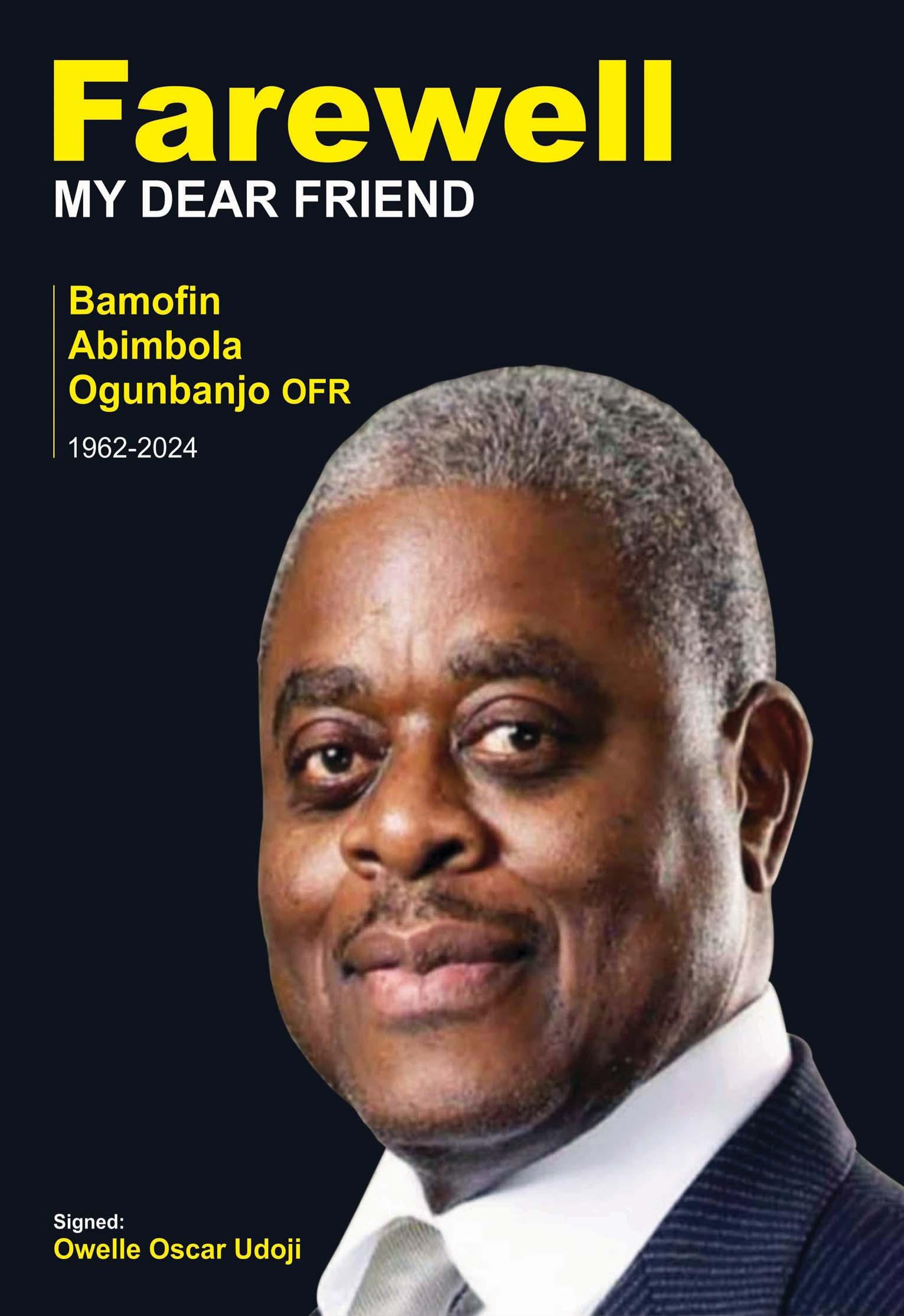
www.thisdaylive.com

Monday
February

opinion@thisdaylive.com
Democracy has given thieves and fraudsters important government function, argues O JASON OSAI
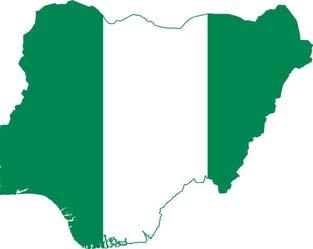
See page 21
PUBLIC EXPENDITURE AND THE ECONOMY
FELIX OLADEJI argues for less government participation in economic activities
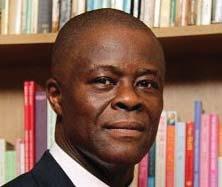
EDITORIAL
THE TRAGEDY AT IFE VARSITY ZOO

ANSELM ODINKALU
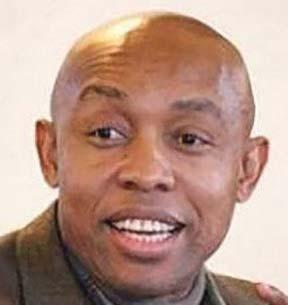
As Nigerians prepared for the holiday season to end 2023, the National Assembly in Abuja on 21 December hurriedly undertook and voted through the confirmation of 11 nominees for appointment to the Supreme Court. The installation of the new Justices in this elevated judicial role was delayed as the Supreme Court worked to wind down the appellate season on petitions from the 2023 election season, some of which challenged decisions involving some of the new nominees to the Supreme Court.
On 26 February, 2024, the Chief Justice of Nigeria (CJN), Olukayode Ariwoola, will administer the oaths on the 11 new Justices of the Supreme Court. This represents the largest single complement of new intake onto the bench of the court, beating the previous high water mark of eight justices who took their seats on the court in November 2020. It will also mark the first time in its history that the court will have the full complement of 22 Justices (21 Justices and the Chief Justice) as provided by Nigeria’s 1999 Constitution.
This situation will not last long though. If the court is not to suffer depletion in its numbers again, attention will have to be paid to the factors that got it to where it has been to begin with.
Nineteen months after swearing in the eight new Justices of the Supreme Court in 2020, Ibrahim Tanko Muhammad abdicated as CJN, toppled in an unprecedented mutiny against what clearly was an extreme case of judicial mal-administration, if not malfeasance. He was the second CJN to be forced out of the office for being blemished unlike Caesar’s wife. The avoidable and premature loss of two Chief Justices in less than three years is not just careless; it is a pathology.
But this was not the only reason why the court was run down in both the numbers of its Justices and in its institutional reputation.
Ten months after his swearing in as a Justice of the Supreme Court, Samuel Oseji died in September 2021. Six months earlier, Sylvester Ngwuta, one of the senior-most Justices on the Court, had died in March of the same year. Some 22 months after the passing of Justice Oseji, Chima Nweze, another Justice of the same court, died at the end July 2023. That brought to three the number of Justices of Nigeria’s Supreme Court who had died over a period of 27 months.
It is the case that an overwhelming majority of those who rise to become Justices of the Supreme Court in Nigeria get there north of the average life expectancy for the country. That notwithstanding, it remains the case that a situation in which the country suffers the death of a Justice of the Supreme Court at an average rate of one every nine months is a symptom of workplace dysfunction of the most morbid kind. The court must look at how it replaces departing Justices and even more at how it organizes and manages both work and
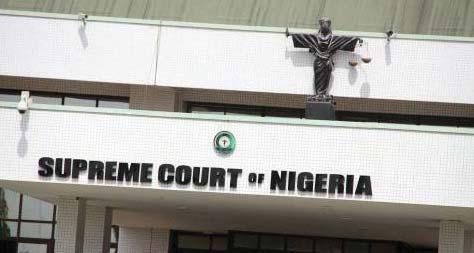
wellbeing among them.
Let’s begin with replacement and appointment. Over the next three years, the court is guaranteed to lose at least five of the current complement to natural attrition. Chief Justice Olukayode Ariwoola will retire in August this year. In September 2026, Justice Ibrahim Mohammed Saulawa is due to retire to be followed in quick succession by Uwani Abba Aji two months later; Helen Ogunwumiju in March 2027 and Jonah Adah three months later.
These appointments to the Supreme Court will be the first since 2020. The only new appointment of any significance affecting the court was the replacement of Chief Justice Tanko Muhammad by the current incumbent in 2022. Indeed, no vacancy has been filled on the court since the resignation of Sidi Bage in March 2019 to become the Emir of Lafia. Since then, in addition to the Justices lost to death, at least seven other Justices have retired from the court. There is no excuse for the delay and dithering that has followed in the wake of those retirements.
At least two successive attempts to appoint Justices before the latest were aborted because of low politics unbefitting of both the process and of the institution of the Supreme Court. It is to be hoped that the process of judicial elevations to the Supreme Court bench will become more transparent and less prone to base politics of the sort the court has recently endured. That will guarantee that replacements are both timely and fit for purpose.
Next is health and wellbeing on the court. Anthonia Ochei reports that “although retirement and resignation are reasons for which a judicial officer may leave active service, more often than not, justices of the Supreme Court have been forced to leave office as a result of ill health that have most times resulted in death.”
For most of the past decade, Nigeria’s Supreme Court has laboured under a crippling burden of case work matched by an equally crippling loss of judicial personnel. These two trends may be related.
The Supreme Court is overwhelmingly a court of last appellate instance. It receives a few cases in its original jurisdiction as the only court empowered to decide disputes between states of the federation or between states and the federation.
The doctrinal position of the court to date is
essentially that it has no control over the appeals that can be filed with it. Under the constitution, all persons under a penalty of death are entitled to appeal to the Supreme Court. No one could possibly quarrel with this.
Appeals also go to the Supreme Court in relation to disputes concerning presidential and governorship elections. A majority of voters in Kano and Plateau States will agree with this, surely. These account for only a fraction of the appeals that currently burden the dockets of the Supreme Court but for an inordinate proportion of judicial stress because they all get priority and must be decided on a short judicial calendar.
Litigants who have appeals on questions of law arising from decisions of the Court of Appeal can also proceed to the Supreme Court, irrespective of how trifling it may be. Last September, retiring senior Justice, Amina Augie, complained about how the court once sat on an appeal from a State in a case involving 12 burnt goats. A case of 12 goats could, nevertheless, raise legal issues of extraordinary significance although that does not appear to have been the case if it was the source of complaint in the court’s conference, as the retiring Justice reported. The dockets of the court are overrun by interlocutory appeals.
Supreme Court Justices insist that they can only be saved by a constitutional amendment limiting the kinds of cases that end up on their dockets. Such an amendment may no doubt help but the Justices are not as helpless as they imply. Better court administration can help. Fuller digitization of the court and its library could also assist with speed of judicial conferencing, court administration and decision making. Properly administered judicial clerkships can relieve the Justices of some of the tedium of research and writing. And they can also interpose by doctrine or rules a summary procedure (without the need or necessity for hearing) for appeals that are clearly without bases or justification other than attrition or time wasting.
It is courteous to wish the new Justices credible and successful tenures as Supremes but that wish can only come to fruition in a court that is administered humanely and is not in deficit of public trust. On both counts, Nigeria’s Supreme Court currently has a lot of work to do.
A lawyer and a teacher, Odinkalu can be reached at chidi.odinkalu@tufts.edu
Email peter.ishaka@thisdaylive.com

OAU could do more by a thorough investigation of the incident
ccustomed as Nigerians increasingly are to tragedies, the mauling to death of a zookeeper by a lion at the zoological garden of the Obafemi University [OAU], Ile Ife caused shock all across this country. A statement by the University’s spokesman, Abiodun Olarewaju said the victim, Olabode Olawuyi, was a Veterinary Technologist who had been in charge of the zoological garden for over a decade. Olawuyi was said to be feeding the lions when one of them, a nine-year-old male,
the incident were said to have done everything they could to rescue the victim but with little success. That the medical emergency couldn’t save Olawuyi was not surprising because to be attacked by a nine-year old male lion is about the worst encounter anyone could have with a wild animal.

posted the gruesome video of Adewuyi on social media after the attack.
. However strong the bond they appear to have built with their human caretakers, the wild and killer instinct in lions can easily be brought out due to stress, sickness, fear and, most especially, hunger
zookeepers have been mauled by wild animals in Nigeria. A few years ago, a similar incident happened at the small holding den at Kaduna’s Gamji Park. A zookeeper was mauled and, although he was rushed to hospital, he did not survive. Three decades earlier, there was an incident at Jos Zoo when lions pounced on their keeper and mauled him to death. In that Jos incident, the reason was clear: the zoo was starved of funds and the lions had not been fed for 10 days. The zookeeper, who had been feeding them for many years, usually drove the lions to a corner, cleaned the den, supplied their food and then allowed them back in. When he did not supply food after cleaning the dens for 10 days, the lions pounced on him.
of what happened to the BBC. He said the incident happened while the zookeeper's female colleague was feeding the lion. Because one of the entrance doors to the den was not properly of its enclosure and attack the unnamed female zookeeper. That was what promoted Olawuyi to jump into the den. While he successfully rescued the woman, according to Olarewaju, the lion attacked him in the process. We expect OAU authorities to undertake a full investigation into It is important to know what exactly transpired so that all other facilities, private or public, academic or commercial, that hold wild animals anywhere in the country would learn valuable lessons. The
DIRECTOR, PRINTING PRODUCTION CHUKS ONWUDINJO
TO SEND EMAIL: first name.surname@thisdaylive.com
Only a full investigation will reveal what happened at Ife, but it is curious how and why Olawuyi or the unnamed lady came into direct contact with the lion. Even though we often see online videos of huge lions that have been tamed in South African and Botswanan parks, where humans play and roll around with them, it is a very dangerous practice that should never be encouraged here. Besides, it must be assumed that the animals are well taken care of in those parks. However strong the bond they appear to have built with their human caretakers, the wild and killer instinct in lions can easily be brought out due to stress, sickness, fear and, most especially, hunger.
While we commiserate with the family of on this tragedy, we urge them to properly study and publicise what actually happened so that zookeepers and others who rear dangerous pets all over the country will learn valuable lessons.
Letters in response to specific publications in THISDAY should be brief (150-300 words) and straight to the point. Interested readers may send such letters along with their contact details to opinion@thisdaylive.com. We also welcome comments and opinions on topical local, national and international issues provided they are well-written and should also not be longer than (750- 1000 words). They should be sent to opinion@thisdaylive. com along with photograph, email address and phone numbers of the writer.
resembles a small wooden canoe in a mighty ocean—so many forces are against it. Apart from the natural market forces, other its 51 years of existence, the naira has never reached the all-time
The major factors responsible for the high value of the dollar against the naira are the decline in the supply of dollars and a surge in its demand. That means the biggest problem in the Nigerian forex market is liquidity!
tuteness. Therefore, addressing the challenges in the forex market requires a local solution that integrates these three variables harmoniously.
Given that conventional economic strategies have yet to restore the naira to its desired value against the dollar, it's time to incorporate both academic economic theories and practical solutions from everyday individuals. The local solution must address the social and human factors contributing to Nigeria's challenges with the dollar-to-naira exchange rate. Key issues in-
clude the preference for foreign education and medical services among the wealthy and middle class, as well as the widespread preference for foreign goods and services over locally-made products. Encouraging domestic consumption, investing in local industries, promoting education and healthcare reforms, and fostering a sense of national pride in locally produced goods and services could be part of the solution. Additionally, policies aimed at reducing dependency on imports and promoting local entrepreneurship could help address these underlying social and human issues. According to the Central Bank of Nigeria (CBN), between 2010 and 2020, foreign education expenses gulped $28.65 billion, while a whopping $11 billion was spent on medical treatment abroad within the same period. Focusing on exportable agricultural products is indeed a viable long-term strategy to address the volatility in the forex market. Nigeria possesses a rich diversity of agricultural commodities such as cocoa, cotton, gum Arabic, hibiscus, beans, garlic,tial. A strategic approach would involve selecting 5–10 of these agricultural products for intensive cultivation, processing, and standardisation within a year, with the aim of boosting export volumes and earning foreign exchange. This initiative could not
only contribute to stabilising the forex market but also stimulate economic growth, create jobs, and enhance the country's agricultural value chain. This, if done well, will bring good dollar
The Central Bank of Nigeria has become the focal point of both high activity and criticism within the Nigerian governthe subsequent rise in commodity prices, particularly those reliant on imports. The CBN is forced to take some short-term steps, make hard decisions, and even churn out two to three new policies in a day. This is because something was missing before the naira was thrown out to survive on its own.
of economic development and the presence of robust institu-tems, strong institutions, and the ability to respond to market dynamics swiftly. Without these foundational elements in place,nomic instability.
Zayyad I. Muhammad, Abuja
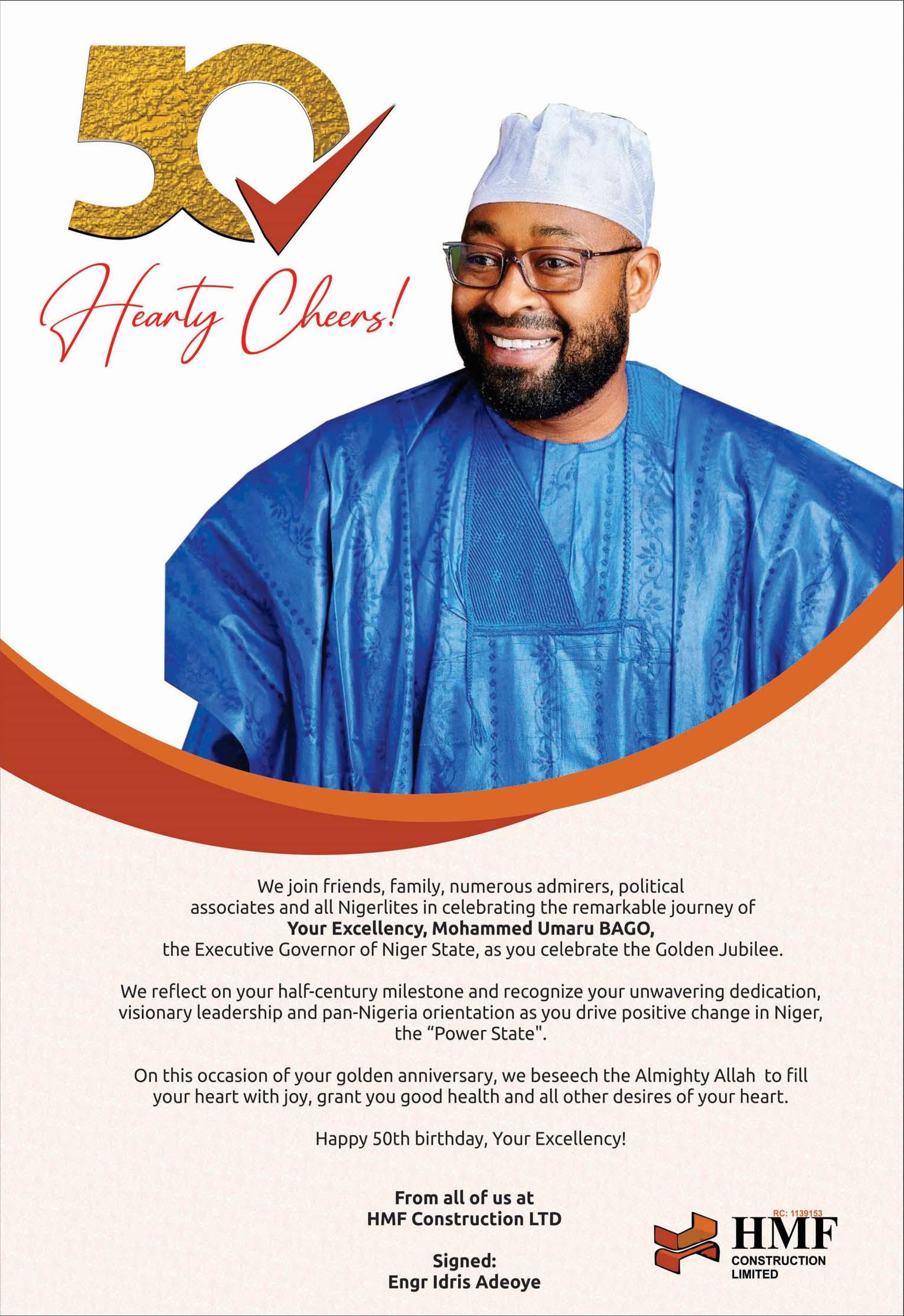
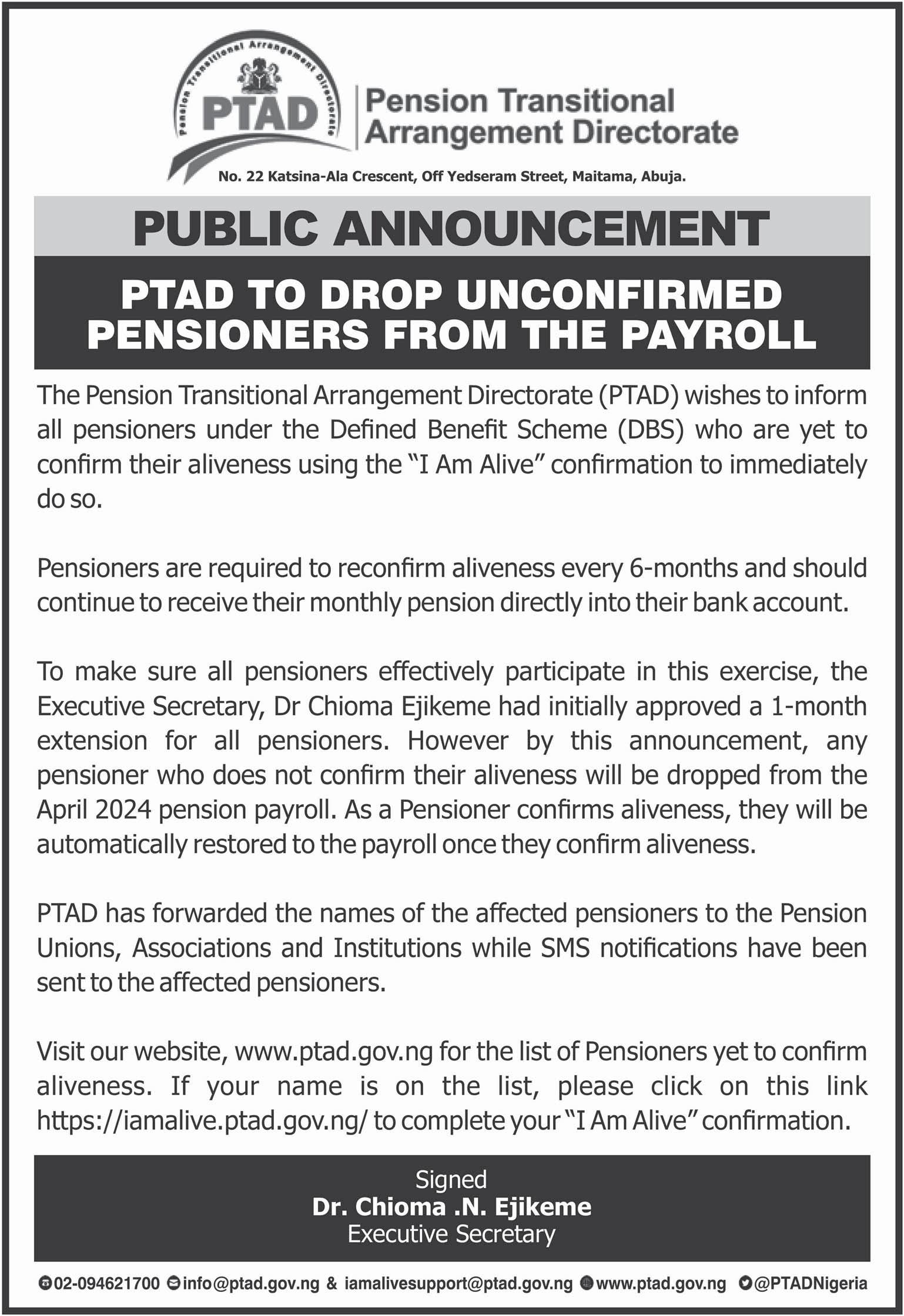
Two years ago, President Vladimir Putin pushed Russia to launch a war of aggression against Ukraine, challenging Ukrainians’ “aspirations for a better future and for getting closer to the EU.” The European Union believes it was an attack “not just against Ukraine, but against freedom, self-determination, and democracy.”
Yet, Ukraine has demonstrated “remarkable resilience in the face of this brutal” attack, with the EU noting that this is about the “strength of a nation fighting for its rights and aspirations. Ukraine’s resistance today stands as a beacon of hope for freedom-loving people everywhere.” The conviction remains unwavering that “Ukraine will prevail,” with Europe standing by its side as long as it takes. “Ukraine has proven the power of a nation and a people fighting for something. For themselves first and foremost. But also for us and for everything that we believe in. Our freedoms, our democracy, our hard-fought rights and aspirations. Some were surprised by Ukraine’s heroic action. But no one should have been surprised that when faced with oppression, subjugation and tyranny, they chose resistance,” said Ursula von der Leyen, President of the European Commission.
To mark the second anniversary of the ongoing Russia-Ukraine war, on February 24, European (Austria, Belgium, Bulgaria, Czech Republic, Denmark, Germany, The Netherlands, Romania and Sweden) ambassadors to Nigeria in this interview talk about Russia’s “unprovoked and unjustifiable aggression” against Ukraine, reiterating their determination to stand by Ukraine “every step of the way.” Excerpts:
Why should we in Nigeria care about Russia’s war against Ukraine?
Countries have agreed on rules of engagement for the benefit of their citizens. The United Nations (UN) Charter provides a clear framework aimed at preserving peace. This includes respect for the sovereignty of a country, whether a neighbouring country or a country further away. Russia’s war against Ukraine goes against international agreements and the United Nations Charter. The illegal Russian invasion of Ukraine creates a dangerous precedent for the rest of the world. Sovereignty and territorial integrity are the cornerstones of international order. Russia undermining Ukrainian sovereignty undermines the international institutions we have built together.
Russia’s unprovoked invasion of Ukraine has also disrupted global food and energy markets. Ukraine is among the world’s most important grain producers. The illegal Russian invasion has severely affected Ukraine’s production and export of grains, leading to higher prices worldwide. European countries and Ukraine are working together to keep global food prices stable by protecting the production and export of grain to countries, particularly on the African continent, for instance through ‘Solidarity Lanes’ and the Black Sea Corridor.
On this day, we mark a tragedy and a serious violation of international law. It has been two years since the full-scale illegal Russian invasion of Ukraine. Two years in which Ukraine has been defending its citizens, its schools and hospitals, its waters, its industries and its independence with tooth and nail. Two years of too many lives lost and too much pain endured.
We are aware that there are more conflicts happening in the world and that people are suffering in various places. We support a just international order where people anywhere can benefit from peace, stability and prosperity, in Europe, Africa or elsewhere. With geographical distance, there is the risk of information being lost. So today, while we stand together on a day we wish we didn’t need to commemorate, we would like to share more information on questions we often get.
Are European countries prolonging the war in Ukraine by sending weapons to Ukraine?
Our countries are not at war with Russia. Our countries support Ukraine with weapons because it has the right to defend itself. Russia attacked Ukraine without justification, violating international law and the UN Charter. Since its illegal invasion of Ukraine’s Crimea peninsula in 2014, Russia has breached almost 400 international treaties. Ukraine has the right to defend itself. Russia can end the
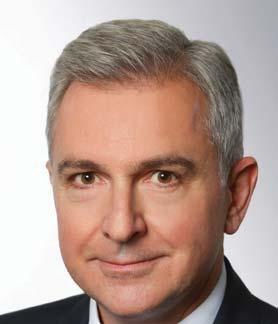
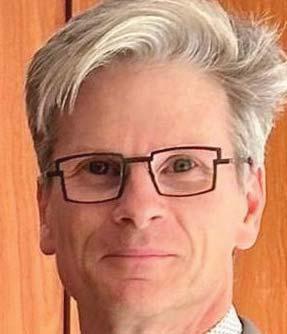

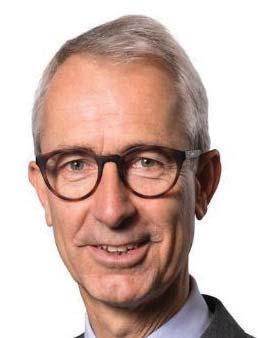
war at any time and withdraw from Ukraine. For Ukraine however, an end to its defense would mean the loss of its territory and the oppression of its population. Not supporting Ukraine would mean accepting Ukraine to fall under Russian submission.
Why are Ukraine and Europe not negotiating with Russia?
Ukraine and our countries are always open to negotiations. Ukrainian President Volodymyr Zelenskyy has put an offer for sustainable peace on the table with his 10-Point Peace Plan, but Russia refuses to negotiate on it. Russia can end this war at any time. We continue to campaign for Russia to end the war and to withdraw from Ukraine. We support Ukraine’s Peace Formula. But there can be no peace at the price of Ukrainian independence, the freedom of its people and the destruction of the international rules-based order.
Did Europe or NATO provoke Russia?
People sometimes claim that Europe or NATO provoked the Russian attack. We are not at war with Russia, nor do

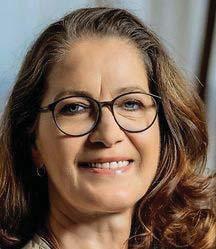
we seek confrontation. Before the illegal invasion, European countries like ours and Russia enjoyed certain levels of cooperation, including through trade. NATO also did not look for confrontation with Russia. NATO is a defensive alliance. Countries can request membership of NATO and NATO respects every nation’s right to choose its own path.
Russia breached the Budapest Memorandum (1994) where it agreed to respect independence, sovereignty and borders of Ukraine, by its 2014 invasion of Ukraine’s Crimea peninsula. Since then, Russia has continued to breach international law. The illegal invasion of Ukraine on 24 February 2022 marked a further escalation of Russia’s war of aggression against Ukraine.
Why do you not support other countries with weapons like you do with Ukraine?
Globally, we are committed to contributing to safety and stability. In West Africa for instance, we finance the UNDP Regional Stabilisation Facility in the Lake Chad Basin in Niger, Nigeria, Chad and Cameroon. We have also been very clear that we support ECOWAS
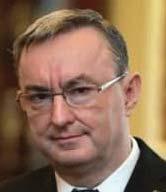
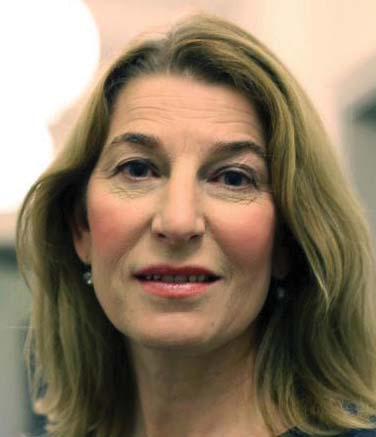
as a regional organisation in relation to the developments affecting the security and stability of the region. Furthermore, our countries have given assistance to Nigeria’s fight against insurgency multiple times, including support to Nigeria’s military.
Concerning Ukraine specifically, the Russian war against Ukraine also has a direct impact on the security of Europe. For that reason, continued military support remains crucial for Ukraine to defend itself against Russia, but also for Europe as a whole.
Does Europe’s commitment to Ukraine affect its work with Nigeria?
We are committed to our partnership with Nigeria and other African countries. Our work with and in Nigeria encompasses many issues, such as private sector development, agriculture, climate change, security, health, human rights and humanitarian affairs. We are among the top trading partners for Nigeria, have ongoing commitments of more than 600 million euros to Nigeria and our companies create thousands of jobs here, for instance in the field of agriculture, tech, health, and energy. We remain strong partners of Nigeria and Nigerians and we intend to strengthen our partnership even more.
To ameliorating the current hardship faced by residents of Lagos, the state government recently rolled out relief measures that would somewhat ease the burden. From reduction of transport fare to availability of cheaper foods, as well as health and education palliatives, the state governor, Babajide Sanwo-Olu said it is targeted at the vulnerable population to bring about immediate ease, just as the federal government leads the recovery efforts. Precious Ugwuzor reports
Nationwide, most citizens are groaning under the rising cost of living, resulting in inflation of food and commodities prices, hence the pockets of protests that was witnessed recently, including in Lagos.
Taking into cognisance the plight of his citizens, Governor Babajide Sanwo-Olu is bent on doing something different to ease such pains of economic hardship.
Just last week Thursday, the governor held a live media chat where he unveiled his plans for such relief measures, especially the vulnerable population to mitigate the impact of the hardship and bring about immediate ease.
The governor, accompanied by his deputy governor, Obafemi Hamzat, and selected members of the state Executive Council, who spoke during a live media chat titled, ‘Sanwo Speaks,’ revealed steps being taken by his administration to reduce the economic burden on the residents.
In the live chat anchored by media practitioners like Dr. Reuben Abati of Arise TV; Babajide Kolade-Otitoju of Television Continental (TVC); General Manager of Lagos Television, Mrs Adesola Kosoko; Jeffery Uzomma of Channels TV, the governor unveiled his plans while fielding questions.
While conveying empathy to citizens over the current hardship occasioned by inflation commodities prices, he said: "We are not unaware and unmindful of the current situation, but as leaders, we have the responsibility to bring immediate ease to our people. Given the nature of challenges that we are facing presently, we have designed creative means to ease the hardship on our people.
“As incident commander, I am giving you the commitment that the bipartisan advisory committee that we have put together, will welcome ideas and advice from everyone that can lead to more solution out of the challenges that we have found ourselves.
“In terms of policies, we will continue to do everything within our means that the greatest good gets to the greatest number. Lagosians are resourceful and hardworking, they are commercially driven self-starters. Those are the values I want all of us to build our hope around”.
Relief for Civil Servants
According to the governor, one of the immediate measures was targeted at new work schedule for the workforce in the state’s civil service. From this week, the civil servants on Grade Level 1 to 14 would be permitted to work three times weekly until further notice while civil servants on Grade Level 15 to 17 would work four days in a week.
Giving assurances that this measure would not disrupt governance, he said it was to reduce the pressure daily borne by workers in carrying out their duties in the period of economic hardship, adding that it would save the staff of additional stress.
In terms of cost of transportation, the governor gave a 25 per cent fare slash across the stateowned public transport channels, including BRT, train and ferry services, adding that all government departments and agencies have been instructed to design modalities for immediate implementation of the measures.
On this he said: "Rising cost of transportation has also made it pertinent for us to initiate an intervention in the sector. For the public using the government-owned transport services, we are implementing 25 per cent fare reduction on all our public transportation channels.
"We are also working with various commercial transporters to assist in little way we can to ease the situation. Instructions have been given to government functionaries for the implementation of these measures; modalities will be provided.”
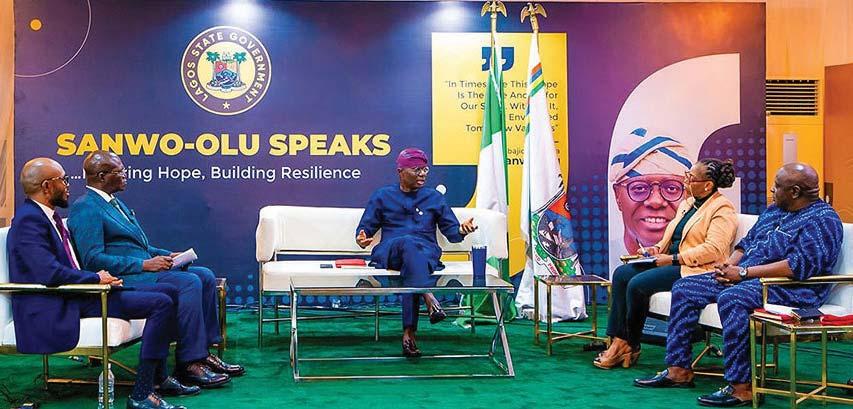
To address the rising food prices, the governor announced three layers of agricultural interventions, one of which would be distribution of combo packages of food items to vulnerable Lagosians, targeting 300,000 households, adding that the state had concluded the procurement of over 100 trailers of rice and other food items, but currently fine-tunning the logistics for seamless distribution to the beneficiaries.
Another layer would be the opening of “Sunday Market” for the next five weeks in 42 communities across the state, where staple food would be available for residents to buy at reduced prices. He said shoppers would only be able to buy items not more than N25,000, with each shopper getting 25 per cent rebate immediately after purchase.
On the third level of agricultural intervention, he said it was the “Soup Bowl”, like was rolled out during COVID-19 lockdown. "We have identified local cafeteria operators and caterers within communities. Funds will be sent to them to prepare the soup bowls. Vouchers will be given to anybody to walk in and eat free of charge. We want to be able to feed between 1,000 and 1,500 people in every local government area daily for the next 30 to 60 days at the first instance".
In education, Sanwo-Olu introduced additional transport support for classroom teachers to enable them keep their work schedule, while pupils across public schools would continue their five-day school attendance.
For the time being, he however suspended the directive compelling
parents to show evidence of tax payment in order to enroll their wards in school. According to him, this was to discourage absenteeism and dropping out of school.
Medical Interventions
In the health sector, Sanwo-Olu also reintroduced free child delivery programme for expectant mothers in all the state-owned General Hospitals and special maternity centres. Essentially, this means that the state government would take up the cost of the child delivery, including Caesarean section.
He said: “We believe this measure would help reduce pressure on families. We are also working with the state-owned hospitals to reduce the cost of some certain drugs, such as hypertension medication. All the six health districts in Lagos will roll out bi-weekly community health mission over the next three months, where residents would enjoy free check-up for diabetes, blood pressure and eye testing. There will be free medications to be given to patients to manage observed conditions.”
Infrastructure
Infrastructure-wise, the governor revealed the collaborative plan with the local government authorities to reconstruct 180 inner roads across the state.
Reacting to the complaint of lack of street lights in some parts of the state, the governor blamed unscrupulous people for the vandalism of cables.
He said: “Some of the lightings we do usually have a lifespan as some of the bulbs need to be changed after sometime but more importantly, there is always a lot of sabotage on our cables. We have cables that have been laid for street lights and people go and cut those cables. Two days ago, we even caught somebody removing iron on our rails. So, we have caught a lot of people.
"There are people that are just vandalising the street lights. They would rip off the wires from
In terms of policies, we will continue to do everything within our means that the greatest good gets to the greatest number. Lagosians are resourceful and hardworking, they are commercially driven self-starters. Those are the values I want all of us to build our hope around
the poles themselves. That is why I mentioned we are changing them from cables to LEDs and solar. It is a lot of money but it’s something we would do intermittently.“
Taking cognisance of the challenges pensioners often face in accessing their pensions, Governor Sanwo-Olu said the state government would ensure the prompt payment of pensions to retired civil servants in the state, adding that they should be able to receive their cheques within a month after retirement.
Given the importance of security, the governor said measures are on ground to secure the Citizenry. On the recent move by FG to approve state policing, he reiterated Lagos’ readiness to deploy 10,000 men from the Lagos Neighbourhood Safety Corps (LNSC) to assist with the provision of security across the state.
The governor said this will come into effect once the Federal Government and the National Assembly firm up constitutional provisions for the establishment of state police.
Buttressing his point, he said the LNSC, a uniformed security agency established by a law of the Lagos State House of Assembly in 2016, would be pulled out to join state police.
He said: "I am an advocate for it. I believe we needed it like yesterday. And the interesting thing is that we have the Neighborhood Watch and it is still functional, about 6,000 of them. The good news is that I have given approval for us to recruit additional 4,000 of them. And this is job for our youths and our able-bodied men.
“What that means for me is that if they give approval for state police, I have 10,000 men that I can further train and get them ready. These are people that know the entire community- the nooks and crannies. Already, they provide intelligence at our state security meetings and you can imagine what happens if that is turned around to a proper security agency.’’
Call for Patience, Shunning of Civil Unrest While pleading for patience and understanding, he said the nation would be out of the woods in the fullness of the reforms initiated by President Bola Tinubu. This is just as he urged those calling for civil unrest and industrial action to desist from the plan, noting that paralysing the economy would not bring about solutions.

L-R: President/CEO, Corporate Council on Africa, Ms. Florie Liser and Governor of Lagos State, Mr. Babajide Sanwo-Olu during a courtesy visit to the governor at the Lagos House, Marina, on Saturday
Michael Olugbode in Abuja
The Business and Investment Forum (BIF) planned during the proposed official visit of President Bola Tinubu to Qatar, earlier disputed, would now hold, the Embassy of Qatar in Nigeria has revealed.
In an official correspondence
with Nigeria’s Ministry of Foreign Affairs, Qatar stated that the Qatar Chamber of Commerce will host the event on March 3, 2024, as proposed by the Federal Republic of Nigeria.
The embassy stated, “Regarding the upcoming state visit of H.E. Bola Ahmed Tinubu, President of the Federal
Onyebuchi Ezigbo in Abuja
As part measures to combat the sale of substandard and falsified medicines in the country, the National Agency for Food and Drug Administration and Control (NAFDAC) has said that it would not hesitate to clamp down on wholesale and retail outlets where fake drugs are dispensed for public use.
The agency said that it had started engaging stakeholders in the pharmaceutical products supply chain in its resolve to put an end to the menace and effectively safeguard the health of Nigerians.
A statement by NAFDAC's Resident Media Consultant, Sayo Akintola, said that the Director General, Prof Mojisola Adeyeye, gave the warning last Thursday at a stakeholder’s meeting organised by NAFDAC in Lagos.
Adeyeye emphasised the need to explore how to combat the sale and distribution of substandard and falsified medical products within the supply chain, insisting that the agency would not hesitate to clamp down on wholesale and retail outlets where fake drugs are dispensed for public use.
According to her, the engagement with Pharma supply chain stakeholders in Nigeria serves as a means of thinking together and putting in place a position that will represent or guide collective efforts and strategy to prevent, detect, and respond to substandard and falsified medicinal products.
She also stated that the goal is to ensure that medical products in circulation are of the quality standard required and safe for public use.
The NAFDAC boss noted that the high prevalence of substandard and falsified medicines in Africa is a major threat to public health, attributing this to the fact that regulation in the region is limited.
Adeyeye further noted with dismay that the poor regulatory practice allowed for poorly regulated
manufacturers to supply their products in Africa where technologies to detect and trace them are limited.
She added that the menace of substandard and falsified medical products threatens access to safe, efficacious, and affordable medicines, undermining health systems and the achievement of universal health coverage globally.
She said that the burden on the agency is to lead the fight against such medical products in Nigeria and support efforts that will see a reduction in the prevalence of such medical products both locally manufactured and imported.
The DG explained that NAFDAC is not the only regulatory agency in terms of substandard falsified medicines, adding that the Pharmaceutical Council of Nigeria (PCN) probably has more to do in the fight against fake drugs.
Adeyeye explained that currently, NAFDAC is doing its best to fight this issue of said substandard and falsified products, stating that the fight against the products is based on three broad thematic areas: Prevent, Detect, and Respond (PDR).
She said that NAFDAC operatives are not just going on the streets to look for substandard falsified medicines, but also going after products that have been approved in Southeast Asia en route Nigeria.
She reiterated that 70 per cent of medicines used in Nigeria come from outside which necessitated the establishment of a pre-shipment testing scheme that has stopped over 124 products that were approved from coming into the Nigerian market.
According to her, some of the medicines do not have content, some will not disintegrate, and some will not dissolve. In contrast, some of them have wrong labelling and all sorts of non-compliance, adding that the agency is dealing with that now with the World Health Organisation (WHO).
Republic of Nigeria, to Qatar from 2nd – 3rd March 2024 and with reference to our note: ref: QEA/FA/057/24 dated 22/02/2024 regarding holding of a Business and Investment Forum (BIF) on the margins of Mr. President’s visit to Qatar on 2nd March 2024.
“The embassy has the honour to convey that the Qatar Chamber of Commerce will host the above mentioned event on 3rd March 2024, as proposed by the Nigerian side.”
A leaked official correspondence between the Qatari government and Nigeria’s Ministry of Foreign Affairs last week had stated that the forum would not hold during the Nigerian president’s planned visit due to the lack of a legally binding agreement between the two countries for the promotion of investment.
The leaked correspondence also noted that Qatar’s ministry of commerce had other commitments on the days Tinubu desired to visit. It stated that its commerce and industry minister, Sheikh Mohammed bin Hamad bin Qassim al-Thani, “will be carrying out official missions outside the country
during the upcoming visit period”, which made him unavailable to meet with the Nigerian side for business and investment purposes.
The country added that its officials would be very busy because Qatar was hosting its own “web summit” the same time Nigeria’s president planned to visit.
“The State of Qatar will be hosting a web summit during the suggested period and the state’s authorities will be preoccupied with this event,” the letter had stated.
But in the latest correspondence between the Embassy of Qatar in Nigeria and the Nigerian Ministry of Foreign Affairs, the Qatari embassy said it was glad to convey the readiness of Qatar Chamber of Commerce to host the forum to the Nigerian government.
Special Adviser to Minister of Foreign Affairs Yusuf Tuggar, Alkasim Abdulkadir, said the clarification became necessary to clear deliberate misinformation and misrepresentations in the media on the purported cancellation of the event.
Moreover, National President
of the Nigerian Association of Chambers of Commerce, Industry, Mines and Agriculture (NACCIMA), Dele Oye, said there were no plans to cancel the Business and Investment Forum.
Oye, in a statement, said the summit was organised in partnership with the Qatari Chambers of Commerce and Industry to provide an unparalleled platform for Nigerian businesses to engage with their Qatari counterparts.
Oye said, “In light of recent developments and the circulating news regarding the upcoming Business and Investment Forum scheduled to be held in Qatar, we, at the Nigerian Association of Chambers of Commerce, Industry, Mines, and Agriculture (NACCIMA), wish to address our valued members, business community, and all involved stakeholders.
“We acknowledge the concerns raised following the leak of diplomatic correspondence that has led to some uncertainty regarding the forum.
“We would like to clarify that this event is a significant
element of the broader context of President Bola Ahmed Tinubu’s state visit to Qatar, scheduled between 2 and 3 March 2024. This visit underscores the strong commitment between Nigeria and the State of Qatar to deepen bilateral economic cooperation.
“The Business and Investment Forum, organised in collaboration with Qatar's Chambers of Commerce and Industry, is designed to provide an unparalleled platform for Nigerian businesses to engage with their Qatari counterparts.
“This event aims to explore commercial and investment opportunities across key sectors, including oil and gas, manufacturing, agrobusiness, construction, real estate, ICT, renewable energy, solid minerals, and the service sector.
“We understand that the leaked information may have caused concerns regarding the status of the forum. We wish to reassure all prospective participants and our business community that the event is being prepared with the highest level of dedication and professionalism, aiming to foster stronger business ties between our two countries.”
Wale Igbintade
A group, the Arewa Think Tank, has criticised an Islamic cleric for inciting Muslims in the country to attack the First Lady of Nigeria, Oluremi Tinubu, and urged the government to restrict the cleric from preaching in Nigeria to serve as a deterrence to others.
A statement issued at the weekend by the Chief Convener of Arewa Think Tank, Muhammad Yakubu noted that while Nigerians have the rights to criticise the government and its policies, calling for the murder of the president's wife by the religious cleric was unacceptable and condemnable.
The inciting speech had attracted reactions and condemnation by many Nigerians, calling for the identification and arrest of the cleric to face justice.
However, Arewa Think Tank in it statement specifically charged Northern leaders and
elders to embark on a public condemnation of the inciting statement.
The group stated that the First Lady being an assistant pastor at the Redeemed Christian Church of God (RCCG) had nothing to do with her official position at the corridors of power because like any other Nigerians, she has the rights of association and worship.
The group also called for the prosecution of the cleric and that he be restrained from preaching in Nigeria.
"We of the Arewa Think Tank condemn in totality what the Islamic Cleric said about President Bola Tinubu's wife, Oluremi, calling for her death as an infidel. The Islamic cleric who expresses such views deviates from the core principles of Islam. Our religion teaches us to live peacefully with others.
"The Quran and Hadith lay emphasis on respect, tolerance, and kindness towards all individuals, regardless of
their faith or background. Islam advocates for peaceful coexistence, mutual respect, and understanding among diverse communities.
"We call on relevant security agencies to ensure that the Islamic cleric in question is brought to book for prosecution.
"We believe that every Nigerian has the right to criticise government of the day, but it becomes a criminal offence to call for the death of a national figure, including every other Nigerian on the basis of religious belief,” it said.
It stated that while criticising the government and its policies is within the ambit of democratic rights; but calling for the killing of the president's wife by the religious cleric is unacceptable and completely condemnable
In a similar development, the group also cautioned the Director of Abuja School of Social and Political Thought, Dr. Sam Amadi, for allegedly raining abusive words on the former Head of
State, Gen. Yakubu Gowon over his comments on Biafra.
Gowon, who ruled Nigeria between 1966 and 1975, had recalled how Nigerians said he could not prosecute the civil war because he was too slow.
Amadi had on his X handle described the comment of the former Nigerian leader regarding the Biafra war as disgraceful, and lacking wisdom.
However, the group warned Amadi to retract his statement and apologise to the respected Northern elder statesman and leader of the “Nigeria Prays”.
“Enough of this attack on Gen. Yakubu Gowon who led and fought the civil war to keep Nigeria together as one united country.
"If we hear anything again against our respected elder, we shall reply that person or group of persons in the language that they understand because those who plotted and started the Biafra war know themselves," the statement added.
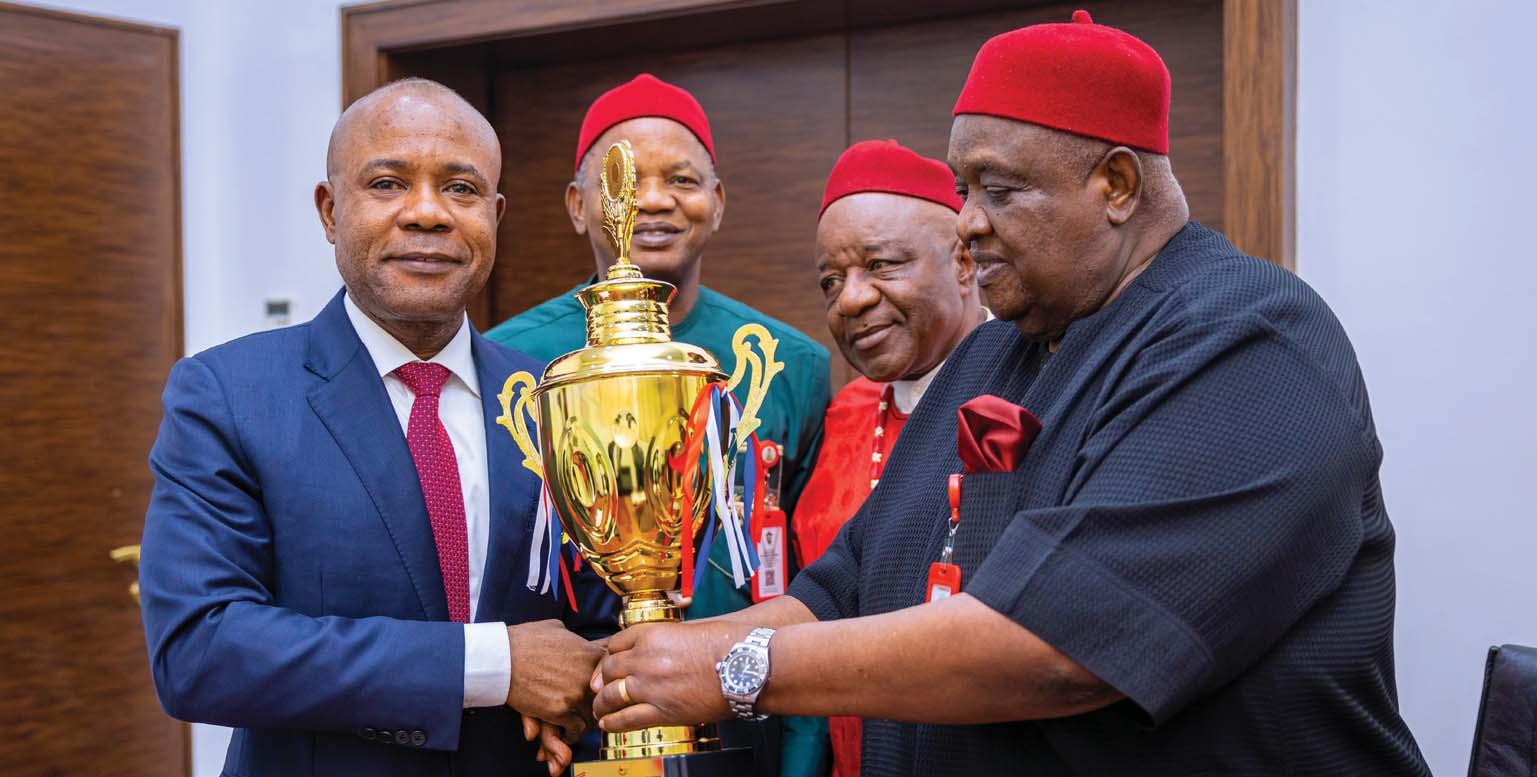
Chuks Okocha in Abuja
The leadership of the Labour Party has clarified that the letter sent to the Independent National Electoral Commission (INEC) by a factional group and former members of the party led by Lamidi Apapa to recognise Anderson Uwadiae Asemote and Monday Ojore Mawa as the gubernatorial and deputy governorship candidates did not emanate from it.
In a statement by the National Publicity Secretary of the Julius Abure-led party, it said that Nigerians were sufficiently aware that the authors of the letter in circulation were fraudulent and desperate people seeking recognition and working towards obtaining by tricks from unsuspecting Nigerians as they had done in recent elections.
According to Ifoh, "As it is done in every corporate or governmental institutions,
letters or any correspondences are received with a stamp of acknowledgement. As it is a custom, if you write any letter to INEC, the commission is expected to receive it after due verification
"Though acknowledgement of a correspondent does not imply recognition or acceptance of its content, but we however insist that INEC must henceforth verify signatories of any future correspondences as it concerns Labour Party before acknowledgement," he explained.
He urged Nigerians to recall that on the 22nd of February, two other political parties namely, APC and PDP had their parties primaries and that on the following day, Labour Party also had its primaries where it elected Olumide Akpata as its candidate.
These events, it noted, were televised live on notable television stations, and that INEC
officials led by the state electoral commissioner also observed the very successful primaries.
Ifoh wondered how a group of persons conducted a primary election that was not known or heard by the public and was not covered by the media, went ahead to ask the INEC to act on their correspondence.
He explained that INEC knew that there was no primary as it did not supervise any other primary but the one conducted by the party led by Abure.
"INEC knows that they just brought names; there was no primary. We were in Benin that day, and the world knew that Abure had an issue and was released, after which he witnessed the primary.
“How come they did a primary and the media did not know? When and where did they conduct their delegate election? Was it by direct or indirect election? These men are just a bunch of desperate
people looking for easy money from desperate politicians.
"There is even a crisis amongst the Apapa camp. Are you aware that Apapa has since left them? He is no longer with them. When did you hear Lamidi Apapa speak about them?
“Are you also aware that the former Youth Leader, Anselm Eragbe, has disclaimed them? In his disclaimer, he said the tenure of Apapa and their group in acting capacity has since elapsed and has not been renewed.
"Eragbe also said that the Apapa-led aggrieved members of the party have only insulted the sensibilities of the party members by the introduction of Anderson Asemote and Monday Mawa to the INEC as the governorship and deputy governorship candidates for the September 21 governorship elections in Edo State.
The letter read: “That the only thing they have done is to
Sunday Aborisade in Abuja
The Northern Senators Forum, has commended leaders of the Economic Community of West African States (ECOWAS) for lifting sanctions they imposed on Niger Republic as a result of military takeover on 26th July, 2023.
"We are pleased to see that ECOWAS has responded to the progressive requests made by us individually and collectively on the subject matter, and we commend their prudent and compassionate approach in addressing these critical issues," they said.
The in a statement by its spokesperson, Senator Kawu
Sumaila, in Abuja, yesterday, the forum said the principled and empathetic decision of the ECOWAS to lift the sanctions on Niger Republic was a testament to the organisation's commitment to regional solidarity, cooperation, and respect for human rights.
"We understand that this action will go a long way in alleviating the suffering of the people of Niger Republic, as well as ensuring the restoration of stability and economic prosperity in our region.
"We are particularly grateful that ECOWAS leaders have considered our pleas to restore electricity, open borders, and lift the sanctions on Niger Republic.
"These measures will not only have crucial humanitarian implications, but will also foster regional integration, trade, and cooperation.
"We firmly believe that this step taken by ECOWAS will positively impact the lives of the people of Niger Republic and Nigeria and facilitate the restoration of trust and harmony among all member states.
"As representatives of the people and advocates for justice and democracy, we commend ECOWAS for their responsiveness and understanding of the immense challenges faced by our fellow West African nation.
"The Northern Senators Forum
stands in solidarity with ECOWAS in restoring democracy and rule of law in Niger Republic and other west African countries, and we are committed to working to promote stability, peace, and socio-economic development throughout the region."
The northern senators, however, urged the government of Niger Republic and its people to seize the ECOWAS good gesture as an opportunity to hasten the process of returning to democratic governance to build a stronger and more prosperous nation, harnessing their resilient spirit and unwavering determination.
further increase our pains, insult our persons and sensibilities by their actions for not deeming it fit and necessary to consult those of us from Edo State and by imposing names for the Edo State Labour Party gubernatorial and deputy governorship candidates
without conducting any valid gubernatorial primary in Edo State."
Labour is thereby urging Nigerians to distance from any other list other than that of Barrister Olumide Akpata as the only candidate being sponsored by the Labour Party.
Adibe Emenyonu in Benin City
No less than 350 public and private school teachers in Edo and Delta States at the weekend, graduated from Seplat JV Energy education empowerment programme for host communities.
The teachers were trained in Science, Technology, Engineering, Arts and Mathematics (STEAM) under the Seplat Teachers Empowerment Programme (STEP).
The training which was done in collaboration with the Nigerian National Petroleum Company Limited (NNPC), was geared towards equipping the teachers with skills to effectively deliver STEAM knowledge to the students.
Director, Seplat External Affairs and Sustainability, Chioma Afe, explained that the education value chain played a crucial role in shaping the workforce and fostering economic development.
Speaking at an education summit and graduation ceremony organised by Seplat JV and NNPC in Benin City, capital of Edo State, Afe said collective efforts were vital in building a skilled and productive workforce . She noted that despite efforts to increase access to quality education, disparities in resources persist across different regions, particularly in secondary education.
"We want to address the
challenges within the education value chain, especially in the areas where Seplat and NNPC operate, as well as across the nation.
"At the foundation of the education value chain lie primary and secondary education, crucial for laying the groundwork for future learning. However, access to quality early education, especially in rural areas, remains a challenge, Afe said.
According to her, collaboration between the private sector, educational institutions, and the government is essential to improve the quality of teaching and learning outcomes.
Earlier, the Chief Operating Officer, Seplat JV, Mr Samson Ezugworie said Seplat recognised the problem and the need to confront it head-on.
Ezugworie noted that Nigeria’s education system today is not where it should be, adding that Seplat understands its pivotal role in development.
"This shared drive among Seplat, our senior partners, and the state governments in the areas we operate is what propels us," he said.
Delivering a goodwill message, Edo State Commissioner for Education, Dr. Joan Ovaiwe, thanked Seplat JV Energy and NNPC for supporting teachers in Edo and Delta
L-R: Governor of Enugu State, Dr. Peter Mbah; President, Ohanaeze Ndigbo Worldwide, Enugu State Chapter, Prof. Fred Eze; National Publicity Secretary, Ohanaeze Ndigbo, Hon. Alex Ogbonnia; and the President-General, Ohanaeze Ndigbo, Chief Emmanuel Iwuanyanwu, during their presentation of Enugu's trophy as the ''Most Mobilised State at the 2023 Igbo Day Celebration" to the Governor at the Government House, Enugu at the weekend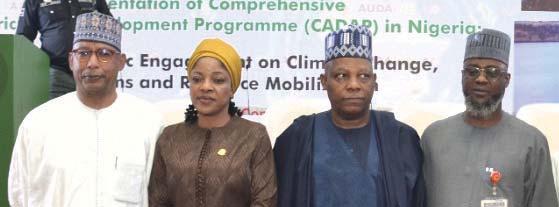
Chuks Okocha in Abuja Presidential candidate of the Labour Party (LP) in the 2023 election, Peter Obi, yesterday, marked the anniversary of the election, stating that “all the worst fears that we warned might happen have all been playing out.”
Speaking at the one year anniversary of the election tagged ‘Redefining Our Options and Consolidating our Legacies” organised by Obidient Support Groups in Abuja, Obi, titled his speech: ‘Tribute to Hope’.
He saluted the “abiding faith and solidarity of all those Nigerians, who supported us and wished us well through the campaigns and the elections. I also salute the patriotism and freedom of choice of those
who may not have supported or voted for us.I salute your courage and tenacity.
“Together, we made the courageous statement that a new, more prosperous, more united Nigeria is not only possible but also within reach of all Nigerians.
“You braved the odds, you defied the pessimism of nay-sayers, you made incredible sacrifices and clung to the stubborn belief that this land is our country and that its future is ours to shape for our common good and the good of posterity, the LP standard bearer said.
“Looking back at what happened at the election and the situation in the country today, we were correct in saying that the old ways of politics should give way to a new progressive Nigeria.
“In the twelve months since that election, most of the fears we expressed for our nation if we went the way of the old politics have come to haunt us in frightening forms.
“We may have lost an election but we have won a moral victory of epic proportions. All the worst fears that we warned might happen have all been playing out.
“Our national economy has been driven into perhaps the worst state in all of our national life. The population of those classified as multi-dimensionally poor has climbed astronomically to over 80% of our population.
“Similarly, unemployment is galloping, for a predominantly youthful population, this scenario is dire and frighteningly dangerous.
The hunger protests have united our people across ethnicity, language, region, faith, and location.
“This is another confirmation of our belief that Nigerians are united by the circumstances of their living conditions, not by artificial barriers raised by opportunistic politicians. We are now one people under hunger.
“Just yesterday, I read with sadness, the reports of how a massive crowd besieged the Zonal Office of the Nigerian Customs in Yaba to purchase the discounted 25kg rice offered by the Customs Service.
“In the course of the heavy stampede that ensued, some lives were lost. It is heartbreaking to think that despite all the wealth of our nation, Nigerians are losing
Kingsley Nwezeh in Abuja
The Inspector General of Police, Kayode Egbetokun, weekend, said the Nigeria Police Force would leverage its sporting capabilities to improve on peace, unity, stability, and development of Nigeria.
The IG stated that the Nigeria Police Sports remained instrumental to producing champions representing the country nationally and internationally in various sporting competitions.
Egbetokun spoke at the opening of the 14th Biennial Police Games tagged "Oluyole 2024" at the Adamasingba Sports Centre in
Ibadan.
The event was declared open by Governor of Oyo State, Seyi Makinde, who represented President Bola Tinubu as the special guest of honour.
Egbetokun emphasised the vital role of sports in fostering camaraderie, discipline, and mutual respect among officers and members of the public, noting that such competitions served as platforms for promoting teamwork, physical fitness, and healthy competition among officers from various commands and formations of the force.
Speaking on the theme:
"Competing for Peace, Unity, Stability, and Development of Nigeria", the IG stressed that the 14th Biennial Police Games symbolised the collective resolve of the Nigeria Police Force to promote national cohesion and solidarity through spirited participation in various sporting events to showcase the athletic prowess of officers.
He said it would also assist in "reinforcing the values of professionalism, integrity, and service to the nation which are crucial to our collective safety and national development in Nigeria."
A statement by the Force Headquarters in Abuja , stated
that, "the IG while appreciating the governor and good people of Oyo State for their support in hosting the event, extended a warm invitation to the public to join in celebrating the spirit of sportsmanship and camaraderie during the 14th Biennial Police Games.”
This, he said, should be done, “by uniting in cheering the sportsmen on, in this renewed drive to bring policing closer to the people through sports, as the force intends to showcase and discover new talents in the sports circle of the police towards national development."
The Aig-Imoukhuede Foundation has announced the opening of applications for the AIG Public Leaders Programme (APLP) Cohort 4.
It stated that the application is for those working in the public sector in Africa, with a minimum of seven years of active service, at grade levels 12-17, and aged between 35-50 years at the time of application.
The foundation said that
“applications for the APLP Cohort 4 are now open and interested public servants are encouraged to visit aigimoukhuedefoundation.org/leadersprogramme for further information and to submit their applications before the 30th of April, 2024.” The programme is tailored for senior public leaders and delivered in partnership with the Blavatnik School of Government, University of Oxford.
The APLP would offer an
opportunity for participants to expand their conceptual frameworks and acquire practical tools essential for addressing challenges they face, including bureaucratic inefficiencies, political interference, the inadequacy of structures and processes for effective policy development and implementation.
It would feature a comprehensive curriculum designed to accelerate the mastery of essential competencies crucial for effective governance,
covering topics ranging from governing in times of challenge and change, harnessing digital technologies, the pitfalls in decision-making, integrity in public life and strengthening public organisations.
The programme would be delivered through a blend of rigorous academic instructions, interactive workshops, and peer-to-peer learning, where participants would engage in immersive experiences that would enable them to lead with confidence and competence.
their lives in their desperate quest to buy food cheaper, in the face of the growing hunger and starvation in the country.”
The former Anambra State governor noted the patriotism of Nigerians even in the face of daunting challenges, saying, “Wherever I have gone all over Nigeria, North, and South, I have been struck by the reality of poverty, deprivation, and suffering sometimes written boldly on the faces of people.
“Yet, the beauty of our people remains the optimism in their Nigerian identity and the hope they all cherish in the future of our country. None of the poor people that I have encountered has ever wished they were not Nigerians. On the contrary, the consensus among them is that Nigeria is a good place ruled mostly by bad leaders.”
Obi, therefore, sent a message of hope to all Nigerians particularly his supporters, saying, “Despite our current problems and setbacks as a nation, I am glad to reassure our supporters and compatriots
that there is nothing in our dark experiences that has dampened my resolve and optimism in the possibility of the New Nigeria that we all strove so hard a year ago to enthrone.
“And nothing has happened to discourage my resolve or optimism about the goals we fought for. A greater, more compassionate, more prosperous, and more equitable New Nigeria is possible.”
The LP flag bearer finally saluted the courage of the Obidients and reassured them that there was no looking back in the journey to rescue Nigeria.
“For me, the journey to a better Nigeria has just begun. It is a lifelong journey. On that journey, despair is not an option. Surrender is not a choice. Failure is not even a remote possibility. The nation has heard us.
“The youths have carried the mantle of changing their destiny and the direction of our country. They cannot wait to take back their country from those who regard national leadership as a criminal racket,” he stated.
Chinedu Eze
The Chairman of Air Peace Limited, Dr Allen Onyema has explained that the airline chose Gatwick Airport to operate its Lagos-London flight, which commences from March 30, 2024 because UK authorities refused to give the airline Heathrow.
Onyema who spoke on Arise TV yesterday, explained that after the airline decided on Gatwick it realised inherent benefits in choosing the airport, which include the fact that many Nigerians live in that part of London and there is less traffic in getting to Central London from Gatwick than from Heathrow.
He also said that in accordance with the Bilateral Air Service Agreement (BASA) signed between UK and Nigeria, Air Peace was supposed to be offered UK’s primary airport, which is Heathrow, just as Nigeria offered its primary airports in Lagos and Abuja to British airlines: British Airways and Virgin Atlantic Airways.
But refusing to do that, Air Peace
chose Gatwick and realised it could be beneficial to the airline’s operation, noting that it would be easier for the airline’s Nigerian passengers to get to their destinations from the airport and also to connect to other parts of the UK.
“The BASA we signed with the UK is this: you give me your primary airport; we give you our primary airport. British Airways, Virgin Atlantic Airways come to our country using our primary airports, Lagos and Abuja. When we applied, they told us Heathrow was not available to us and they were even suggesting London Stansted Airport or Luton. They also suggested Gatwick, I refused. I wanted to go to Heathrow, which is their primary airport.
“But after sometime we said okay, as Nigerians are groaning under the weight of high fares; we decided even if it is Scotland; we would go. So, we decided to take Gatwick. Gatwick was not really our choice but in the long run we decided to see some goods in choosing Gatwick.
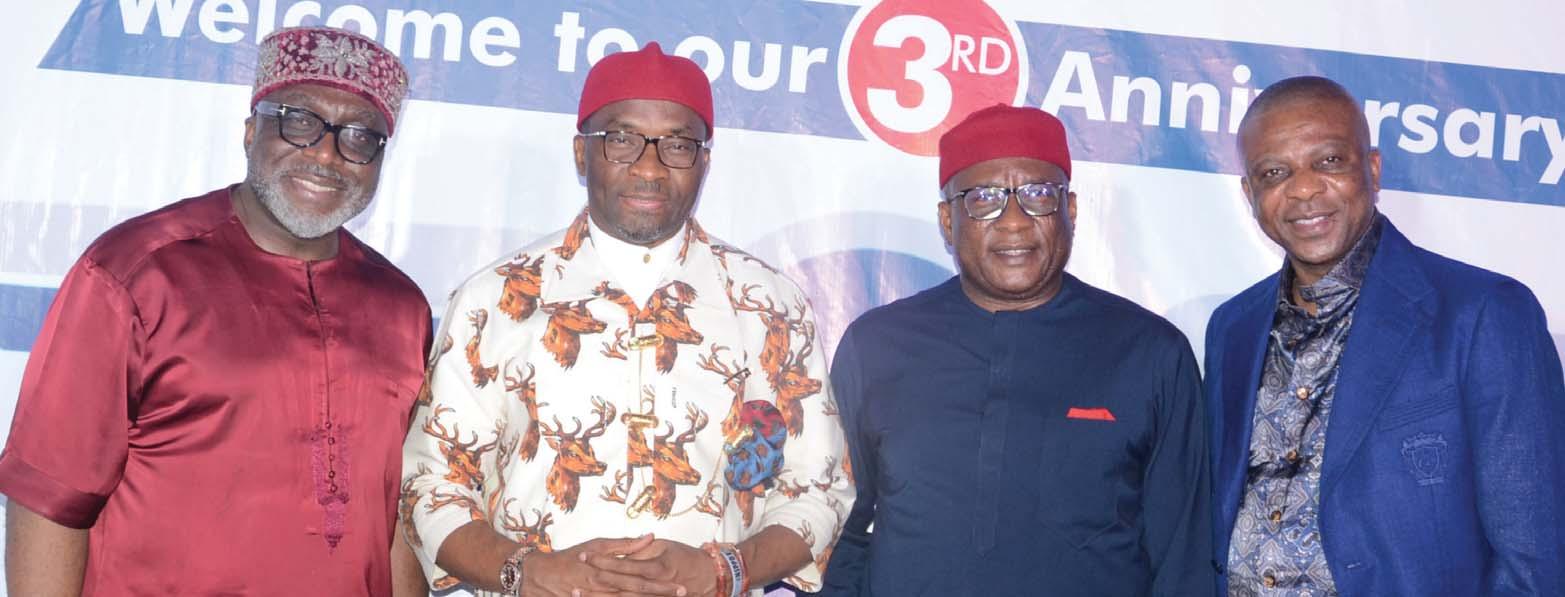
Emmanuel Ugwu-Nwogo in Umuahia
The five governors of the Southeast geopolitical zone have subsumed their different political leanings to work for the collective economic interest of the zone, Governor Alex Otti of Abia State, has said.
He stated this at the weekend, when he received a delegation of the Joint Body of South East Council of Traditional Rulers and Representatives of Igbo Archbishops
and Bishops that paid him courtesy visit.
Otti told the delegation led by the Obi of Onitsha, His Royal Highness, Igwe Alfred Nnaemeka Achebe, that the South East governors were already working together to tackle the developmental challenges facing the zone.
The five states in the zone are controlled by four different political parties with the All Progressives Congress (APC) in charge of Imo and Ebonyi States. The Peoples
Democratic Party (PDP) holds sway in Enugu State, while Labour Party controls Abia and the All Progressives Grand Alliance (APGA) governs Anambra.
But Otti said the governors understood that it was important for them to set aside their political affiliations, prioritise governance and address pressing issues affecting the region, especially insecurity.
"Anyhow you look at it, we must deal with security as a region if not
as a country. What feeds insecurity, to a large extent, is unemployment and poverty. It also feeds banditry and insurrection and we need to do everything possible to ensure that our people have something to do," he said.
The Abia governor noted that no meaningful development could take place without adequate security, adding that the regional security challenges required a unified approach by the brother governors to find
sustainable solution.
To this end, Otti pointed out that the five South East governors do hold their meetings on regular basis to address the issues affecting the region, including youth restiveness and regional economic growth.
He said he and his colleagues had initiated plans on how to meaningfully engage the young people through the creation of employment opportunities and other empowerment programmes.
The Abia Chief Executive
have advised the members of the NLC to conduct the rallies scheduled for February 27-28, 2024 in a peaceful manner, we urge you to use your good offices to direct the IG to provide adequate security to the conveners and participants in the protest in line with the provisions of Section 83(4) of the Police Establishment Act."
The AGF had urged the NLC to shelve its proposed nationwide protest on the grounds that the protest would amount to contempt of court.
On February 16, NLC announced a nationwide protest scheduled for February 27 and 28, in response to the economic challenges facing the country. This decision followed the expiration of a 14-day ultimatum issued to the federal government regarding the widespread hardship.
But Fagbemi, in a letter addressed to Falana, reminded NLC of a subsisting order restraining the union from embarking on any industrial action, saying it is antithetical to the mediatory engagements leading to the execution of the agreement.
However, NLC, in a statement yesterday, alleged that the federal government had perfected plans to attack its members that would participate in the scheduled peaceful rallies across the country, but said workers remained resolute, determined and prepared to express their pain and grief in a peaceful manner as Nigerians
A statement signed by NLC President, Joe Ajaero, identified the Nigeria Civil Society Forum (NCSF) as one of the groups being primed to attack the protesters during the peaceful rallies.
The labour movement urged international human rights bodies and the governments of the African Union (AU) and the United Nations (UN) to note that the right of the people to peacefully protest was being threatened.
Aside the economic hardship, NLC had also cited the federal government's non-implementation of the agreement reached on palliatives to cushion the effects of the removal of fuel subsidy on workers and the general public.
The statement said, "We would want to inform Nigerians that the state has perfected plans to attack our peaceful rallies across the country. One of the groups being primed to attack our peaceful rallies is by a nebulous name, Nigeria Civil Society Forum (NCSF).
"NCSF is one of the emergency groups put together, funded, promoted and remote-controlled by government to cause violence against our members for electing to peacefully protest against the hunger in the land.
"We would want the state to know that the solution to our horrible economic situation and hunger is not by suppressing peaceful dissent or inflicting violence on peacefully protesting citizens, as the government did in Minna and other cities where its agents tear-gassed and beat up women before locking them up for raising their voice against hunger.
“It does not lie in the deployment of state-sponsored terror. The pangs of hunger cannot be cowed by bullets or tear gas.”
NLC added, "In light of this, we at the NLC and civil society allies are moving ahead with our protest rallies against economic hardship and insecurity in line with the decision of the National Executive Council (NEC).
"As citizens, we have a fundamental right to peaceful protest and history bears us witness that our protests are always peaceful, except in instances of state-engineered violence.”
NLC further advised the Nigerian state to put on its thinking cap and
find solutions to the pains it had continued to cause the people instead of further dehumanising them. It stated that if the state was irrevocably set on the path of violence against labour and other peace-loving Nigerians, it would be making a costly mistake.
NLC explained that if the protesting workers were attacked, there would be a total shutdown via withdrawal of services by workers.
It stated, “Let no one be deceived, we and other deprived Nigerians cannot easily be intimidated. Lest those in power now who may have forgotten be reminded, we faced a more resourceful and resilient adversary in order to have democracy.
“All we are saying now is that let there be food for the people, let the people live in safety, let the people live a life of dignity devoid of suffocating IMF/World Bank economic policies.”
NLC reiterated its call on international human rights bodies and the governments of the AU and the UN that the right of the people to peacefully protest and demand for freedom from economic slavery and hardship was being threatened by the Nigerian state.
The union stated, "We, however, remain resolute, determined and prepared to express our pain and grief in a peaceful manner as Nigerians come 27th and 28th of February 2024."
Meanwhile, the Afenifere leader, Pa Reuben Fasoranti, appealed to the Yoruba and Nigerians to shun the protest, in a statement in Abuja yesterday.
While acknowledging the hardship faced by the people, Fasoranti said the economic measures being implemented by the government, though difficult, were part of a larger strategy to foster long-term
economic stability.
Fasoranti stated, "As the national leader of Afenifere, and leader of the Yoruba, I address all and sundry today with a deep understanding of the challenges facing our dear country at this critical time.
"The outcry over the hardship, hunger, and price hikes is not unexpected, yet we must come to terms with the realities of our national challenges which the present administration of President Bola Tinubu is striving to resolve.
"While acknowledging the hardships faced by our people, it is important to recognise that these economic measures, although difficult, are part of a larger strategy aimed at fostering long-term economic stability.”
He added that the government's commitment to implementing the measures was a testament to its dedication to addressing the root
harped on the need to create a conducive environment to attract investments and businesses into the region so that employment opportunities would spring up for the young persons.
"We know that investors are rational. If you don't make your environment conducive to attract investments, they will not come. I know at the minimum 20 to 25 businesses in Abia, before now, that just relocated at some point and closed shop,” he said.
causes of Nigeria’s economic challenges, inherited from the ills of the previous years. The Afenifere leader stated, "As a responsible leader, I appeal to every Yoruba man and woman, young and old, and our fellow citizens across the nationalities, to exercise patience and refrain from engaging in protests or actions that may escalate tensions.
"Understandably, the immediate impact of these economic reforms is challenging to everyone, but it is crucial to allow the government the necessary time to realise the intended benefits.
"It is important to note that the removal of fuel subsidies and the floating of the naira was not undertaken lightly, as we all know the great damage done to our national prosperity through the nefarious activities of the agents of darkness within the oil and financial sectors.”
told newsmen that, "I left this meeting with a lot of enthusiasm, excitement and optimism about the future of our country.
“I believe that implementing the decisions we arrived at today will have propel our economy and help alleviate the poverty in the land, help create employment and help put food on table."
Anambra State Governor, Charles Soludo, also told newsmen that, "It's a tripartite meeting designed to put heads together and think together.
“We have one national economy, and it's the responsibility of the 225 million Nigerians to work together to make it great and we have all the potential and we have all that it takes to make Nigeria ride through these turbulent times
and put the economy back on a sustainable keel.
"I think there is unity of purpose, determination, the sense of patriotism and determination by all to make it happen and by the special grace of God, it's now the execution, execution execution.
“And this is a standing committee that will be meeting from time to time to evaluate how things are going and make recommendations to Mr. President and to the nation as well."
Ogun State Governor, Dapo Abiodun, said, "As a governor, I can assure you that all hands are on deck. All governors have resolved to join hands with Mr president to ensure that he provides the necessary intervention
to cushion the effect of what we're going through, whilst we are waiting for the implementation and the evidence of the fiscal and monetary policies that are already in place.
"So the teeming public should have that confidence that we're not leaving them alone. In my state and in other states, we are bringing in rice, we're bringing food items and we're selling at rates that can be obtained before the downslide of the naira. So, we are going to be doing all those kinds of things to bring succour to the common man until when you begin to see the evidence of the fiscal and monetary policies."
Director-General of the Manufacturers Association of Nigeria (MAN), Seguñ Ajayi-Kadir,
also said, "I think the private sector is looking forward to the implementation of most of the decisions that we have made with the president.
“Manufacturers are looking forward to an environment that is conducive to business.
And so the issues surrounding foreign exchange, insecurity and general operating environment were discussed and we received the assurances of Mr. President that very soon we are going to start to see some major changes.
“And I think the advisory committee that has been formed, the private sector will play a very significant role, and Nigerians, going forward should be hopeful that we are having solutions to the challenges that we have."

L-R: Maximus Ugwuoke; representative of Lagos State Commissioner for Youth and Sports Development, AdepejuBalogun-Awe; Dr. Babatunde Ajayi; MaryamApaokagi, (aka Taaooma); Olakunle Rotimi Akodu, and Deputy Director/ Head of Climate Change and Environmental Planning Department, Ministry of the Environment, Bankole Michael Omoniyi, at the unveiling of ‘Taaooma’ as the official campaign influencer for Lagos Youth Climate Campaign in Lagos…recently
The foundation laying ceremony of ‘The Arena’, a world class sports and entertainment centre, has been performed in Lagos by the state governor, Mr. Babajide Sanwo-Olu, and the Minister of Sports Development, Mr. John Enoh.
The construction of the
edifice has been hailed as one of the biggest moves to further boost the economy of the state, provide employment for young people, and further establish the state as the commercial nerve centre of the country. Planned in the fashion of O2 Arena and X Arena, The Arena, Lagos, will have
The National Unity Forum (NUF) has said that the success and credibility of the 2023 general election prevented those with sinister motives from orchestrating post election violence in the country.
Its National Coordinator, Godwin Meliga, stated this in a statement issued yesterday after an intercessory prayers for President Bola Ahmed Tinubu, the 36 state governors and all others in positions of authority in the country.
He said the group’s decision to resort to prayers to God as a way out of the myriad challenges confronting the nation was informed by the time-tested efficacy of prayer, and guided by scriptural injunctions.
The group commended the
Chairman of the Independent National Electoral Commission (INEC), Prof. Mahmood Yakubu, for living above board during the conduct of the 2023 general elections.
It also lauded Yakubu and his team for their strident efforts at ensuring the success and credibility of the 2023 general election.
It said that given the tense state of the national polity prior to the last general election, especially due to socio-ethnic and geopolitical diversities, any attempt by INEC to have delivered a compromised electoral process could have triggered violent upheavals across the country, which may have threatened the very fabrics of our mutual coexistence.
The Katsina State Deputy Governor, Hon. Faruk Lawal, has revealed that the state government has restored peace in 13 out of the 22 local government areas battling with security challenges being orchestrated by bandits in the state.
Lawal, while addressing journalists on the security situation of the state, said the restoration of peace in the 13 councils was as a result of fierce operations of the Community Watch Corps officers in collaboration with conventional
security agencies.
He highlighted Dutsin-Ma, Batagarawa, Charanchi, Ingawa, Bindawa, Kusada, Funtua, Danja, Bakori, Malumfashi, Kafur, Musawa and Matazu as the local government areas where peace has been restored.
But the state Chairman of the Coalition of Civil Society Organisations (CSOs), Mr. AbdulRahman Abdullahi, has kicked against the government’s position, adding that bandits are still launching attacks in some of the 13 local government areas.
As part of efforts to find a lasting solution to the security challenges in the country, The Green Assembly Initiative in collaboration with Nigeria Youths Organisations is organising the National Security Summit 2024 in Abuja on Thursday, February 29.
The Convener/Chairman, Organising Committee of the event, Comrade Duke Alamboye, said in a statement that summit has as its theme: “Curbing insecurity in Nigeria achieving a robust and sustainable economy for a new Nigeria youths inclusivity in nation-building.”
According to him, “summit will
discuss topics such as: The strategic mandate for security in Nigeria; New strategies delivering on the mandate of President Bola Ahmed Tinubu; New perspectives in security management: strategic youth mobilisation; Achieving a robust and sustainable economy for a New Nigeria and managing the bulge for youth employment and security guarantees; Redefining the industrial landscape to accelerate economic growth; Youths inclusivity in nation- building; Youths as instruments of economic development and wealth Creation and the agenda for security assurance.”
a capacity of 12,000 which would feature sports and other entertainment shows that are expected to facilitate Foreign Direct Investment (FDI).
Speaking at the event yesterday, Sanwo-Olu promised to give every support the project needs to be completed on time, just as he praised the
creative industry for the sheer audacity to put the country on the world’s stage.
According to him, “The creative industry story is a pride
to us all. Here we have the talent, we have the boldness to take Nigeria to the world. The creative industry deserves an applause from us all.”
Sunday Okobi
There is an unfolding drama in the Edo State Labour Party (LP) as Alhaji Lamidi Basiru Apapaled faction has announced Dr. Hilton Idahosa, as its candidate for the Edo State governorship election scheduled to hold on September 21, 2024.
The LP led by Julius Abure had on February 23, declared Olumide Apata as it governorship candidate following the primary election conducted by in Benin-city, the Edo State capital.
However, in a parallel election held in Benin-city last Saturday (February 24),
Dr. Hilton Idahosa, emerged the winner of the Apapa faction of the LP with 917 votes. His closet rival scored 17 votes while the third contender garnered 12 votes.
However, it has emerged that Apapa, who was not present during the primary election held in Benin-city, had
allegedly written a (secret) letter to the Independent National Electoral Commission (INEC) on February 22, 2024, in which he submitted the names of Anderson Uwadiae Asemote and Monday Ojore Mawah as governorship and deputy governorship candidates respectively of the party.
Wale Igbintade
Justice Ayokunle Faji of the Federal High Court in Lagos has ordered three India nationals to pay the sum of N98.2 million and additional $325,000 to an 87-year-old businessman, Isaac Oluwole Oginni, for breach of fair hearing and the clear provisions
of Section 262 of Companies and Allied Matters Act (CAMA), Justice Faji also declared that the octogenarian remains a director of his three companies, Bolawole Enterprises Nigeria Limited, Lesag Nigeria Limited, and Intermanagement Nigeria Limited.
The Indians affected by the
court order in a suit marked FHC/L/CS/1431/2019, are:
Mr. Jai Bhagwan Gupta, and his two sons, Vineet Gupta and Rachit Gupta.
The octogenarian had in his statement of claims, filed and argued by his lawyer, Yakubu Galadima, sought a declaration that he was a director and
remains a director of the three companies listed as first, second and third defendants in the suit.
He also sought a declaration that he being a first subscriber and director in the first to third defendants, is entitled to certain benefits, advantages, and reliefs from the activities of the three companies.
Ibrahim Oyewale in Lokoja
The Nigeria Guide of Editors (NGE) has advised the new administration of Governor Usman Ododo in Kogi State to follow the footsteps of his predecessor, ex-Governor Yahaya Bello, in providing the best for
the people of the state.
The President of NGE, Mr. Eze Anabah, gave this advice while speaking at the end of the Projects tour of Kogi State government at the Reference Hospital in Okene at the weekend.
Anabah explained that it is only continuity that would sustain
the good legacies left behind by the immediate past administration of Governor of Yahaya Bello, tasking the administration to ensure that all the ongoing projects are completed.
“I am very impressed with what we have seen here so far.
The signatures of the former
governor of KogI State, Yahaya Bello, dotted all over the places across the state, one of which is the Reference Hospital, Okene , which is meant to serve Nigerians as whole,” he said.
The president said that the time has come to discourage medical tourism in country.
Michael Olugbode in Maiduguri
Borno State Governor, Prof. Babagana Zulum, yesterday distributed 447 resettlement housing, food items and other basic necessities to Internally Displaced Persons (IDPs) at Dalori community in Konduga
Local Government Council of the state.
The state government constructed the houses to resettle families dislodged by the Boko Haram insurgency.
The newly resettled community have been provided with a hospital, school and water
facilities.
According to a statement issued yesterday, the resettled IDPs were drawn from two locations-197 households from Kawar Maila camp and 250 families from Dalori town.
The statement said each of the 447 households, comprising
about 2,500 family members received food items, mats, blankets and clothing materials.
Speaking during the distribution, Zulum said the Borno State Government has provided essential humanitarian support to the returnees to enable them start life afresh.
Omon-Julius OnabuinAsaba
The Governor of Delta State, Mr. Sheriff Oborevwori, has stated that no nation could achieve its desired development without the critical contribution of its youths in the implementation of policies and programmes of the government.
Governor Oborevwori noted that the Delta State Government under his watch placed high premium on human capital development as a precursor to ensuring quality manpower for driving the economic and political processes effectively. He made this statement at the official opening ceremony/
swearing-in of the 2024 Batch ‘A’ Stream 1 Orientation Course for Corps-members deployed to Delta State, at the NYSC Permanent Orientation Camp, Issele-Uku, Aniocha North Local Government Area of the state. The governor, who was reepresented at the ceremony
by the State Commissioner for Girl-child Entrepreneurship and Humanitarian Support Services, Ms. Orode Uduaghan, noted that the vibrant youths of Nigeria who are represented by members of the NYSC scheme, have a critical role to play in the overall development of the country.
The Co-Chief Executive Officer of AVA Capital Group, Mr. Efe Shaire, has stressed the need for private sector operators to support government in bridging the infrastructural gap in the country.
The AVA Group boss stated this
while speaking to journalists in Lagos against the backdrop of PwC’s Nigeria Economic Outlook 2024, which showed uncertainty regarding a significant financial commitment from the government for the enhancement
of its predominantly inadequate infrastructure.
According to him, private sector operators need to support the funding of infrastructure through partnership, new products and other initiatives.
He disclosed that in order support such funding, AVA Global Asset Managers Limited, which is asset management firm arm of the group, is raising N20 billion under its N200 billion Infrastructure Fund (IF) programme.
that the money was paid. The source of the leak was not very difficult to fathom because only two days earlier, Edu herself got the Presidency to suspend the head of National Social Investment Program Agency [NSIPA] for moving funds into other accounts. The minister has been on suspension ever since. Hardly a week later, another memo leaked, showing that Chief of Staff to the President Femi Gbajabiamila conveyed to Betta Edu the president’s approval to use N3 billion from the COVID palliative funds to verify the National Social Register. Apparently, it was part of these funds that she sought to transfer to a personal account, which ignited the scandal.
Yet another document soon leaked, that Minister of Interior Olubunmi Tunji-Ojo’s firm, New Planet Projects, got a N438 million contract from the Humanitarian Affairs Ministry for the verification of the National Social Register. The minister said he resigned from being the firm’s chairman five years ago, but admitted that his wife still runs it. Then early in February, still another document leaked, indicating that Secretary to the Government of the Federation [SGF] George Akume requested for N1.8 billion for the inauguration of the tripartite committee to renegotiate the national minimum wage. The president turned down the request as too high; it was reduced to N1 billion, and he said they should “start with 500 million first.” While the memo suggested the money was only for the 37-member committee’s inauguration, the president appeared to think it was for its entire work, by saying “start with” this sum first.
The government was so unhappy with all these leaks that on February 20, it launched a campaign to plug them. Head of Civil Service of the Federation Dr Folashade Yemi-Esan issued a memo warning all civil servants against
leaking and circulating official information and documents. She said any officer caught engaging in such acts would be severely punished in accordance with the Public Service Rules. She said government “observed with dismay, the increase in the cases of leakage of sensitive official documents in Ministries, Departments and Agencies. This is very embarrassing to the government and therefore unacceptable.” This memo, warning against leaks, was soon leaked to the social media. One site even celebrated that
“The memo against official leaks has leaked!”
The Head of Service did proffer a solution to the leaks, saying all permanent secretaries should fast-track the migration to the digitalised workflow system and ensure effective deployment of the Enterprise Content Management Solution. “This will reduce physical contact with official documents thereby checking the increasing incidence of leakage and circulation of same. Furthermore, permanent secretaries are advised to strongly warn all staff against leaking and circulating official information and documents.” Apparently they did not migrate fast enough because it did not prevent a leaking of the Qatar note verbale.
Special Adviser Bayo Onanuga had a more combative solution. He said government should take action in identifying and removing individuals leaking classified documents and are believed to have allegiance to the opposition. He added, “There are so many moles around who are probably doing the bid of the opposition. They are not respecting the civil service rule for handling official secrets. And it shows that the government should look inwards to probe how memos between officials are getting into the public space. Memos that are supposed to be secret are not supposed to be flying all over the place.”
beyond the fractures in the Nigerian economy. There is a perception of the politics of cement monopoly. The Obasanjo presidency initiated a policy of selective protectionism on certain items to protect local industries. Things like cement, fruit juice drinks, pasta and sugar benefited. This enabled significant industrialists to set up enormous plants for these items. There was an unwritten understanding behind these concessions about these local investors reciprocating by keeping prices in check. The belief is that allowing international competition would have modulated the local costs of these items, but the quasi-monopoly policies protected them. This is another dimension of the challenge that the government needs to untangle.
On the other hand, cement manufacturers have raised fundamental issues that need appropriate diagnosis and solutions proffered. Issues raised by cement manufacturers are grouped into 5: first, with the general paucity of power in Nigeria, almost all manufacturers generate their own energy, and many rely on gas. Despite being a gas-endowed nation, it is simply unavailable - a paradox of plenty. The available gas is denominated in USD and the price has increased by over 300% in the past 6 months. Second, Cement production relies on many imported inputs such as gypsum, machinery, excavators, explosives to blast the mines, spare parts, and propylene to produce bags, all of which are imported using USD. The foreign exchange is just not available, and the USD volatility against the Naira has not helped matters. Third, customs duties are indexed in USD, and lately, it has moved from 450/USD to 1700/USD in just a few months, a more than 300% increase. Fourth, the cost of diesel, which is critical in the transportation of cement and for excavators to mine limestone, has tripled over three months. Fifth, the unfriendly operating environment characterised by corruption, strangulating bureaucracy and multiple taxation is devastatingly affecting the industry.
Addressing this issue requires a comprehensive approach involving various stakeholders. A starting point for diagnosis of the challenge is to find out why gas is not
I am not saying that government should not plug leaks, but in doing so, it should be mindful of historical precedents. That is where Watergate comes in. Almost from its start in January 1969, US President Richard Nixon’s Administration was plagued with leaks. There are a few historical parallels that I see between the Nixon and Tinubu presidencies. The election of both men was a strong three-way contest. In the December 1968 American poll, Republican candidate Nixon got 43.4% of the vote; Democratic candidate Hubert Humphrey got 42.7%- and third-party candidate George Wallace [of the American Independent Party] grabbed 13.5% of the vote. In the 2023 Nigerian case, President Tinubu got 36.6% of the votes, Atiku Abubakar got 29% while Peter Obi got 25%.
The problem with being elected with less than an overwhelming majority is that you will have many disgruntled people to contend with, including civil servants and security agents who supported other candidates. Most of them are faithful officials who return to their duties once the election is over, but you cannot rule out the “moles” that Onanuga was talking about who are bent on continuing the political struggle by other means.
In the American case, the main motive is ideological and political. During the Nixon era, probably a majority of US civil servants were liberals who did not like his conservative Administration. They had the ready support of top American media houses, which were mostly liberal-inclined. In our own case, there aren’t many left wingers in the Nigerian civil service these days who will oppose the Presidency’s socio-economic policies on ideological grounds. There are even fewer of them in the security services and the military. The few areas in Nigeria
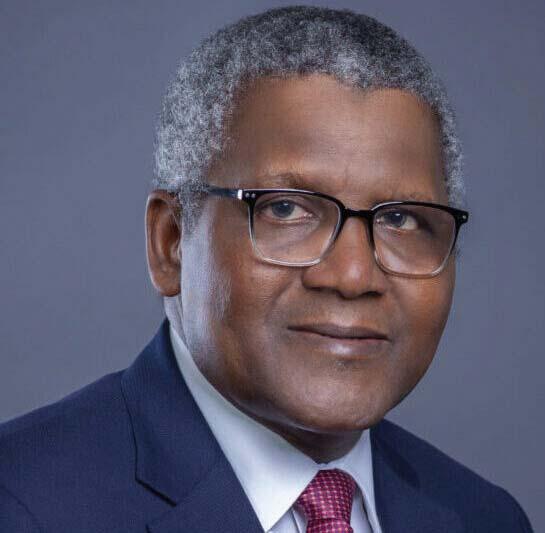
available, why we cannot transport cement by rail, what can be done on the matter of foreign exchange components in the cement production sector, tax harmonization, General insecurity, and undue bureaucratic interference to complex issues of market forces. Any solution that does not address these is, at best, jaundiced and unsustainable. It is myopic to think that the government will ignore the significant external and internal intervening variables underpinning the excessive hike in the price of cement, whip the industry to an agreeable price, and assume the problem has been solved.
All factors considered, because of the socio-
economic impact of cement, the government needed to diagnose the challenge correctly, consult widely, and develop a sustainable policy solution. The impression I get is that this is not the case . The way we are going, many manufacturing concerns in the country will go down unless something is done about FX, operating environment, import duty, power and, most importantly, corruption. If cement prices continue to skyrocket, the cost of public infrastructure will escalate, many will lose their jobs, and the nation will be thrown into further economic depression. There may not be a straight answer to resolving the paradox of cement price hikes, but it is urgent and
today where there is more than a sprinkling of left-wingers is in academia and the human rights groups. Even Nigerian students are no longer left-wing these days. So, while we have few left wingers around, the Administration still has lots of opponents who support rival parties and candidates for regional, ethnic, religious or other reasons. That’s a lot of moles. The leak that drove the Nixon Administration over the edge was the Pentagon Papers leak by Daniel Elsberg in 1971, which revealed it had secretly been bombing the “Ho Chi Minh Trail” in Cambodia as part of the larger war in Vietnam. Soon afterwards, top Nixon staff created what they called White House Special Investigations Unit, also called “Room 16 Project” and sometimes, “The Plumbers.” Their work was to investigate and plug leaks. It was this team, led by David Young and the former CIA and FBI agents E. Howard Hunt and G. Gordon Liddy [they took their name styles from the legendary FBI director J. Edgar Hoover] that sought to plug leaks. Together with the four professional Cuban burglars hired from Florida, they later graduated into the team that burgled Democratic Party Chairman Larry O’Brien’s office in the Watergate Hotel Complex. They were caught, and the scandal ultimately brought down Richard Nixon.
I agree with the Presidency that it should try to stop embarrassing leaks of official documents. One way to do it is ensure that top officials stop generating embarrassing documents and relying on official secrecy to hide it. I agree with Oga Bayo Onanuga that there are moles buried deep in the public service. But in trying to uproot them, the Presidency should be mindful not to create a monster that will go the way of the White House Plumbers and precipitate an even bigger crisis.
imperative that a holistic approach to tackling the problem is followed.
It's important to note that addressing the high cost of cement requires collaboration between the government, industry players, and other stakeholders to implement sustainable and practical solutions. The government must work with the cement industry to develop policies that stabilise prices and prevent unnecessary fluctuations. It must enforce policies that ensure fair competition and avoid price gouging. It should encourage healthy competition in the cement industry by promoting new entrants with requisite capacity , preventing monopolies, and streamlining the regulatory processes to make it easier for new players to enter the market. It should invest in infrastructure development to improve transportation networks and reduce the cost of transporting raw materials and finished products. Put mildly, the government must create an external environment that is business-friendly.
The cement industry on the other hand must implement energy-efficient technologies to reduce operational costs and explore alternative and renewable energy sources to power manufacturing plants. They should invest in research and development to find innovative and cost-effective methods for cement production and explore new materials or processes that could be used as alternatives to traditional cement. They should encourage using local materials and resources to reduce dependence on imported inputs and support the development of a robust local supply chain for raw materials. They should desist from arbitrary increases in price just for the sake of maximising profit, especially given the concessions the government has given by protecting the industry from foreign competition.
Our housing and infrastructural needs are enormous. A country of over 200 million people needs cement to build houses for people and construct basic infrastructure. The high cost of cement can only exacerbate the paucity of delivering on these essentials. Therefore, all stakeholders must work collaboratively to ensure the availability of cement at affordable prices.
Femi Solaja
Nigeria’s lone team in continental campaign this term, Rivers United pulled a stunt yesterday in Angola, defeating hosts, Académica do Lobito 3-2 in a Group C CAF
Confederation Cup duel. The win now leaves Rivers United on same nine points as Tunisia’s Club Africain going
into the last Group C matches. Ghanaian team, Dreams FC lead the standing with 12 points. The Pride of Rivers need a massive win
in Port Harcourt to stand a chance of progressing into the next round because of Club Africain’s dead rubber clash with Academica do Lobito next week. Rivers United started their Sunday away game on a slow
note and had to come from behind. The hosts went ahead in the 37th minute via a penalty kick. But Rivers United levelled up in the 40th minute through Udom Edem Ekarette.
Four minutes later and just before
half time, Alex Oyowah put Rivers ahead through a penalty kick. Farouk Mohammed doubled the lead in the 48th minute. But the home side cut down their deficit when Fernando Camuege scored in the 68th mimute.
Liverpool captain Virgil van Dijk headed the winner deep into extra time as Jurgen Klopp’s massivelydepleted side beat Chelsea 1-0 to claim a record-extending 10th Carabao Cup.
The Dutch defender, who controversially had another header ruled out at the same end in the second half after VAR intervention, rose above Mykhailo Mudryk to nod in Kostas Tsimikas’ corner in the 118th minute.
It was no more than the Nether-
lands international, lifting his first trophy as Liverpool captain, deserved after a monumental performance in defence in a win which seemed against the odds for long periods.
Klopp became the third Liverpool manager to win the trophy more than once as his long goodbye to his departure at the end of the season began with the first of a potential four pieces of silverware.
But for opposite number Mauricio Pochettino his long wait for an English domestic trophy continues.
Victor Osimhen thought his 65th minute header was enough to seal all three points for Napoli at Cagliari but a Zito Luvumbo late added time equaliser ruined the party for new coach Francesco Calzona.
Defending champions Napoli remain ninth on the table on 37 points, while Cagliari stay second from bottom with 20 points.
After a scoreless first half, Osimhen who was on target for Napoli against Barcelona in the UEFA Champions League Last 16 Clash on Wednesday, found the net again with a header in the 65th minute which looked enough to take all three points before Luvumbo struck
at the death.
"I've been missing a goal for a long time, I scored in front of my fans, it's a huge happiness," Luvumbo told Dazn.
Francesco Calzona, who took over as Napoli manager from Walter Mazzarri on Monday, has now drawn his opening two games, after the midweek Champions League tie with Barcelona also finished 1-1.
Sunday's game never promised to be a goal-fest, with Napoli failing to score in their last five away games while Cagliari had scored 23 goals in 25 league games, and the first half offered little in the way of clear-cut chances.
OLYMPIC FOOTBALL TICKET
Head Coach Randy Waldrum and Captain Rasheedat Ajibade are confident Nigeria’s Super Falcons will overcome the challenge of Cameroon this afternoon in Abuja and reach the final round of the African qualifying series for this year’s Women’s Olympic Football Tournament in France.
Waldrum led his ladies to a scoreless draw in the first leg in Douala on Friday, with the Nigerians rueing a disallowed goal by Jennifer Echegini early in the second half. Both squads then joined the same flight from Douala into Abuja on Sunday morning.
“We played a good game in Douala and we are confident of our chances to get the ticket in Abuja,” observed Waldrum.
Ajibade, who scored the lone Nigeria goal that threw Cameroon’s Lionesses out of the Women Africa Cup of Nations in Morocco 19 months ago, and also netted two of the goals that eliminated Ethiopia in the second round of these qualifying series, says the Falcons have no fear of whatever the arch rivals can bring to the turf of the MKO Abiola National Stadium today.
“Our objective remains getting the Olympics ticket. Personally, I have never played at the Olympics and that is the case with an overwhelming majority of players in this team.
We are determined to take this
opportunity. We have another 90 minutes to make our claim to the final-round ticket and we are focused on a positive result.”
However, Coach Jean-Baptiste Bisseck is also confident of the ability of his Lionesses to turn the table against the nine-time African champions in Nigeria’s administrative capital.
“We will play on the Abuja field as if we are playing at home. Cameroon will not entertain any fear. The Lionesses are prepared to win and make progress.”
Both teams will compete on a clean slate on Monday eveninghaving battled to a barren ending in Douala, with the winner most likely to be up against reigning African champions South Africa for a place in Paris.
Nigeria’s Falcons featured at the Women’s Olympic Football Tournament in Australia in 2000, Greece in 2004 and China in 2008, but have not qualified since their outing in China 16 years ago. Cameroon’s only previous outing was at the London 2012 Olympics.
Banyana Banyana bounced Tanzania 3-0 in Dar es Salaam and should have a cruise at the Mbombela Stadium in Nelspruit.
For the Nigeria/Cameroon clash in Abuja, which kicks off at 4pm, CAF has appointed Namibian official Ndemugwanitha Twanyanyukwa as referee.

yesterday
As 14th Biennial Police Games, Oluyole 2024, kicks off in Ibadan
Kingsley Nwezeh in Abuja
The Inspector General of Police, Kayode Egbetokun, said at the weekend that the Nigeria Police Force will leverage on its sporting capabilities to improve on peace, unity, stability, and development of Nigeria.
The IG stated that the Nigeria Police Sports remains instrumental to producing champions representing the country nationally and
internationally in various sporting competitions.
The IG spoke at the opening of the 14th Biennial Police Games tagged "Oluyole 2024" at the Adamasingba Sports Centre in Ibadan.
The event was declared open by Governor of Oyo State, Engr. Seyi Makinde, who represented President Bola Tinubu as the special guest of honour.
Egbetokun emphasised the vital role of sports in fostering camarade-
rie, discipline, and mutual respect among officers and members of the public, noting that such competitions served as platforms for promoting teamwork, physical fitness, and healthy competition among officers from various commands and formations of the force.
Defending champion of the Nigeria Cricket Federation (NCF) Women’s T20 Invitational Tournament, Nigeria’s Senior Female team began their title defence with a 54-run win over Sierra Leonian Women’s team on Sunday, at the Tafawa Balewa cricket oval in Lagos.
Nigeria had elected to bat after winning the toss, and set a 137 run (for the loss of two wickets) hurdle for the Sierra Leonian side in their
innings. Favour Eseigbe, contributed 44 runs from 48 balls, while Peculiar Agboya and Esther Sandy left 33 and 30 balls apiece in the inning.
In the second inning, Ann-Marie Monica Kamara and Janet Kowa pulled in 22 and 21 runs respectively in a bid to chase the score rampart Nigerian side before eventually capitulating, with eight wickets down.
President of the Nigeria Cricket Federation, Uyi Akpata, said that
the event is part of the numerous avenues that the NCF has designed to promote the game, and it is pleasing to see rising international interest around the tournament.
“The Nigeria Cricket Federation Women T20 Invitational Tournament has been on the rise, and the quality of games have helped Nigeria gain prominence as we now rank 29th in the world, down from the 38th that we occupied as recently as 2021.”
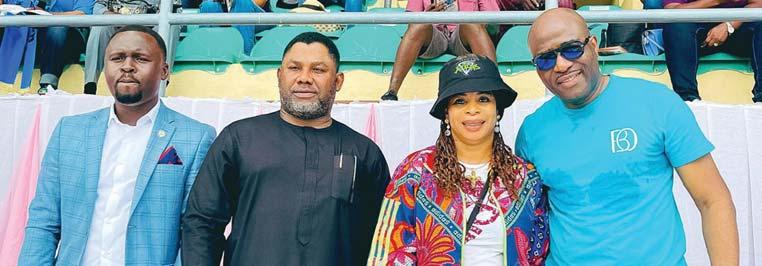
resolve of the Nigeria Police Force to promote national cohesion and solidarity through spirited participation in various sporting events to showcase the athletic prowess of officers while "reinforcing the values of professionalism, integrity, and service to the nation which are crucial to our collective safety and national development in Nigeria".
A statement issued by Force Headquarters in Abuja said "the IG while appreciating the governor and good people of Oyo State for their support in hosting the event, extended a warm invitation to the public to join in celebrating the spirit of sportsmanship and camaraderie during the 14th Biennial Police Games by uniting in cheering the sportsmen on.
BetKing, Nigeria's leading sports betting company, celebrated its 6th anniversary with a thrilling exhibition football match between KingMakers FC and BetKing Agents at the BetKing Mini Stadium. The match, symbolizing unity and competitiveness among staff and partners, was kicked off by BetKing's Managing Director and CEO, Gossy Ukanwoke in a ceremonial start.
Kingmakers FC started strong, scoring two awesome goals, but the Agents quickly tied the game before halftime.
In the second half, the Agents took the lead again. However, the Kingmakers didn't give up and fought back, tying the match at 3-3. The deadlock led to a tense penalty shootout, ultimately resulting in the Agents securing victory.





“IftheCBNwakesuptodayandsayswearegoingtointervenewith$500million,all thebureaudechangewillrunintothebushbecausenobodywillpatronisethem.And IhadtheBDCmansayingthatwewillensurethattheratewillcomedown,werethey the ones that ensured the rate went up in the first place? Market works when the supply is in excess of demand" -CEO,FinancialDerivativesCompanyLimited,Bismarck Rewane,faultsCBN'scrackdown on BDCs.

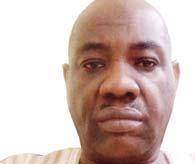
The biggest political scandal of the modern world, Watergate, which forced a US President to resign for the first and, so far, the only time in history, started from leaks. I thought of this matter at the weekend because right now, the Tinubu Presidency is plagued with leaks and is struggling to plug them. Did I say “plug” them? That was exactly what Richard Nixon’s Administration tried to do in the early 1970s and it ultimately led to Watergate, but first things first.
At the weekend, we had the issue of the leaked Qatar note verbale. President Tinubu is planning a visit to Qatar in early March, and a leaked document indicated that the Qataris had turned down a Nigerian proposal to hold a business forum on the sidelines of the presidential visit. Foreign Affairs Minister Yusuf Tuggar issued a statement confirming that Tinubu will indeed go to Qatar, as the document indicated. As to the business forum issue, the minister said he will not comment on leaked documents. Which created the impression in skeptical minds that the document is true.
Which indeed it is because on Saturday
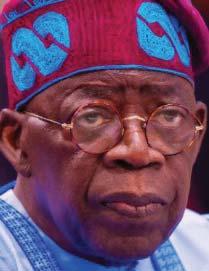
evening, Special Adviser to the President on Information and Strategy, Bayo Onanuga, issued a statement saying, “We are aware of
a leaked diplomatic correspondence between the Embassy of the State of Qatar in Abuja and our Ministry of Foreign Affairs regarding President Bola Ahmed Tinubu’s state visit to Qatar between 2 and 3 March, 2024. The leaked diplomatic paper by mischief makers about an investment forum is not in any way a snub on President Tinubu by the Qatari government. The Note Verbale is about a private sector-led Business and Investment Forum to be held on the margins of President Bola Tinubu’s State Visit.” In other words, the Qataris did turn down the proposed forum, for which they gave three reasons, but it was not a snub. The only problem I see there was that they addressed their letter to our Ministry of Foreign Affairs, not to the Nigerian Association of Chambers of Commerce, Industry, Mines and Agriculture (NACCIMA). We heard late Sunday that the Qataris backtracked and the forum will now hold.
Snub or not, the leaked Qatari letter is only the latest leaked document that has shaken the Presidency. If I remember right, the first such leak was of a September 2023 memo by State House permanent secretary, in which
the president approved $422,000 for his hotel reservation to attend the UN General Assembly meeting in New York, and another $84,000 for meals and transport. It was shocking that such a deep inside State House document leaked.
Two months later in early December, the media reported that Nigeria sent a large delegation of 1,400 to the United Nations Framework Convention on Climate Change [Cope 28] in Dubai. While that information was openly sourced, leaked papers soon followed about the composition of the delegation, which the government struggled to explain, including by publishing a statement that only about 400 were government-sponsored delegates.
Most damaging however was the leaked document in early January showing Minister of Humanitarian Affairs and Poverty Alleviation Betta Edu requesting Accountant General of the Federation to transfer N585 million into the personal account of a civil servant, said to be in charge of grant to vulnerable groups in four states. Although the Accountant General turned down the instruction, it turned out
Continued on page 62
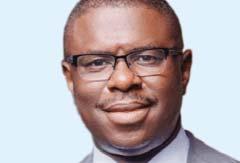
Cement and concrete are synonymous with strength ;the strength of the economy and infrastructural development. Cement is specifically an indicator of how we prioritise housing, roads, and other infrastructure projects that rely on it. When cement prices go up consistently, it reverberates across the country, sending cold chills down the spines of many. It means fewer people can afford homes, a fundamental human right. Although cement is just one ingredient in the construction industry, it has come to represent the industry itself, so the affordability of cement represents the affordability of houses and other concrete-based constructions. To millions of Nigerians who are nursing the hope of owning their own homes, an increase in the price of cement threatens that hope, and in a country where hope is the only viable anchor against many debilitating odds, there is outrage and panic among many. Besides the link of cement to our
collective psyche of home ownership, cement is also about the construction industry, public works,local manufacturing industry, and the employment it generates.
The current cement price hike is indicative of the economic degradation of Nigeria and the complexity therein. It showcases the interconnectivity of a nexus of factors that come together to have a stranglehold on our economy and how the government tackles the problem of excessive hikes in cement prices often is a case study of the government's dominant reactionary approach to solving sensitive social issues and a metaphor for wrong application of policy in our society. It also indicates how the government misdiagnoses problems and applies inappropriate treatment at the policy level.
In a mixed economy like ours, the government plays a crucial role in shaping the economy, and in some cases, it is the highest single stakeholder in some sectors of the economy. The government is a primary consumer in the construction industry because
of the many infrastructural projects it builds. Therefore, the government is a significant stakeholder in cement. Nevertheless, its primary role is to create an enabling environment for the market forces to play their role in determining the cement price while ensuring that the regulatory framework constrains the market arbitrariness. This is more preventive than reactionary. However, when the systems and structures put in place to guide the market fail, the government is expected to intervene in the interest of society. This intervention must aim to produce public value by diagnosing and solving problems appropriately. Appropriate diagnoses are pivotal to applying the correct measures that bring sustainable solutions. We miss the point when government officials act like elected kings, using maximum coercive powers to solve a problem that requires thinking and collaboration. Cement is a case in point.
The price of cement, using a 50kg bag as an indicator, between May 2023 and January 2024, a period of about six months, has increased from N4,250-N4,500 to N12,000-N13,000.
This is an increase of between 100% to 200%. Almost all construction industry segments reacted to this astronomical rise in price. There was a public uproar, and the government applied three knee-jerk reactions: the first was to threaten the cement producers to bring down prices or face dire consequences; the second was a threat to open the borders and allow massive importation of cement to flood the market and force the price down; and the third is another threat by the legislature to probe the reasons for the escalating cost of cement. This is indicative of the mindset of our government officials. But realistically, we cannot solve problems by threatening everybody.
The most critical underlying factor in the cement price hike albatross is that the government is caught between protectionism (protecting the local cement industry) and trade liberalisation to curtail prices. The politics of the recent cement price hike goes
Continued on page 62